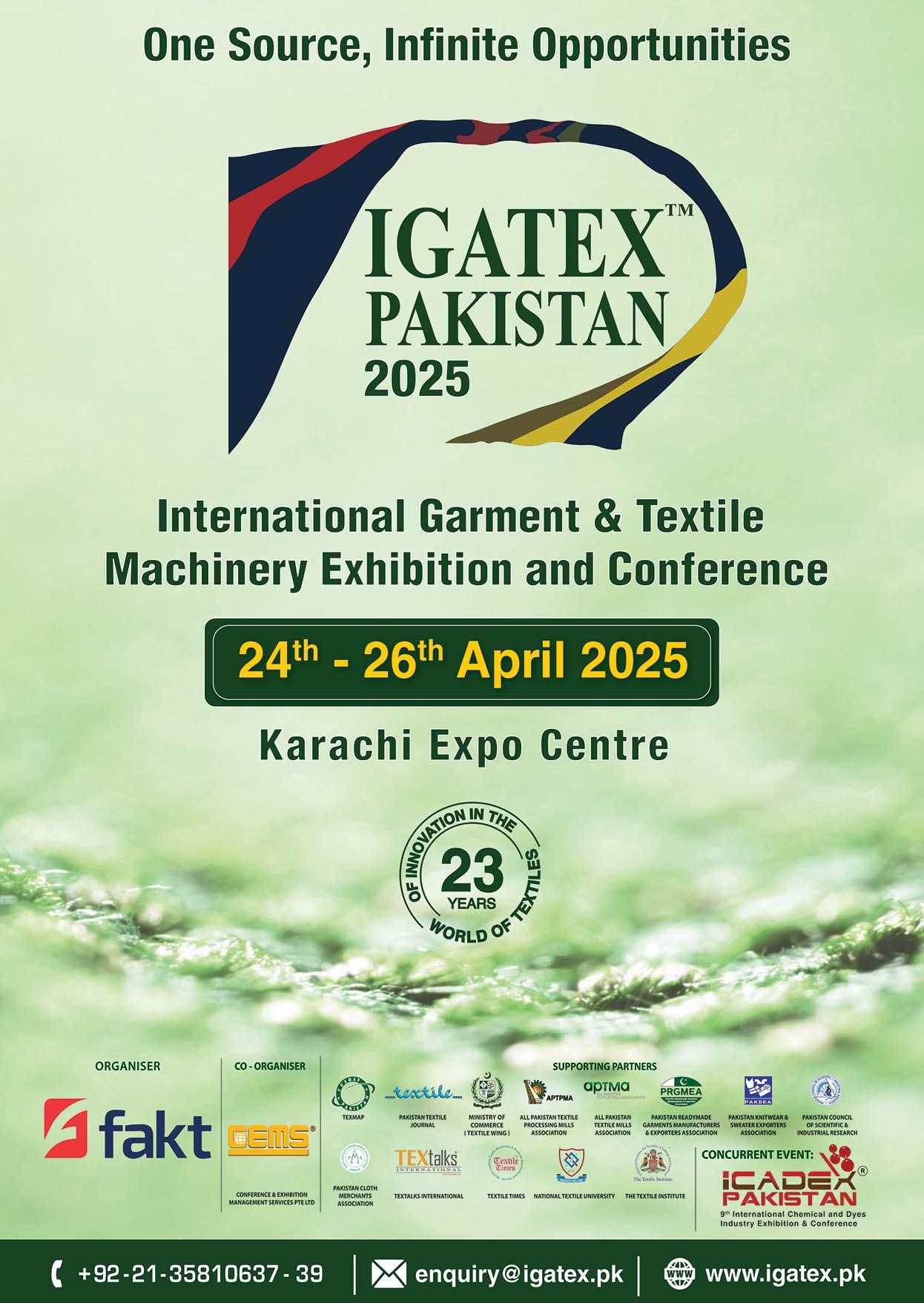









DPS World Pakistan 2024
Dates: August 16th to 18th 2024. Venue: Lahore Expo Centre.

63rd DORNBIRN-GFC Call For Papers
Dates: September 11th to 13th 2024.
Venue: Dornbirn Austria.

CAITME 2024
Dates: September 11th to 14th, 2024.
Venue: Tashkent, Uzbekistan.
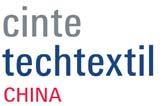
Techtextil China
International Trade Fair for Technical Textiles and Nonwovens
Dates: September 19th 21st, 2024.
Venue: Shanghai New International Expo Centre, Shanghai, China

HVACR Trends 2024
Dates: October 04th to 5th, 2024. Venue: Karachi Marriott Hotel

ITMA ASIA + CITME 2024
Dates: October 14th to 18th, 2024. Venue: NECC, Shanghai, China.

Dates: November 27th to 30th 2024.
Venue: Osaka, Japan.

2025, Frankfurt
Dates: January 14th, to 17th, 2025
Venue: Frankfurt am Main.

Hannover 2025
Dates: January 16th to 19th 2025.
Venue: Hannover, Germany.

Textile Asia 2025, Karachi
Dates: April 12th to 14th 2025. Venue: Expo Centre, Karachi.
Textile Asia 2024, Lahore
Dates: August 20th to 22nd 2024.
Venue: Lahore Expo Centre.

IGATEX Pakistan 2025, Karachi
Dates: April 24th to 26th 2025.
Venue: Expo Centre, Karachi.

iCADEX Pakistan 2025, Karachi
Dates: April 24th to 26th 2025. Venue: Expo Centre, Karachi.

FESPA 2025
Dates: May 06th to 09th 2025. Venue: Messe Berlin in Germany.

DOMOTEX asiaCHINAFLOOR 2025
Dates: May 26th to 28th 2025.
Venue: NECC, Shanghai, China.

ITMA ASIA + CITME, Singapore 2025
Dates: October 28th to 31st, 2025. Venue: Expo Centre Singapore.

Techtextil 2026
Dates: April 21st to 24th, 2026
Venue: Frankfurt, Germany.

Index 2026
Dates: April 21st to 24th, 2026. Venue: Palexpo, Geneva, Switzerland.
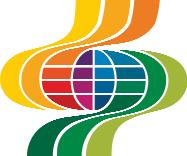
ITMA 2027
Dates: September 16th to 22nd, 2027. Venue: Hanover, Germany.
PAKISTAN TEXTILE JOURNAL - August 2024
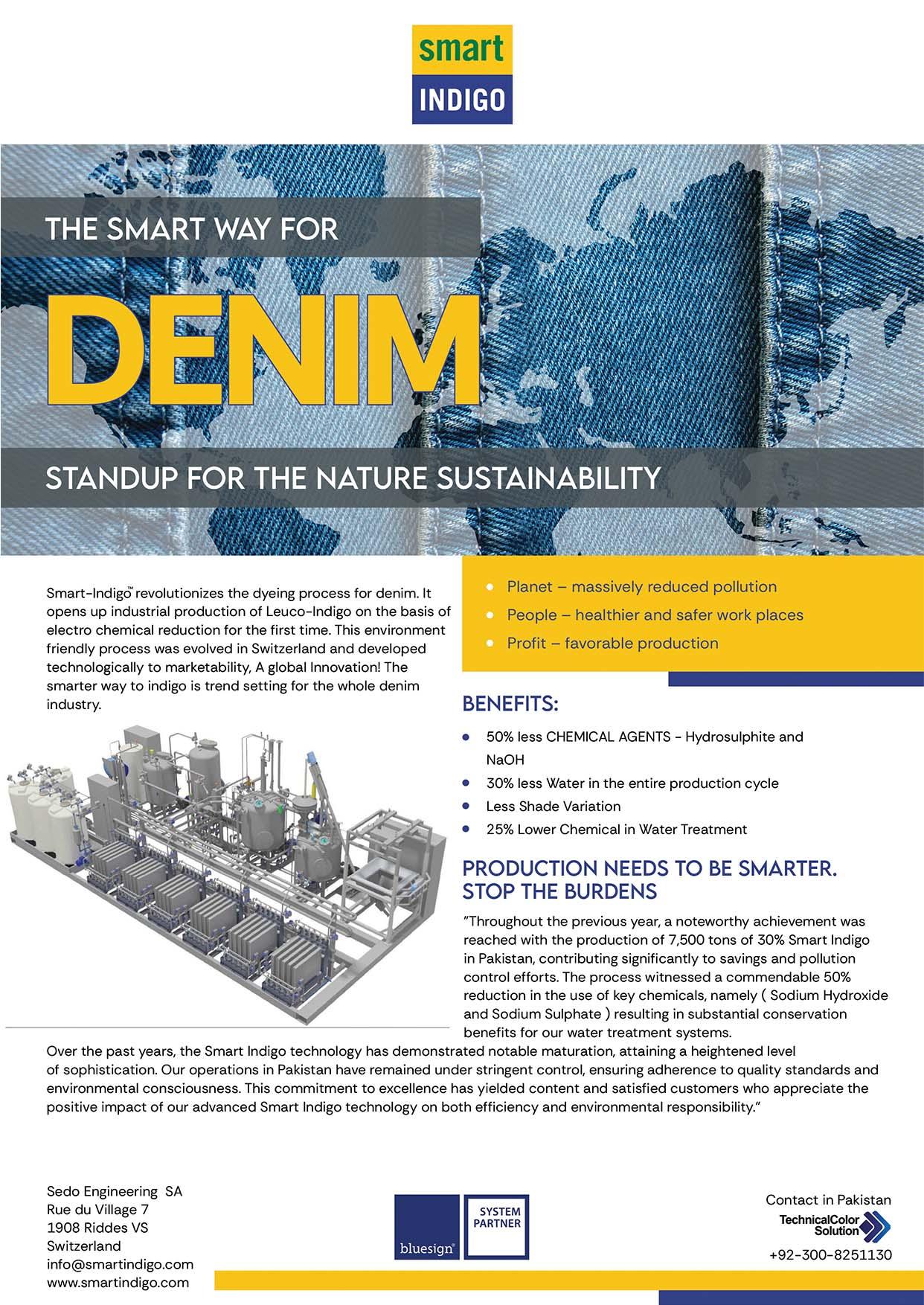



Founded in 1951 by Mazhar Yusuf (1924-2009)
Publisher Nadeem Mazhar
Editor in Chief Amina Baqai
Associate Editor
Nimrah Nadeem
Production Manager Mazhar Ali
Layout & Design
Noor M. Jaan
Website / Social Media
Minhaj Ali
Hony-Editorial Board
Dr. Hafizur Rehman Sheikh Ph.D (UK) F.T.I. (UK)
Syed Mahfooz Qutab
C.TEX, F.T.I (U.K), B.Sc. Fellow I.C.T.T Atlanta, GA; (USA)
Dr. Zubair Bandukda PhD (Textiles), CText ATI
Editorial & Advertising Office
B-4, 2nd Floor, 64/21, M.A.C.H, Miran M. Shah Road, Karachi - Pakistan
Tel: +92-21-34311674-5
Fax: +92-21-34533616
Email: info@ptj.com.pk URL: http://www.ptj.com.pk
PTJ Europe Ltd.
Registered Office:
Dairy House, Money Row Green, Holyport, Maidenhead, Berkshire, SL6 2ND, United Kingdom.
Registered no. 09141989
Tel: +44 792 2228 721
Available on Gale and Factiva affiliated internat ional databases through Asianet Pakistan
Printed at: Color Plus Korangi, Karachi.
Published by Nadeem Mazhar from D-16, K.D.A. Scheme No.1. Karachi.


















Mahlo to present cutting-edge straightening and process control technologies at Febratex .
Luxembourg-EIB Climate Finance Platform supports BlueOrchard’s climate insurance equity fund with the backing of the government of Luxembourg
.20 eVent Fabrics Partners with Formidable Media for Strategic Communications and Brand Elevation Services
Sapphire Mills to leverage Life Cycle Assessments and digital
S&P Global Inc. joins ITMF as
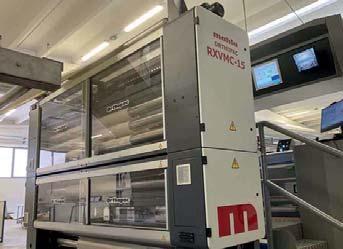

Ground-breaking ceremony for new container cleaning and recycling plant in Dusslingen
CHT Germany raises container management to a sustainable level and increases the use of reusable packaging ARCHROMA and VIVID CLM TEAM up to advance color matching for textile printing with the industry’s largest color library
Leadership transition at Loepfe
Markus Kleindorp; New CEO of Loepfe
Brückner, Groz-Beckert, Karl Mayer and Thies to hold joint warp knitting symposium in Brazil
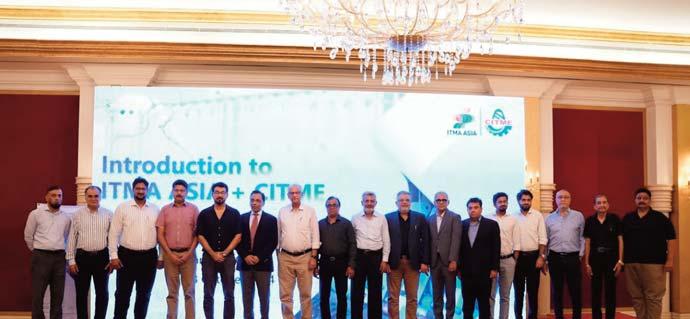
Karachi to host landmark ASHRAE RAL CRC 2024 and 4th HVACR Trends Expo . . .31
Heimtextil 2025: Carpets & Rugs is booming – and makes Frankfurt an annual fixed point for the global carpet industry
Functional natural materials in high demand: real all-rounders for the industry in focus at Techtextil 2026
ITMA ASIA + CITME 2024: Road shows conducted in Pakistan
Road shows were concluded successfully in Pakistan’s economic and cultural hubs: Lahore and Karachi, respectively on, 23th–26th July 2024.
Rieter wins major follow-up order from DIW
Carhartt Inc. joins U.S. Cotton Trust Protocol as part of its strategy to source more responsibly grown cotton
Discover Saurer's innovations at Febratex 2024
Trützschler’s TC 30i: Convincing customers with strong
The Potential of China-Pakistan Cooperation in the Textile Sector.
by Prof. Engr. Zamir Ahmed Awan, Founding Chair GSRRA, Sinologist, Diplomat, Editor, Analyst, Consultant, Advisor, and Non-Resident Fellow of CCG.
CHTC Fong’s International Co.,Ltd. Allwin Plus high temperature package dyeing machine
RIFA Textile Machinery revolutionizes fabric production with superior technology .52
China Texmatech Co., Ltd: World class textile engineering solution

Mayer & Cie.’s kniting solutions at ITM
Picanol showcased ultimax rapier weaving machine at ITM, a valuable alternative for airjet weavers
Saurer showcased new machines and technology at ITM 2024
Stäubli’s SAFIR PRO S67 captured visitors’ attention during ITM 2024
Trützschler ended ITM 2024 with new partnerships
Glimpses of ITM 2024
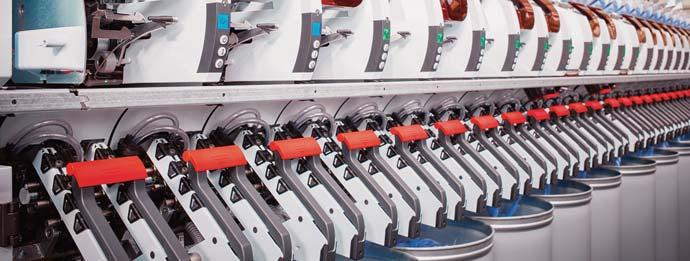
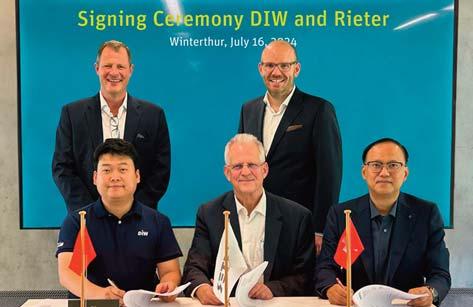
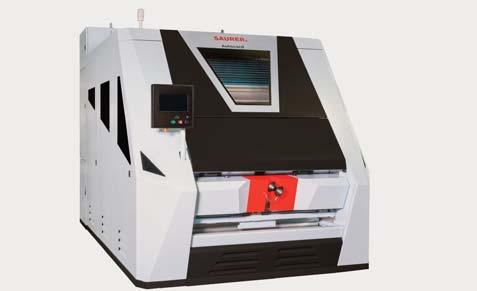
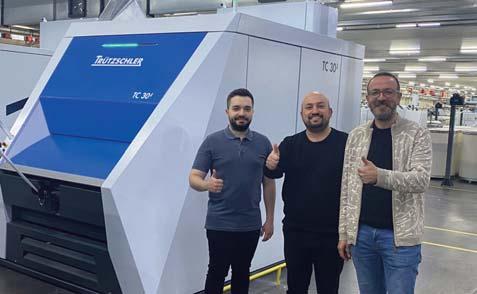
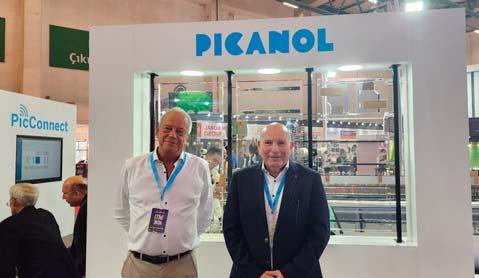
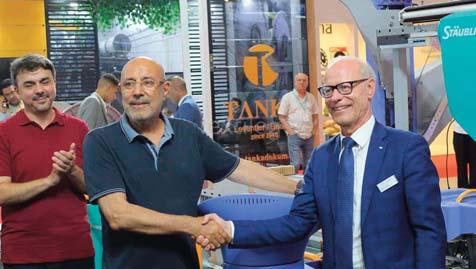
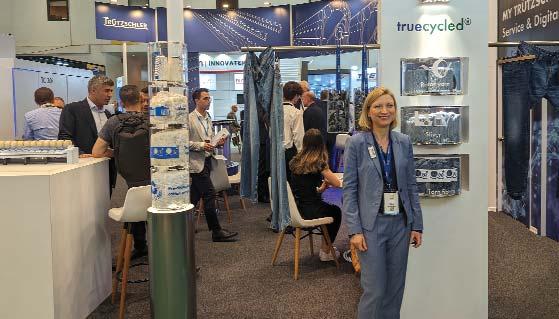
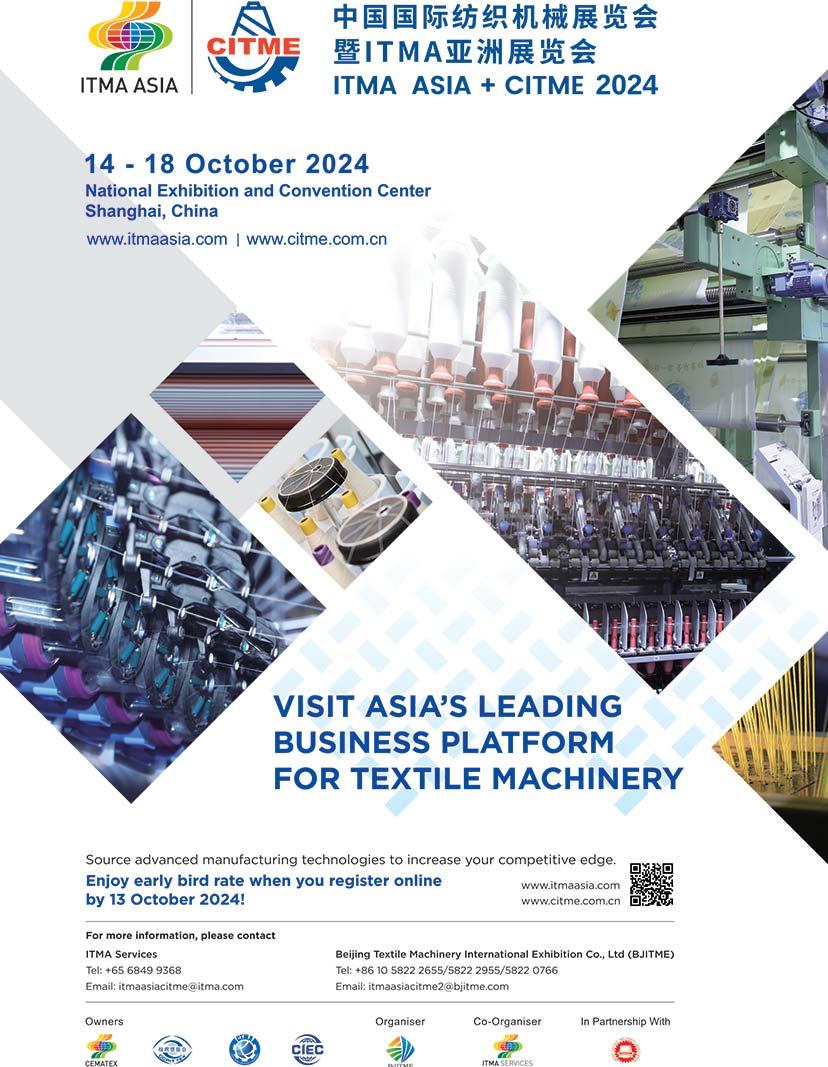
China’s textile and garment sector showed resilience with a 1.1% growth in exports, totaling $186.25 billion from January to July 2024. Textile exports rose by 3.7%, reaching $88.54 billion, while garment exports saw a slight decline of 1.2%. Despite challenges such as inflation, geopolitical tensions, and reduced demand from key markets, China’s textile sector continues to play a critical role in the global supply chain, highlighting its economic importance.
The China-Pakistan Economic Corridor (CPEC) has strengthened the economic partnership between the two nations, with textiles emerging as a key area for collaboration. Pakistan’s textile industry, which contributes 8.5% to its GDP and employs over 15 million people, remains a cornerstone of the country’s economy. However, to stay competitive, Pakistan needs to modernize its textile sector and expand its market reach. China, as the world’s largest textile producer, is well-placed to assist Pakistan in this process by offering technology transfer, advanced machinery, and training.
Chinese investment in Pakistan’s textile sector is also expected to rise, especially through the development of special economic zones (SEZs) under CPEC. These zones could attract Chinese textile companies, creating jobs and boosting Pakistan’s export capacity. Strengthened trade ties between the two countries, where Pakistan imports textile machinery and exports cotton yarn and fabrics, could further enhance economic collaboration.
Joint research and development initiatives between China and Pakistan could lead to innovations in sustainable textiles, product diversification, and improved production methods. Additionally, China’s vast domestic market offers Pakistan the chance to diversify its exports and access new markets, reducing its reliance on traditional buyers.
The upcoming ITMA ASIA + CITME 2024 exhibition in Shanghai provides a critical platform for Pakistani textile companies to explore new business opportunities, discover advanced textile machinery, and form international partnerships. Such events are essential for Pakistan’s textile sector to stay competitive globally.
The China-Pakistan partnership in textiles offers significant potential for both countries. By leveraging China’s technological expertise and Pakistan’s rich natural resources, this collaboration can drive mutual growth, innovation, and sustainability in the textile industry, strengthening both nations’ positions in the global market.


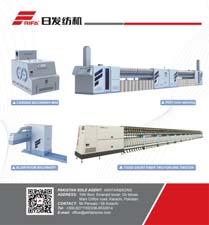
1
The government has announced plans to introduce a track and trace system in Pakistan’s cotton and ginning industry to combat tax evasion, as revealed by Rana Tanveer Hussain, the Minister for Industry and Production, National Food Security and Research. This decision was shared during a meeting with a delegation from the Pakistan Cotton Ginners Association on Friday.
2
The Pakistan Central Cotton Committee (PCCC) has announced plans to integrate digital tools and technologies into cotton farming to enhance per-acre yield and overall production potential. This initiative aims

to leverage modern technology to address agricultural challenges and improve efficiency in cotton cultivation.
3
The Punjab government has embarked on a new initiative to explore and implement strategies for improving cotton plantation across the province. This effort is aimed at addressing the challenges faced by the cotton industry and rejuvenating its production capacity.
4
On Thursday, the All Pakistan Textile Mills Association (APTMA) called on the government to significantly lower interest rates to 6 to 7% to better align with regional economies. The association
1
Amid escalating uncertainty within the nation across Bangladesh, the country's apparel and textile manufacturers have decided to suspend operations indefinitely. The Bangladesh Garment Manufacturers and Exporters Association (BGMEA), representing the readymade garment sector, issued a request on Sunday for all its members to shut down their production units until further notice due to the increasingly volatile situation that has resulted in numerous fatalities.
2
China’s textile exports reached a remarkable $42 billion in the first half of 2024, reaffirming the nation's continued dominance in the global textile
argues that reduced interest rates would create a more competitive environment for export-oriented industries, which are currently suffering under high rates that are stifling growth.
5
Earlier this month, Federal Minister for Industries, Production, and National Food Security, Rana Tanveer Hussain, reaffirmed the government's dedication to advancing the cotton industry. His remarks came during a meeting of the Pakistan Central Cotton Committee (PCCC) governing body, as detailed in a recent news release.
6
Suzhou, once renowned as China’s traditional textile hub,
is now presenting a wealth of opportunities for Pakistani businesses, according to China Economic Net (CEN) on Monday. Known historically as a center for textile production, Suzhou has evolved into a significant industrial and economic hub within China. This transformation was highlighted during the recent Pakistan Investment and Trade Conference, which was organized by the Consulate General of Pakistan in Shanghai, alongside local authorities and enterprises in Suzhou last Thursday. The event showcased Suzhou’s potential for fostering Pakistan-China collaborations across various sectors.

market. Fabric exports played a significant role, contributing to 80% of the total export value, which underscores China's crucial role in supplying textiles to international markets despite facing numerous challenges.
3Germany's exports dropped by 3.4% month-over-month in June, reflecting ongoing difficulties in the global trade environment. This downturn has also led to a reduction in Germany’s trade surplus, raising concerns about the country's economic stability. According to the Federal Statistical Office, the value of German exports saw a substantial decline, affecting multiple sectors. This decrease is attributed to
weakening demand in key international markets, persistent supply chain disruptions, and geopolitical uncertainties that continue to strain global trade.
4
The future of India’s textile industry is marred by significant challenges, despite government efforts and attempts to embrace innovation. The sector, which has traditionally been a cornerstone of employment and economic growth, now faces a series of obstacles that could hinder its potential. India's textile industry has been struggling with a troubling decline. From 2018 to 2023, the industry saw a significant drop of 11.69%, with revenues falling from $16.24 bil-

lion to $14.34 billion. This downturn reflects deeper issues within the sector, which has been unable to capitalize on its previously robust production base, including natural fibers such as cotton, jute, silk, and wool, as well as synthetic fibers like polyester and nylon.
5
The Indonesian textile industry is grappling with a significant crisis due to the recent release of 26,000 containers filled with illicit imports that had been languishing at the port, according to the Indonesian Filament Fibre & Yarn Producers Association (APSyFI). This influx has led to widespread job losses and ongoing factory closures.
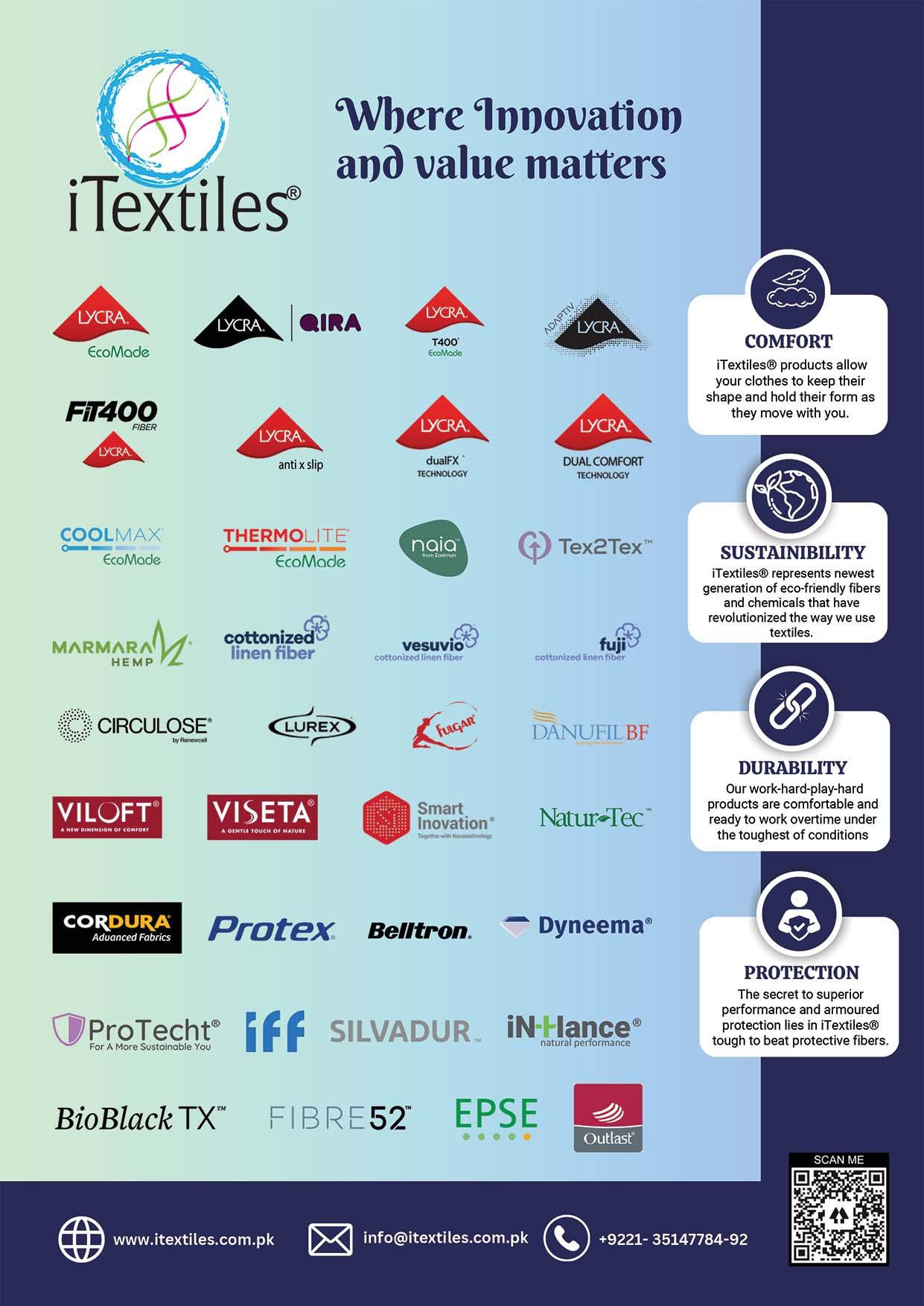
The government has announced plans to introduce a track and trace system in Pakistan’s cotton and ginning industry to combat tax evasion, as revealed by Rana Tanveer Hussain, the Minister for Industry and Production, National Food Security and Research. This decision was shared during a meeting with a delegation from the Pakistan Cotton Ginners Association on Friday.

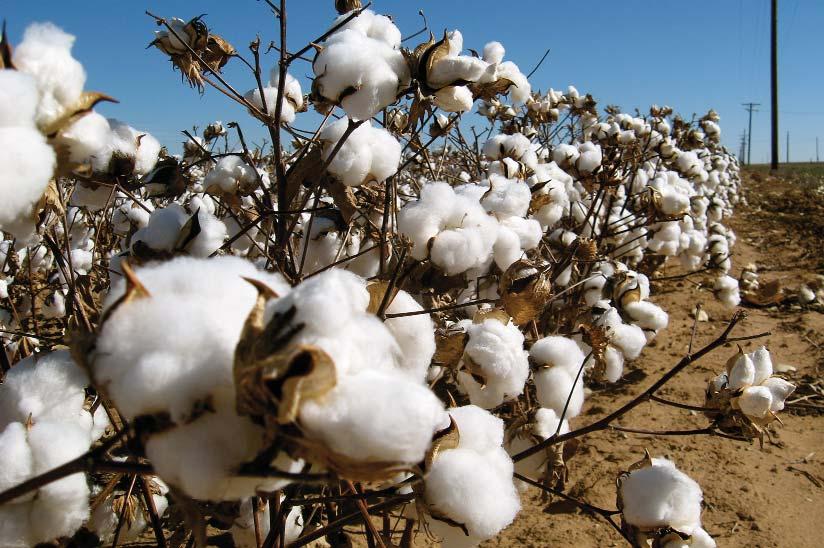
Minister Hussain shared the vital role of the cotton industry in the rural economy, noting its potential to provide employment opportunities for a significant portion of the skilled and semiskilled workforce. He explained that the new track and trace system will be applied to locally produced cotton bales to prevent tax evasion, thus safeguarding local farming communities and the industrial sector. The initiative aims to enhance transparency and accountability within the industry, potentially boosting government revenues by curbing illegal trade practices.
In addition, Hussain highlighted that the enforcement of the Cotton Control Act (CCA) will be carried out in collaboration with provincial governments. He assured the delegation that their concerns regarding the new taxation measures on seed cotton and
cottonseed cake would be reviewed. The minister committed to discussing these issues further with the Finance Division and the Federal Board of Revenue to address the challenges faced by the local ginning industry.
Representatives from the Cotton Ginners Association raised concerns about the heavy taxation on cotton products, which they believe is impacting the production capacity of the cotton ginning industry. They called for a rationalization of taxes on these commodities to benefit the local industrial sector and promote increased cotton crop output.
The delegation argued that rationalizing sales tax would improve tax compliance and help reduce tax evasion. They noted that over 8.4 million cotton bales were produced last season and expressed optimism that, with supportive government policies, production could
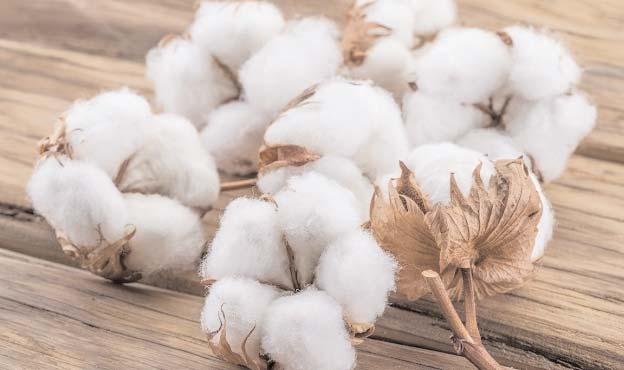
rise to 20 million bales. They also suggested that the government should consider providing subsidies and other incentives to boost production and encourage investment in modern ginning technologies.
The Pakistan Central Cotton Committee (PCCC) has announced plans to integrate digital tools and technologies into cotton farming to enhance per-acre yield and overall production potential. This initiative aims to leverage modern technology to address agricultural challenges and improve efficiency in cotton cultivation.

Dr. Yusuf Zafar, Vice President of PCCC, emphasized the transformative impact of digital technology on crop management. He noted that advancements such as digital tools in cotton sowing have proven highly beneficial, significantly boosting production outcomes. According to Dr. Zafar, modern technology has revolutionized farming practices, making it easier for farmers to achieve better results from their crops.
During a recent meeting, Dr. Zafar discussed digital agriculture technologies with Prof. Dr. Ishtiaq Rajwana, Vice Chancellor of Muhammad Nawaz Sharif
Agricultural University Multan. The discussion covered various digital innovations including tools, sensors, drones, and artificial intelligence. Dr. Zafar highlighted that the Digital Agriculture Alliance would provide farmers with advanced technology and valuable insights, expected to drive production growth and contribute to the stability of the national economy. He stressed the importance of collaborative partnerships and knowledge exchange between the PCCC and Nawaz Sharif Agricultural University, particularly for advancing cotton research and development.
Prof. Dr. Rajwana supported this view, pointing out that ongoing collaboration between the institutions and the adoption of advanced technologies are crucial for advancing and stabilizing the country’s agriculture sector. He explained that digital technologies such as soil analysis and crop monitoring systems enable farmers to tailor their practices to specific field conditions through precision agriculture. Prof. Rajwana also highlighted the use of automated devices like Smart Siphons and Leaf Temperature Sensors, which provide real-time data on soil moisture and plant water stress, further aiding in efficient cotton production.
The Punjab government has embarked on a new initiative to explore and implement strategies for improving cotton plantation across the province. This effort is aimed at addressing the challenges faced by the cotton industry and rejuvenating its production capacity.
During a recent conference on cotton research and development held at Agriculture House, Provincial Minister of Agriculture Syed Ashiq Hussain Kirmani emphasized that Punjab Chief Minister Maryam Nawaz is committed to reforming the research and development system within agriculture. Kirmani highlighted that various measures are being undertaken to modernize agricultural research to meet contemporary needs.

Syed Ashiq Hussain Kirmani; Punjab Agriculture Minister
He pointed out that the scarcity of quality seeds has led many farmers to abandon cotton cultivation, which is why cotton farming is predominantly concentrated in South Punjab. To revive cotton production, both public and private sectors must collaborate effectively. Kirmani stressed that restoring the production of cotton, often referred to as "silver fiber," is crucial for the economic prosperity of the country.
The primary goal of the program is to leverage the expertise and experiences of both public and private sectors to produce high-quality cotton seeds. Kirmani emphasized the need for developing climate-smart cotton varieties with high productivity to address the current challenges in cotton farming.
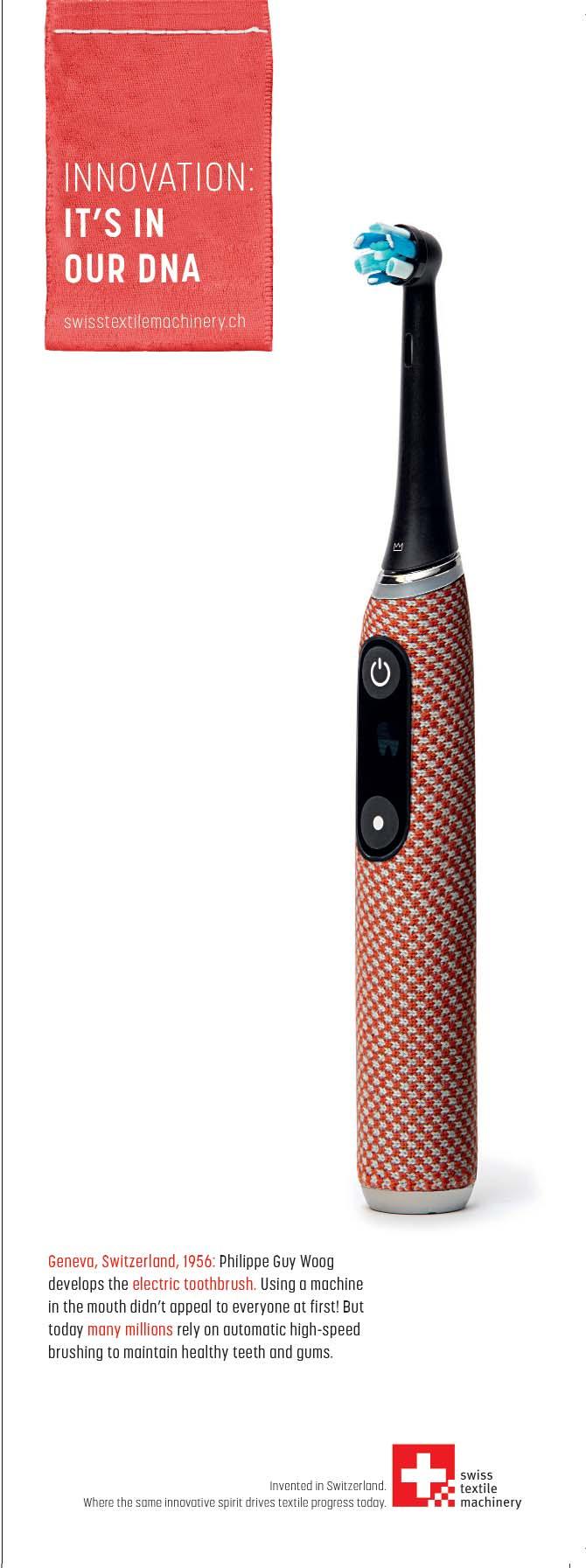
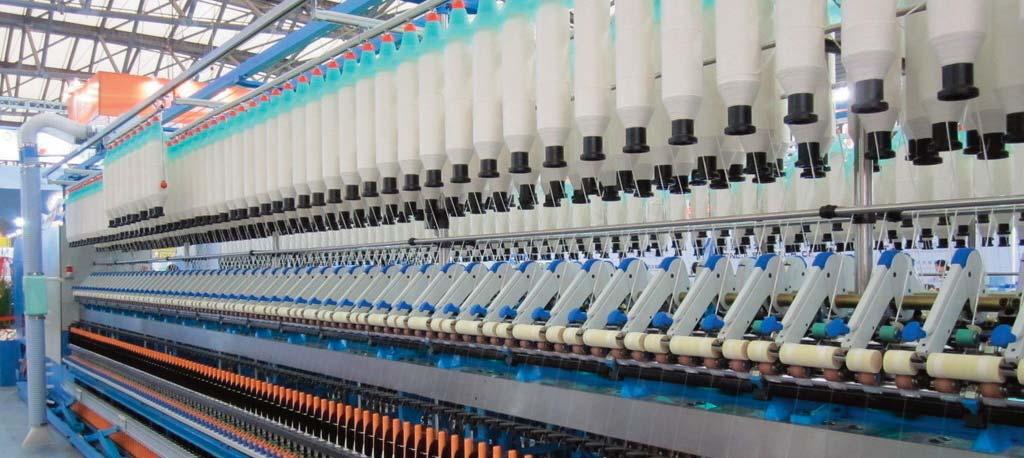
Punjab Agriculture Secretary Iftikhar Ali Sahu outlined that the cotton crop has faced numerous challenges over the past decade. He called for actionable proposals from both sectors to tackle these issues and stressed the importance of creating a comprehensive plan based on the conference’s discussions. He also mentioned that the technical opinions of all conference participants would be crucial in formulating this plan.
Sahu added that the federal government would be consulted to address issues at the national level. The conference saw participation from notable figures including South Punjab Agriculture Secretary Saqib Ali Attil, Dr. M. Anjum Ali, former caretaker federal minister Kausar Abdullah Malik, DG Agriculture Extension Chaudhry Abdul Hameed, Javed Salim Qureshi, Dr. Khalid Hameed, Asif Majeed, Saad Akbar Khan, Syed Hasan Raza, Dr. Sagheer Ahmed, and other government officials and private sector representatives.
On Thursday, the All Pakistan Textile Mills Association (APTMA) called on the government to significantly lower interest rates to 6 to 7% to better align with regional economies. The association argues that reduced interest rates would create a more competitive environment for export-oriented industries, which are currently suffering under high rates that are stifling growth.

During a press conference, APTMA South Zone Chairman Zahid Mazhar highlighted the severe impact of high energy costs and steep interest rates on the textile sector. He revealed that over 30% of textile mills have shut down due to these financial pressures, and many others have reduced production by up to 50%.
Mazhar underscored the sector's critical role in the economy, contributing 60% of total exports and 12% to GDP. He expressed concern over the declining export figures, with textile exports falling from $19.33 billion in FY22 to $16.5 billion in FY23. This decline is particularly troubling given the government's ambitious target of $60 billion in textile exports over the next three years.
The APTMA Chairman attributed the rising production costs to the challenging business environment and called for an export-friendly policy framework. He cited Bangladesh as an example, where lower production costs have led to increased textile exports, contrasting this with Pakistan's higher production costs.
Mazhar noted that despite the State Bank of
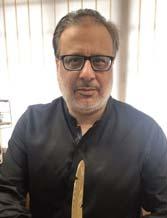
Pakistan's recent reductions in the interest rate, it remains high at 19.5%. He warned that if the current policy persists, exports will struggle to grow.
He also criticized the high cost of electricity, attributing it to Independent Power Producers (IPPs). He highlighted that capacity charges for IPPs have reached Rs2,000 billion, and despite a national electricity production capacity of 43,000 MW, only 23,000 MW is being supplied.
The APTMA has urged the government to re-evaluate its contracts with IPPs and expressed concern over the proposed plan to cut gas supply to captive power plants by January 2025. Mazhar argued that the national grid is not capable of meeting the electricity needs of the textile sector, which exacerbates the industry’s difficulties.
Earlier this month, Federal Minister for Industries, Production, and National Food Security, Rana Tanveer Hussain, reaffirmed the government's dedication to advancing the cotton industry. His remarks came during a meeting of the Pakistan Central Cotton Committee (PCCC) governing body, as detailed in a recent news release.
Minister Hussain underscored the vital role of cotton production in Pakistan’s economy, highlighting its significant impact on the textile industry. He
emphasized that a strong link exists between high cotton yields and the growth of the textile sector.
To support this, the government has introduced a Rs 10 per unit subsidy on electricity for the textile industry. This initiative is expected to provide considerable financial relief, easing some of the sector's ongoing challenges.
The minister also stressed the importance of prioritizing research and development. He assured that the government is committed to offering comprehensive support to farmers, ginners, and all stakeholders involved in the cotton industry.
Currently, Pakistan’s annual cotton production is at 8.4 million bales, with a target to increase this figure to 15 million bales by 2025. Hussain noted that modern agricultural practices and technology are key to enhancing yield per acre.
Additionally, recommendations for restructuring the PCCC, based on a report from the Food and Agriculture Organisation, are being considered. The next meeting to discuss these recommendations is scheduled for next week.
Suzhou, once renowned as China’s traditional textile hub, is now presenting a wealth of opportunities for Pakistani
businesses, according to China Economic Net (CEN) on Monday.
Known historically as a center for textile production, Suzhou has evolved into a significant industrial and economic hub within China. This
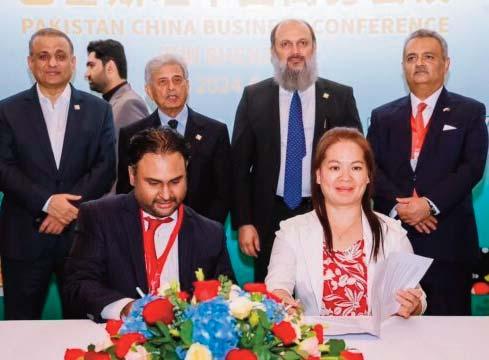
transformation was highlighted during the recent Pakistan Investment and Trade Conference, which was organized by the Consulate General of Pakistan in Shanghai, alongside local authorities and enterprises in Suzhou. The event showcased Suzhou’s potential for fostering Pakistan-China collaborations across various sectors.
Shehzad Ahmad Khan, Consul General of Pakistan in Shanghai, praised Suzhou as a city that exemplifies rapid urbanization and economic development. He noted, “Suzhou, a historic gem located near Shanghai, has emerged as a beacon of modern development and international collaboration. My first impression of Suzhou was remarkable—it is a testament to China’s swift economic progress and its pivotal role in manufacturing.” Khan highlighted Suzhou’s strategic importance due to its
robust flow of human resources between Shanghai and itself.
Recent data from the Suzhou Statistics Bureau revealed that the city’s economy performed exceptionally well in the first half of 2024. Suzhou reported a gross domestic product (GDP) of RMB 1.2059 trillion, marking a substantial 6.2% increase compared to the previous year. Additionally, the city’s manufacturing sector saw significant growth, with a total industrial output value of RMB 2.2253 trillion, reflecting a 5.5% year-on-year rise. Khan emphasized the strong potential for collaboration between Suzhou and Pakistani businesses, particularly in the textile industry, as well as in renewable energy, electric vehicles, and medical devices.
The Consul General underscored the potential for various forms of cooperation, including industry relocation, joint ventures, and foreign direct investment from China to Pakistan. He pointed out the historical ties between the two countries, rooted in their shared silk and textile production heritage. Additionally, he highlighted Pakistan’s growing role as a gateway to the European Union for exports and its substantial consumer market.
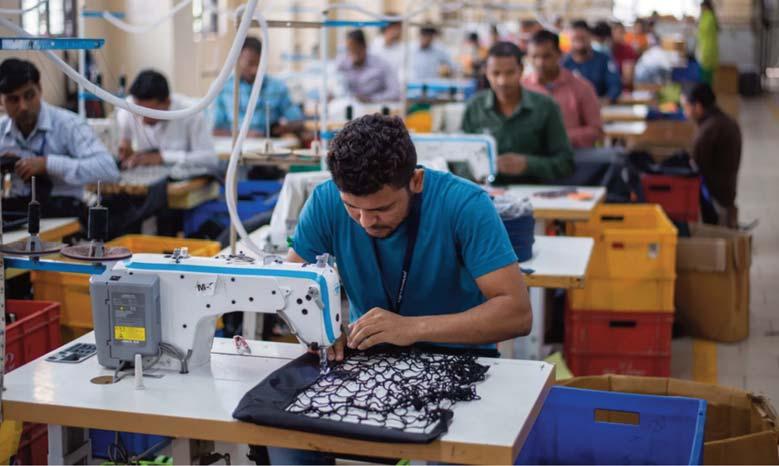
The conference concluded with B2B networking sessions and individual meetings, offering a valuable opportunity for businesses from both nations to explore potential partnerships and collaborative ventures.

Bangladesh apparel and textile manufacturers halt production indefinitely
Amid escalating uncertainty within the nation across Bangladesh, the country's apparel and textile manufacturers have decided to suspend operations indefinitely. The Bangladesh Garment Manufacturers and Exporters Association (BGMEA), representing the readymade garment sector, issued a request on Sunday for all its members to shut down their production units until further notice due to the increasingly volatile situation that has resulted in numerous fatalities.
Simultaneously, members of the Bangladesh Textile Mills Association (BTMA) have also agreed to halt production during the three-day general holiday that has been declared. The decision to close was reinforced by an incident where one of its member mills in Gazipur was set on fire.
In Narayanganj, production in most ready-made garment factories has been suspended as the unrest continues. Factory owners reported that workers initially started their shifts, but were provoked by external agitators to abandon their work and take to the streets. This led to several factories in Narayanganj BSCIC and Fatullah closing operations to protect their facilities.
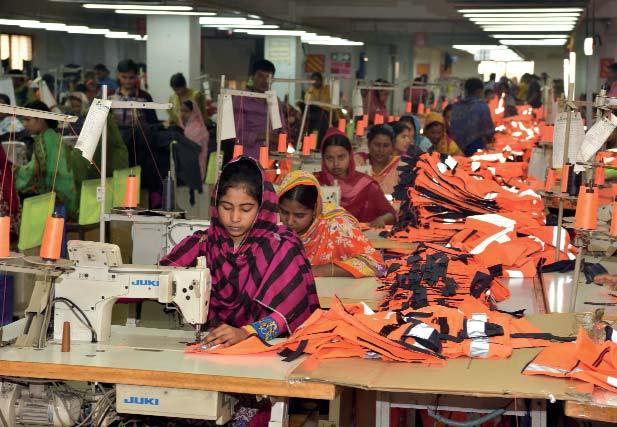
Fazle Shamim Ehsan, Vice President of the Bangladesh Knitwear Manufacturers and Exporters Association (BKMEA), confirmed that production was halted in various factories after workers were influenced to leave their posts.
Abdullah Hil Rakib, Vice President of BGMEA, reported that by 3:00 pm, workers in some Gazipur factories had left their workplaces, leading to a halt in production. He acknowledged the fatalities resulting from clashes between protesters, law enforcement, and ruling party members across the country.
Despite the challenges, Rakib mentioned that efforts would be made to continue operations, similar to previous instances
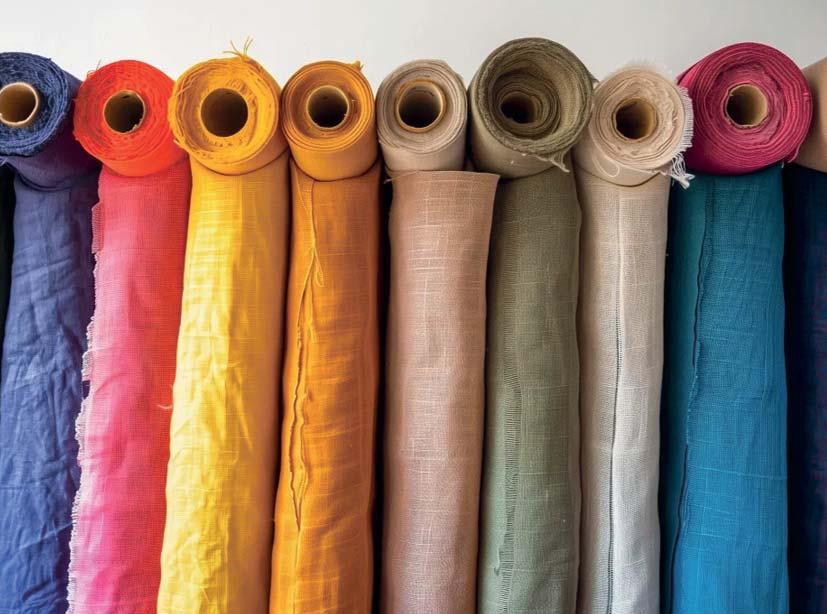
during holidays, by using workers' identity cards as curfew passes.
Rakib also noted that while most factories in Gazipur were still operational, BGMEA plans to seek a meeting with the government to request permission to continue production during the curfew and general holiday

Fabrics contributed 80% to China's textile exports of $42 billion in H1 2024
China’s textile exports reached a remarkable $42 billion in the first half of 2024, reaffirming the nation's continued dominance in the global textile market. Fabric exports played a significant role, contributing to 80% of the total export value, which underscores China's crucial role in supplying textiles to international markets despite facing numerous challenges.
The strong performance of the fabric export sector has been fueled by steady demand from major global markets such as Europe, the United States, and Southeast Asia. China’s ability to offer competitive pricing and consistently highquality products has helped solidify its standing as a leading exporter, particularly in the fabric segment.
However, the industry is encountering significant hurdles. Rising labor costs and stringent environmental regulations are
compelling manufacturers to innovate and adopt more sustainable practices. Moreover, ongoing geopolitical tensions and shifting trade policies are encouraging Chinese textile exporters to diversify their markets and seek new opportunities.
As the global textile landscape continues to shift, China’s textile industry remains a cornerstone of the global supply chain. Industry stakeholders are closely monitoring market trends and policy changes that could influence future export growth and the sustainability of this vital sector.

Tensions among Germans rise as exports show decline by 3.4% in June
Germany's exports dropped by 3.4% month-over-month in June, reflecting ongoing difficulties in the global trade environment. This downturn has also led to a reduction in Germany’s trade surplus, raising concerns about the country's economic stability.
According to the Federal Statistical Office, the value of German exports saw a substantial decline, affecting multiple sectors. This decrease is attributed to weakening demand in key international markets, persistent supply chain disruptions, and geopolitical uncertainties that continue to strain global trade.
While imports to Germany also experienced a slight decline, it was not sufficient to counterbalance the drop in exports. Consequently, the country’s trade surplus—the gap between exports and imports—has narrowed, indicating potential challenges ahead for Germany's export-driven economy.
Economic analysts are closely observing these developments, noting that Germany’s economic health is closely tied to its trade activities. If the decline in exports persists, it could hamper overall economic growth.
In response, the German government and industry leaders are considering strategies to mitigate the impact, such as diversifying export markets and bolstering domestic industries. However, the global
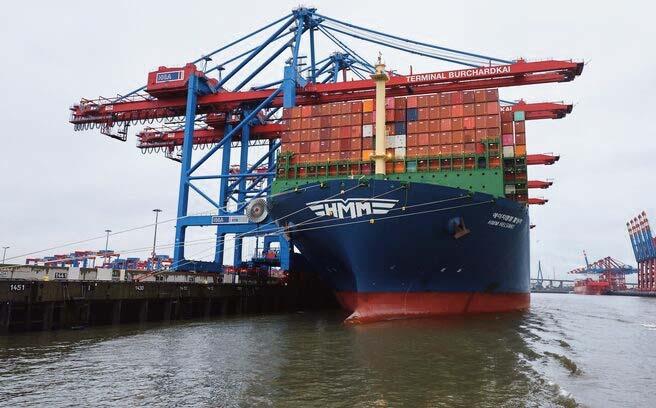
economic landscape remains uncertain, and the success of these measures will depend on various external factors.

The future of India’s textile industry is marred by significant challenges, despite government efforts and attempts to embrace innovation. The sector, which has traditionally been a cornerstone of employment and economic growth, now faces a series of obstacles that could hinder its potential.
India's textile industry has been struggling with a troubling decline. From 2018 to 2023, the industry saw a
significant drop of 11.69%, with revenues falling from $16.24 billion to $14.34 billion. This downturn reflects deeper issues within the sector, which has been unable to capitalize on its previously robust production base, including natural fibers such as cotton, jute, silk, and wool, as well as synthetic fibers like polyester and nylon.
The sector’s contribution to India’s GDP, which stands at 2.3%, and its role in exports and industrial production are under threat. Despite being a major contributor to the economy, the industry is grappling with persistent problems that overshadow its potential benefits.
The Indian government has announced plans to adjust its Production Linked Incentive (PLI) scheme, adding product lines like innerwear and t-shirts to the scheme. However, these measures have been criticized as insufficient to address the industry’s deep-rooted problems. The scheme's focus on labor-
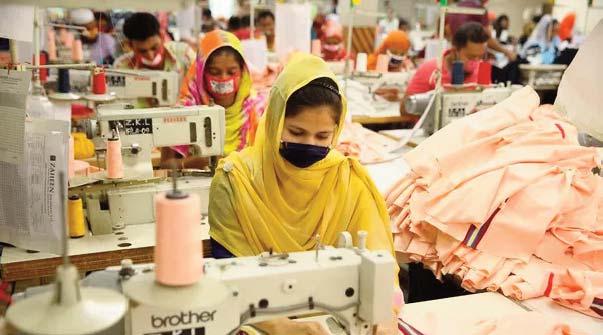
intensive sectors may not be enough to counteract the broader decline and market instability.
The anticipated growth in the textile market, projected at a 10% compound annual growth rate (CAGR) to reach US$ 350 billion by 2030, may not be realistic given the current challenges. India’s position as the world’s third-largest exporter of textiles is precarious, with exports projected to hit US$ 100 billion, yet the industry struggles with diminishing returns and increasing competition.
The textile sector, which employs around 45 million workers, including 3.5 million handloom workers, faces significant employment challenges. Despite its size, the industry’s inability to maintain growth is raising concerns about job security and the sustainability of employment levels.
India’s status as the world’s largest producer of cotton and its potential in the technical textile sector, including medical textiles and composites, are overshadowed by ongoing difficulties. The industry's efforts to embrace sustainability and innovation may not be enough to overcome the fundamental issues affecting its performance.
The challenges facing India's textile industry highlight broader issues within the sector, including infrastructure bottlenecks, environmental concerns, and skill gaps. These problems threaten to undermine the industry’s global standing and economic contribution, casting a shadow over its future prospects.
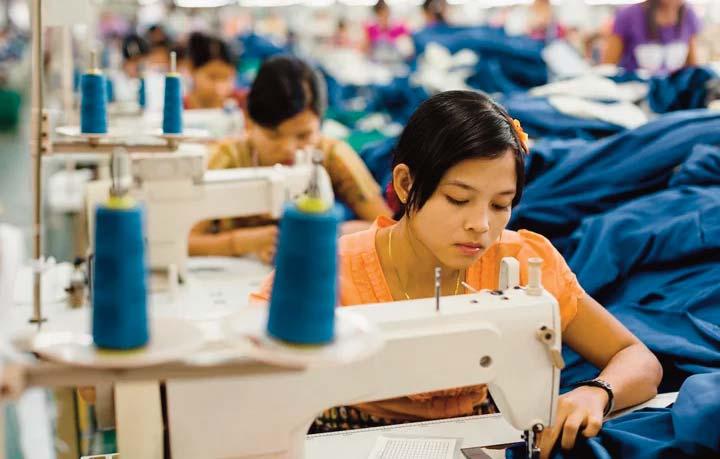

The Indonesian textile industry is grappling with a significant crisis due to the recent release of 26,000 containers filled with illicit imports that had been languishing at the port, according to the Indonesian Filament Fibre & Yarn Producers Association (APSyFI). This influx has led to widespread job losses and ongoing factory closures.
Farhan Aqil Syauqi, APSyFI's executive secretary, has criticized Coordinating Minister for Economic Affairs Airlangga Hartarto and Finance Minister Sri Mulyani for their role in the situation. "It appears that illegal imports are being effectively legitimized in our country," Syauqi remarked.
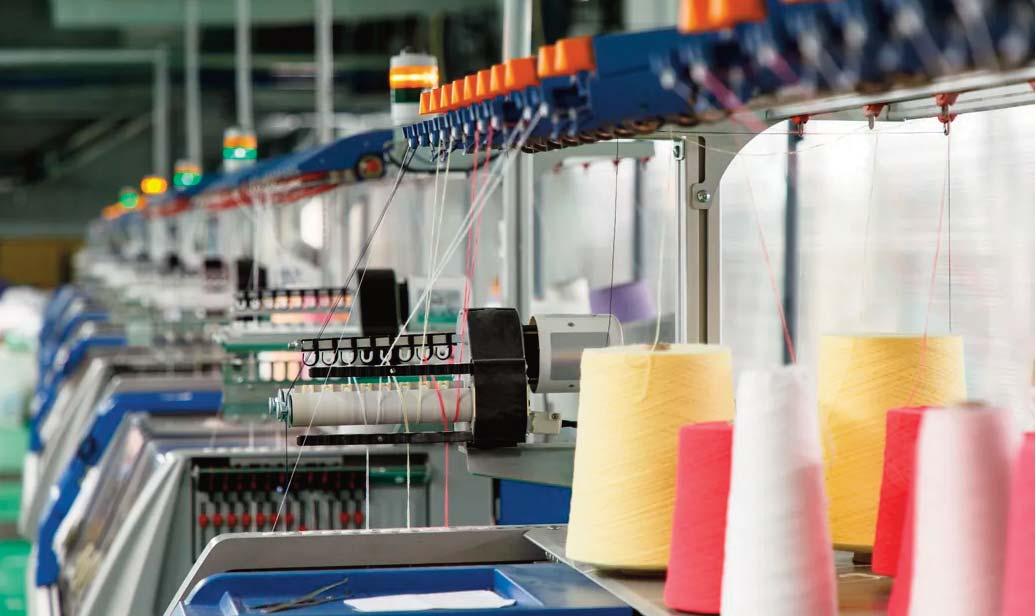
Syauqi also expressed concerns over the lack of public information regarding the containers' contents, alleging that the ministers in charge of trade and industry were also unaware of what was inside.
The association is demanding greater transparency and a clear explanation of the container contents. "In light of these troubling developments, APSyFI calls for decisive government action to protect the domestic textile industry from the flood of illegal imports," Syauqi urged.

In a recent meeting with the International Cotton Advisory Committee (ICAC), Nigeria’s Vice President announced a bold initiative aimed at rejuvenating the country’s textile industry, a sector that has historically played a crucial role in Nigeria's economy but has faced numerous challenges in recent years.
The Vice President outlined a comprehensive strategy for this revival, which includes upgrading existing textile facilities, investing in cutting-edge technologies, and introducing supportive government policies. These measures are intended to boost production efficiency, enhance competitiveness, and generate new employment opportunities within the sector.
The ICAC mission responded positively to Nigeria’s commitment, expressing confidence in the potential benefits for the local economy. They underscored the need for a united effort between the public and private sectors to ensure the long-term sustainability and growth of the textile industry.
This initiative is a key component of Nigeria’s broader economic diversification plan, which aims to lessen the country’s reliance on oil and stimulate growth in other sectors such as agriculture and manufacturing. By revitalizing the textile industry, Nigeria hopes to provide a stable source of income and job opportunities for many of its citizens.

Turkey’s apparel exports see 10% drop due to ongoing global economic challenges
In the first half of 2024, Turkey's apparel exports fell sharply by 10%, totaling $8.5 billion. This decline underscores the difficulties the Turkish apparel sector is facing in the midst of a global economic slowdown and shifting trade dynamics.
Several factors have driven this drop. A reduction in consumer spending worldwide has led to decreased demand for apparel in major markets. Additionally, heightened competition from other apparel-exporting nations and fluctuations in currency values have exacerbated the situation.
Despite these setbacks, Turkey's apparel industry remains a vital
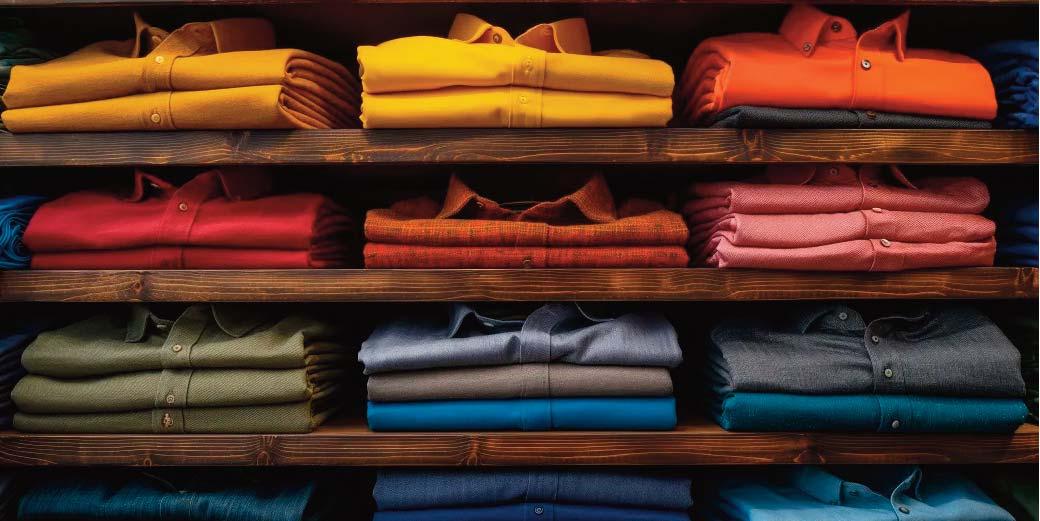
component of the national economy. Efforts are underway to counteract the negative impact of the export downturn. Industry players are actively seeking new market opportunities and working on improving production efficiencies to regain their competitive edge. Furthermore, the government is implementing supportive policies to bolster the sector’s resilience and encourage innovation.
The future performance of Turkey’s apparel exports will largely depend on the successful execution of these strategies and the evolution of global market conditions in the second half of 2024.

seizes opportunity as
Vietnam's apparel sector is experiencing a notable upsurge as Australia diversifies its sources of apparel imports away from China. This shift,
prompted by geopolitical tensions and trade disruptions, has created a significant opportunity for Vietnamese textile and garment producers.
Over the past year, Australia has reduced its apparel imports from China by 25%, falling from around $4.5 billion to $3.4 billion. This substantial reduction has opened a gap in the market that Vietnamese manufacturers are rapidly filling. During the same period, Vietnam’s apparel exports to Australia have surged by 40%, increasing from $1.2 billion to $1.68 billion.
Vietnamese textile companies are benefiting from a surge in orders from Australian retailers and brands. In response, these manufacturers are scaling up production, with several major firms planning to expand their production capacity by up to 30% in the coming year.
Australian retailers have welcomed this shift, appreciating the greater flexibility and reliability offered by Vietnamese suppliers. This trend reflects a broader global movement towards diversifying supply chains amid international uncertainties.
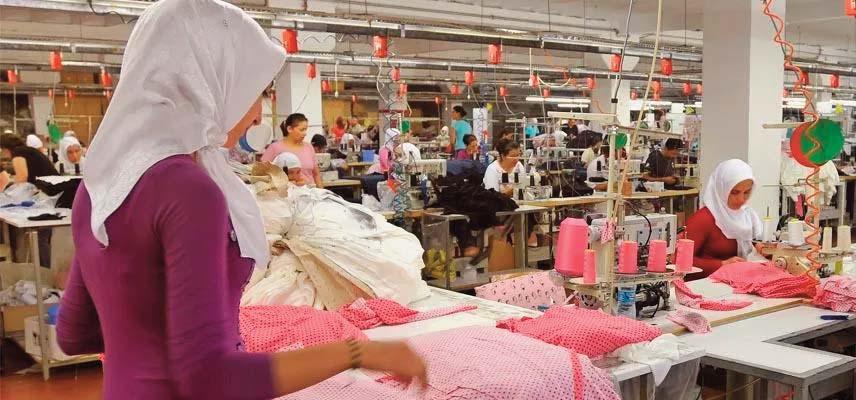
The realignment of trade patterns portrays the evolving dynamics of global commerce and highlights the rising significance of Southeast Asian economies. As Vietnam takes advantage of this opportunity, it strengthens its position as a key player in the global apparel market and a vital supplier for major international buyers.

Mahlo GmbH + Co. KG, a global leader in measuring, control, and automation systems for the textile and finishing industry, is pleased to announce its participation in the Febratex trade show from August 20 to 23, 2024. The event will take place in Blumenau, Brazil, a hub for textile and garment production.
Visitors can find Mahlo at Sector 01 / Space 20 - 22, where the company will present its latest advancements in straightening technology and process control. The booth will be jointly hosted by Mahlo’s sales agency MBR Textile and Christian Matthias, the head of Mahlo’s application department. They will be available to provide in-depth knowledge and demonstrations of Mahlo's state-ofthe-art solutions.
Mahlo’s technology addresses the critical needs of textile manufacturers, ensuring high-quality production with minimized distortion and optimized processes. The company’s automatic straightening system guarantees threadstraight fabric across various applications,
thanks to its modular design that can be tailored to individual production environments. Additionally, Mahlo offers several process control systems designed to optimize stenter frame operations by measuring and controlling parameters such as dwell time, thread density, and residual moisture. These systems help manufacturers improve textile quality, save raw materials, and reduce energy costs.
“Brazil hosts all industries needed for textile and garment production, from fiber to final product, making Mahlo’s diverse solutions highly relevant and essential for many manufacturers,” said Christian Matthias. “Our technologies help producers achieve their goals of high-quality goods and optimized processes that balance quality and economy.”
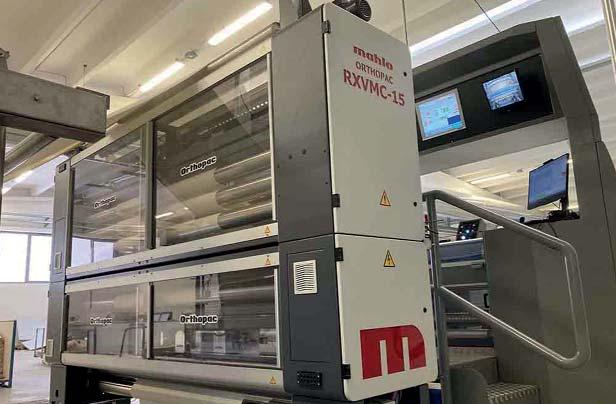


The Luxembourg-EIB Climate Finance Platform (LCFP) will provide EUR 5 million for impact investor BlueOrchard's innovative USD 100 million climate insurance fund, with the backing of the government of Luxembourg.
The LCFP seeks to catalyse private and public sector investment into highimpact companies in emerging markets involved in insuring climate change mitigation and adaptation projects, including projects addressing losses and damages caused by climate change.
Gilles Roth, Luxembourg Minister of Finance said: “Protecting communities from the social and economic impact of climate change is crucial and can be enhanced through climate insurance and better understanding of the local impact of extreme and more uncertain weather. Luxembourg is pleased to support the new BlueOrchard Insurance resilience fund as part of our impact focused
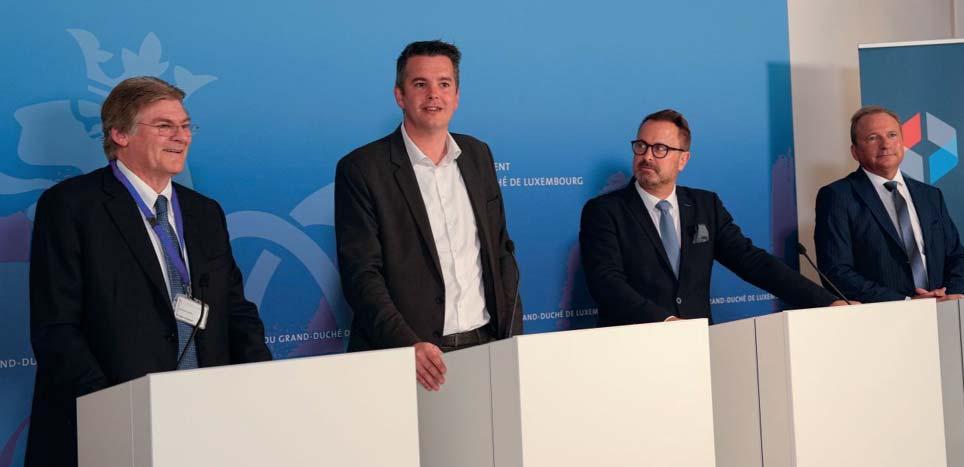
climate cooperation with the European Investment Bank. This cooperation demonstrates how private and public finance, climate expertise and climate insurance can mitigate the impact of climate change on vulnerable regions.”
Serge Wilmes, Luxembourg Minister of the Environment, Climate and Biodiversity said “Luxembourg is committed to climate action and is
pleased to support improved access to climate insurance to effectively protect vulnerable communities in developing countries from losses and damages caused by climate change, including extreme weather events and slow onset events. Unlocking private and public investment is critical to tackling the climate crisis in developing countries. The new support for the BlueOrchard
InsuResilience Fund II by the Luxembourg-EIB Climate Finance Platform will help vulnerable communities to be better prepared for climate risks and recover more quickly from climate disasters.”
The BlueOrchard managed InsuResilience Investment Fund Private Equity II (IIF II) will contribute to increasing access to affordable insurance and expanding the provision of climate insurance by providing equity investments in fast-growing companies that provide and support climate insurance, including insurance technology providers and specialist insurance companies and brokers.
New investment backed by the BlueOrchard managed InsuResilience Investment Fund Private Equity II will help to enhancing climate resilience in Asia, Africa, and Latin America by providing coverage against unavoidable climate related losses and damages in developing countries, including extreme weather events and slow onset events. By doing so it effectively offers an effective means to reduce financial risks and ensure rapid recovery following extreme weather events.
"The European Investment Bank is committed to fostering climate resilience around the world and our latest collaboration with BlueOrchard will help to address barriers holding back access to climate insurance in countries most impacted by climate change. Investing in adaptation and resilience is not only a necessity but a strategic imperative for the insurance industry in the face of climate change. The InsuResilience Investment Fund II will support equity investments in climate insurance technology, to empower insurers to better manage climate risks and better protect vulnerable communities across Asia, Africa, and Latin America from extreme weather events and climate change." said Ambroise Fayolle, Vice President.
"Our latest partnership with the EIB reflects our shared dedication to building resilience against the consequences of climate change and supporting the most vulnerable regions and households. The InsuResilience Investment Fund Private Equity II will drive high-impact equity investments to enable companies to

harness technological innovation and improve access to affordable climate insurance solutions." said Philipp Mueller, Chief Executive Officer of BlueOrchard.
Overcoming barriers to climate insurance in developing countries
Specialist investment is a critical component in providing insurers with the necessary climate data and expertise to encourage risk-reducing activities. The InsuResilience Investment Fund Private Equity II aims to enable more resilient communities by directly investing in expanding resilience insurance, covering agricultural and natural catastrophe risks.
Currently, many vulnerable communities and economic activities in climate change-affected countries remain uninsured, highlighting the need for greater industry involvement. The insurance industry is uniquely positioned to support and reward investment in climate adaptation and resilience, it therefore plays a pivotal role in transferring risk and providing rapid recovery funding for households, businesses, and communities after disasters.
Unlocking investment to improve climate monitoring technology will help insurance companies to better understand what can go wrong before a disaster occurs aided by insurance industry best practice expertise, analytics, and risk modelling. The fund will also help to drive sustainable development by speeding up recovery, encouraging financial inclusion,
and freeing up capital to invest in crucial areas from a family’s financial security to vital healthcare and education. Perhaps most importantly, we are helping to transfer risk away from families, businesses, and countries, through a variety of insurance products and tools.
Yet lack of insurance can tip hundreds of thousands of people into poverty as disasters strike given that many people living in developing countries have little or no means to recover and rebuild.
Additional equity capital provided by InsuResilience Investment Fund II will strengthen capabilities along the insurance value chain to better cover weather-related losses through improved access to climate data, expertise, and distribution, allowing stakeholders to manage climate risk effectively and on a commercial basis. This will facilitate improved coverage of losses and expand climate insurance to farmers and communities in Asia, Africa, and Latin America.
The cooperation between the EIB, BlueOrchard, and the Government of Luxembourg follows the successful deployment of the predecessor strategy, the InsuResilience Investment Fund.
To date, the predecessor fund has made 9 investments across emerging markets, reaching nearly 58 million beneficiaries in underserved and economically vulnerable communities to mitigate the effects of climate change (as of Q3 2023) with the objective to reach 70-110 million beneficiaries by 2025.
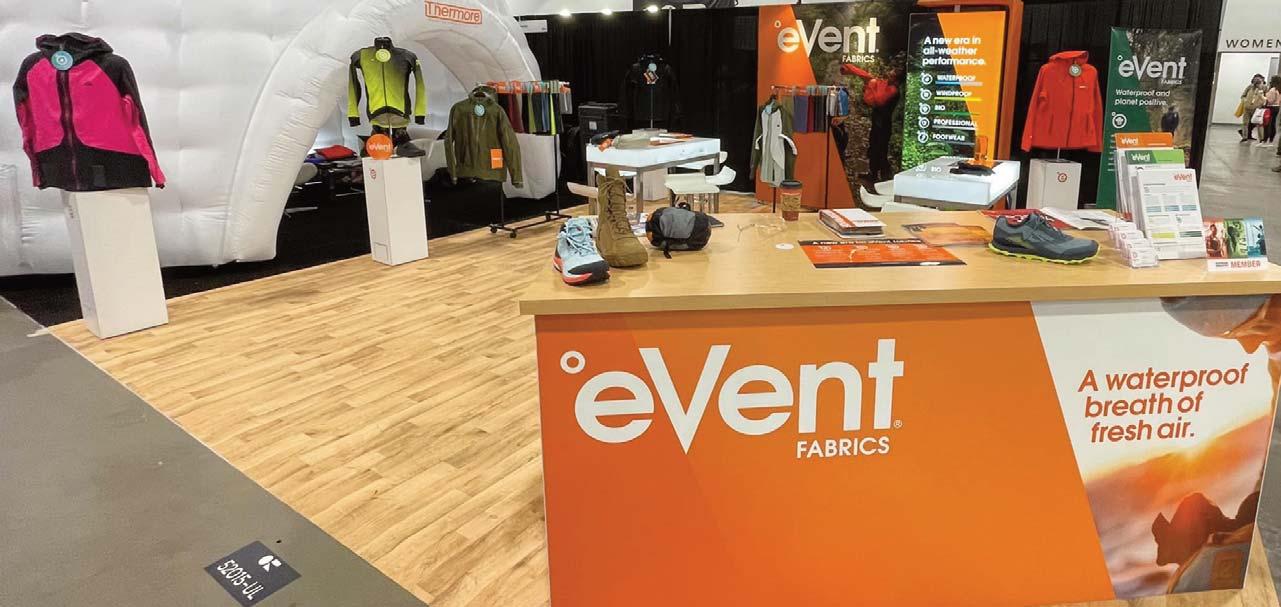
Widely embraced throughout the outerwear, footwear, and tactical markets, eVent Fabrics is preparing to increase global brand visibility
eVent Fabrics, a global leader in highperformance waterproof and breathable technologies, is partnering with Formidable Media, a public relations agency with deep roots in the textile and apparel industries, for strategic communications and brand elevation services.
Effective immediately, Formidable Media will assist eVent Fabrics with a wide range of communications and public
relations efforts to increase global brand visibility.
“For the past 25 years, eVent has led the way in breathable waterproof technology, and thanks to recent advances in performance and sustainability, we’re ready to embrace our next round of growth in the market,” said Chad Kelly, President of eVent Fabrics. “We’re looking forward to having Formidable help us gain brand recognition and market share.”

eVent’s list of technologies includes waterproof, windproof, and professional options, providing solutions for demanding apparel, footwear, and accessory applications.
eVent’s comprehensive list of weatherproof technologies includes the new sustainablyminded solutions alpineST and eVent BIO.
“eVent is an ideal partner for Formidable Media,” said Scott Kaier, Founder and President of

Scott Kaier; Founder and President at Formidable Media
Formidable Media. “A highly technical and well-respected material supplier, eVent offers brands some of the best performing waterproof/breathable laminates on the market. Couple that with several PFAS-free offerings, and this is a brand that is well positioned for serious growth.”
eVent Fabrics will join Formidable Media’s growing list of prominent textile and apparel industry clients, including ALLIED Feather + Down, Green Theme Technologies, and Active Apparel Group.
Sapphire Mills collaborates with Green Story for enhanced transparency
In line with its commitment to sustainable business practices, Sapphire Mills has partnered with Green Stor y, an environmental footprint intelligence platform, to conduct comprehensive Life Cycle Assessments (LCAs) at scale across its product line.
This collaboration aims to quantitatively measure and communicate the environmental impact of Sapphire Textile Mills' products using Green Story's advanced technology, including unique QR codes and digital product passports (DPP).
Sapphire Mills, part of the prestigious Sapphire Group, is a leading vertically integrated textile producer and exporter based in Pakistan, renowned for producing high-quality woven, dyed, and printed fabrics, as well as garments.
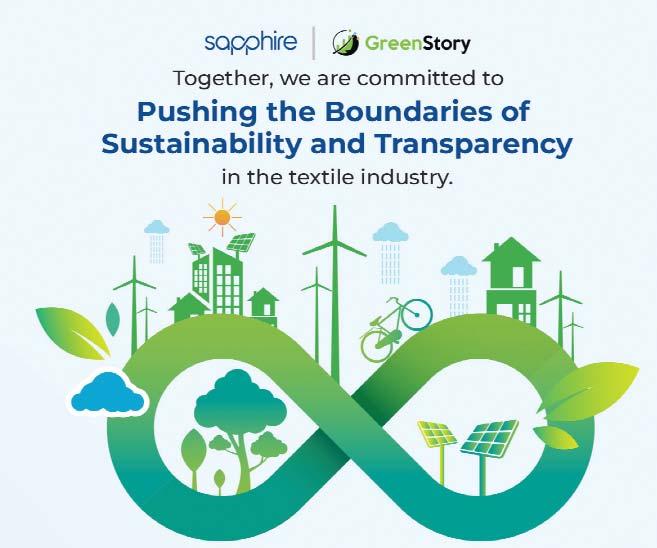
Sapphire Mills has long been committed to sustainability through its core pillars: People, Planet, and Prosperity. The company has invested heavily in these areas, including a state-of-the-art effluent treatment plant, a biomasspowered cogeneration plant, and the development of various recycled and biodegradable polyester products. Now, Sapphire Mills is taking a step further by accurately quantifying the environmental footprint of each product in their portfolio.
Green Story is a leading Environmental Footprint intelligence platform and one of the few official Higg FEM Verifier bodies globally. This accreditation ensures that every piece of primary data collected during verifications adheres to stringent protocols, guaranteeing high-quality and credible environmental assessments.
"We are proud to partner with Sapphire Mills, marking a pivotal moment in advancing sustainability transparency in the textile industry. By quantifying their environmental impact through our platform, Sapphire Textile Mills is setting new benchmarks for accountability and driving positive change," shares Akhil Sivanandan, CEO, Green Story.
Through this partnership, Sapphire Mills will leverage Green Story's platform to present environmental data in a clear and interactive manner across methodologies such as PEF, EPD and ISO 14047. Each product will be accompanied by a digital product passport accessible via QR codes, enabling customers to
trace their environmental journey from raw materials to finished goods. This initiative underscores Sapphire Mills' commitment to transparency and accountability in their sustainability practices.
"Our partnership with Green Story is not just about advancing our sustainability practices at Sapphire Mills; it’s about transforming the fashion industry and empowering consumers with transparent, ethical choices. Through rigorous Life Cycle Assessments and Digital Product Passports, we provide clear and accessible data about the environmental impact of our products. This collaboration enhances the value of our products by ensuring they meet the highest standards of environmental responsibility, driving industry-wide change, and supporting eco-conscious choices. We are proud to lead by example and offer our customers the confidence to make informed, sustainable decisions,” says Yousuf Abdullah, CEO, Sapphire Mills.
By quantifying their environmental impact through LCAs, Sapphire Mills can set Science Based Targets (SBTs) and gain insights into their Scope 3 emissions. This data-driven approach not only strengthens their commitment to sustainable manufacturing but also enables informed decision-making that drives positive environmental outcomes.
At the upcoming Kingpins event (July 17-18, 2024) in New York, Sapphire Mills will showcase its collaboration with Green Story. Visit Sapphire Mills it the Green Area, Booth #8, to see firsthand how this innovative technology works for Sapphire Mills.
S&P Global provides essential intelligence – analytics and workflow solutions in the global capital, commodity and automotive markets. One of the five business divisions - S&P Global Commodity Insights’ coverage includes chemicals & fibers, oil and gas, power, metals, agriculture and shipping. S&P Global Commodity Insights comprises well-known and market leading brands following the merger of IHS Markit with S&P Global in March 2022. S&P Global Market Intelligence delivers leading data sources and technologies about macroeconomy, regions and sectors and partners with customers to broaden their perspective and operate with confidence.
Mr. Christian Schindler, Director General of ITMF, stated that “ITMF is very pleased to welcome S&P Global as the latest corporate member.

S&P Global is a renowned company that is providing valuable data across regions and industries that is now also covering the upstream fiber and textile industry. It is mutually advantageous if companies

from the entire textile industry and from affiliated sectors are coming together at ITMF to meet and discuss issues related to the entire value chain. S&P Global has a lot of expertise to offer but can also benefit from being closer to the industry and thus from a better understanding of the dynamics shaping it.”
Ms. Tatiana Bondar, Associate Director of S&P Global Inc., pointed out that “by having joined ITMF the S&P Global will now

have access to a lot of valuable reports, statistics, and surveys that help to further improve the understanding of fibre and textile industry. Taking part in excusive ITMF activities like the ITMF Annual Conferences, special workshops and webinars provides access to in-depth knowledge and to being closer to market. In today’s interwoven and ever more complex world it is important to be embedded in the industry you serve and to have easy access to both information and industry experts from around the world. I believe that by staying tuned our fibers team, represented in EMEA, Asia and America, will be able to bring value to the ITMF and its members.”



CHT Germany raises container management to a sustainable level and increases the use of reusable packaging CHT Germany GmbH is successfully on its way to a sustainably acting chemical company.
With a corporate strategy consistently geared towards sustainability and a clearly defined path towards climate neutrality, CHT Germany are approaching their goal step by step.
An important milestone on the way is resource-optimized production and the use of the latest technologies to save as many resources as possible.
The comprehensive analysis of CHT’s processes has led the company to raise container management to a sustainable level and increase the use of reusable packaging.
The necessary packaging is kept directly in circulation and the overall amount of needed material is reduced. The energy required to clean and reuse existing packaging is less than that needed to recycle and produce new containers.
CHT is saving on raw materials by building a resource-efficient new container washing system and recycling the residual materials and waste that still
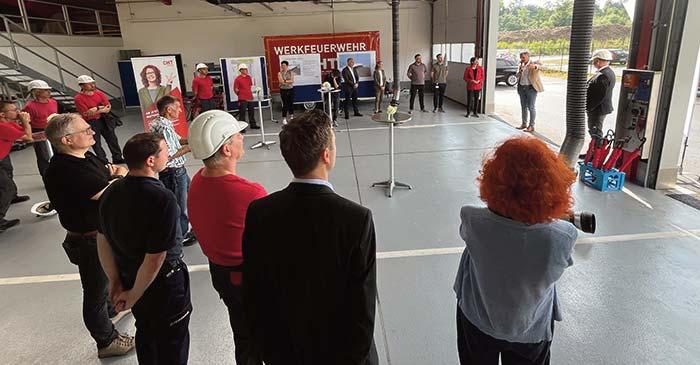
accumulate.
With the new system, the increase in the reuse of existing containers can significantly reduce the procurement of new packaging (drums and IBCs). By cleaning on site, CHT saves on transportation and thus further resources.
With the investment of almost 5 million Euros at the Dusslingen site, CHT is making a significant contribution to reducing their carbon footprint.
It goes without saying that the new state-of-the-art plant will be operated with maximum resource efficiency using
heat from the renewable local heating network. The water circulates and comes from rainwater and the roof is used to generate renewable electricity. The PV system is dimensioned to its maximum size so that it generates more electricity than the container washing system below it needs.
At an official ground-breaking ceremony, representatives of public administration and the press were able to see this construction project for themselves and make direct contact with the company representatives.
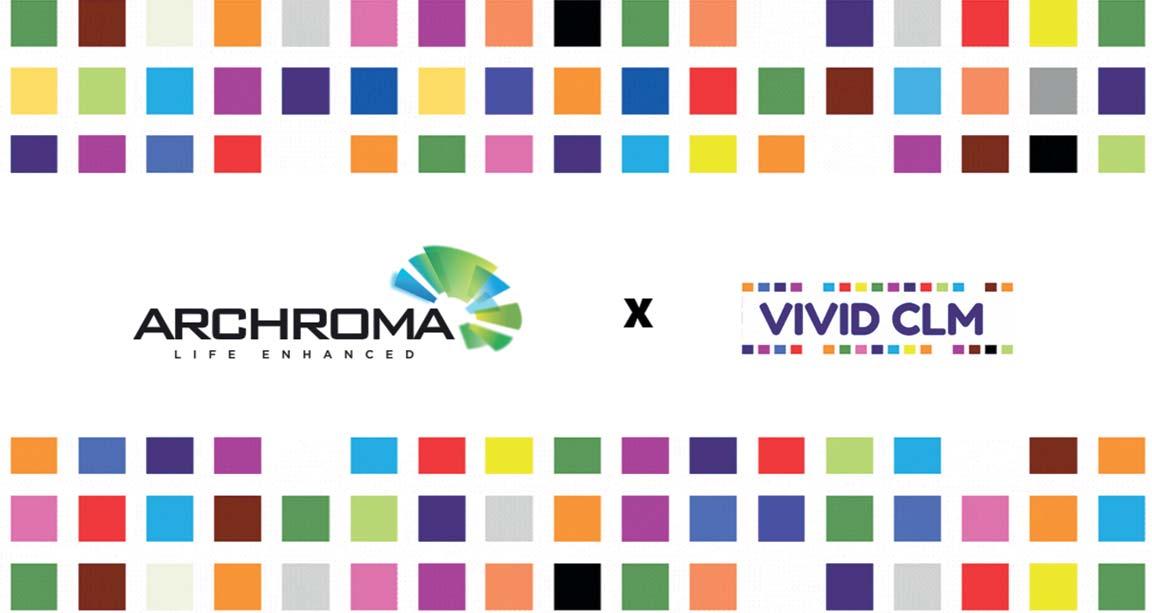
Archroma, a global leader in specialty chemicals towards sustainable solutions, is collaborating with Zydat Inc. to bring the complete Color Atlas by Archroma® color library to the Vivid Color Library Management (CLM) color-matching platform for faster and more accurate inkjet digital printing of fashion and textiles.
Archroma’s Color Atlas is the textile industry’s largest library of engineered color standards, with more than 5,760 color references formulated to comply with leading eco-standards and deliver consistent and accurate color reproduction.
With these colors available within Vivid CLM’s online color palette optimization and correction tools, designers can more quickly and easily create and share their color palettes for more accurate inkjet printing. This can reduce the burden of pre-production color proofing and streamline the color management process to help deliver
high-quality printed fabric and apparel in a fast and economical way.
Vivid CLM was launched by Zydat in February 2024. It offers a unique and designer-oriented solution to color matching with a proprietary algorithm that translates complex spectral data into a Red-Green-Blue workflow and allows the user to print, scan and check the color, with automatic adjustments to improve accuracy. The solution’s palette storage system allows colorists to share palettes across the ecosystem.
“Digital workflows and inkjet printing present an opportunity for designers and brands to embrace both their creative vision and their sustainability principles,” Chris Hipps, Global Head of Archroma Color Management, said. “Our partnership with Vivid CLM reflects Archroma’s ‘PLANET CONSCIOUS+’ commitment to innovation and partnership that supports a more sustainable textile ecosystem.”
Matthew Forman, President of Vivid CLM by Zydat Inc., said: “Archroma and
Vivid CLM have come together to revolutionize color palette selection, creation and inkjet printing for fashion designers. By integrating the Archroma Color Atlas into the Vivid CLM workflow, we are giving designers access to thousands of ready-made digital colors and enabling swift and seamless color matching for their particular inkjet printing system.”
In addition to accessing all of the 5,760 colors in the Archroma Color Atlas portfolio as digital standards within Vivid CLM, users of the software may also choose to refer to Archroma’s physical color library in multiple formats. They can also tap into Archroma’s expertise around the world for technical support with sustainable coloration systems and achievability on alternate substrates.
The Color Atlas by Archroma® is part of the Archroma Color Management+ design and development solution for more sustainable textiles and fashion through fast color selection and creation, consistent and accurate color reproduction, and reduced environmental impact.
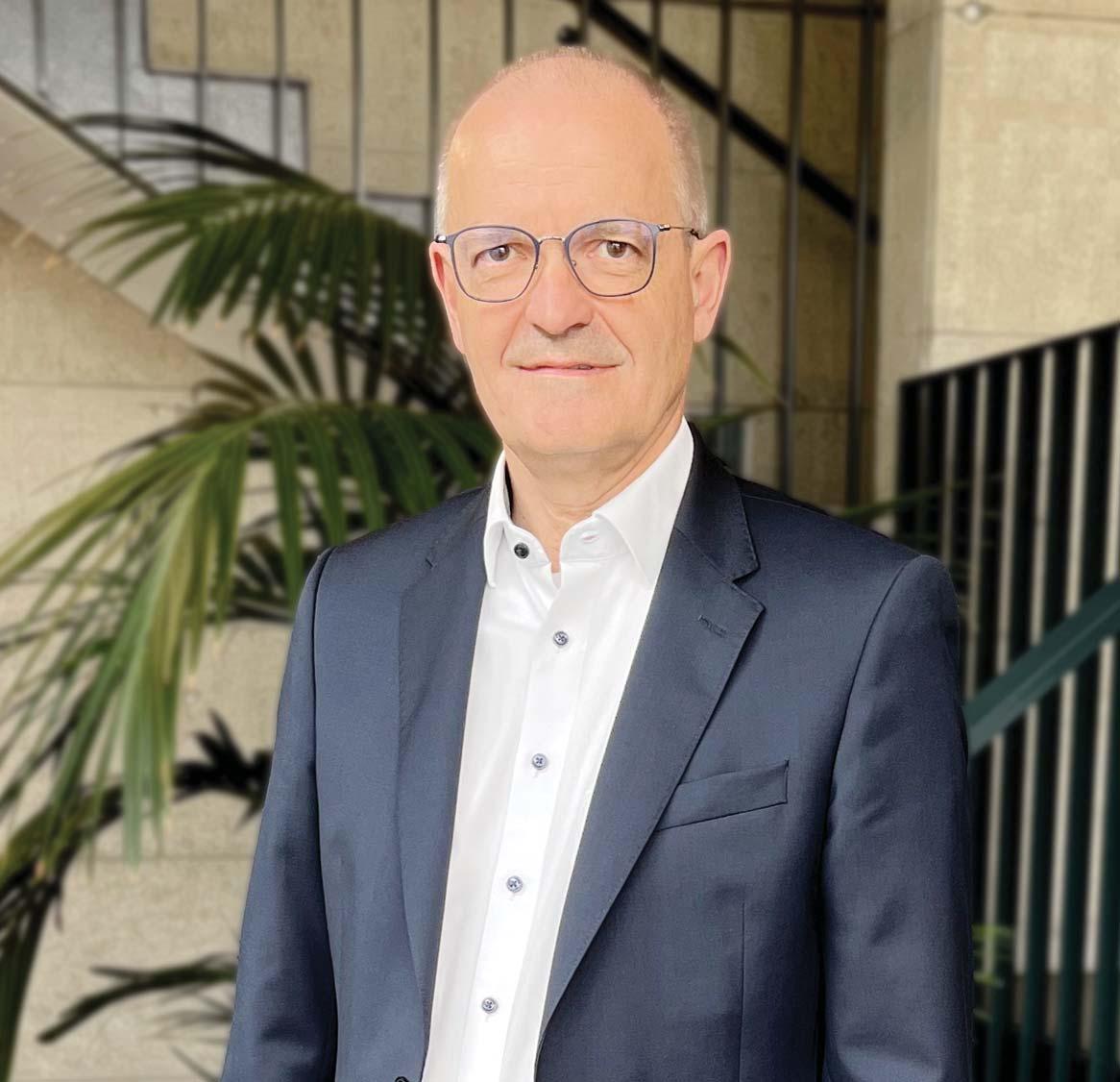
Loepfe Brothers Ltd. has embarked on a new chapter with the appointment of Markus Kleindorp as the new CEO, ushering in a fresh era of leadership. Former CEO Ralph Mennicke's departure prompts restructuring, including the addition of Gregor Stalder as CFO. With this seasoned team, Loepfe aims to maintain its excellence in the textile industry.
Since the beginning of May, Loepfe Brothers Ltd. has been led by a new management team. The Board of Directors has appointed Markus Kleindorp as the new CEO of Loepfe.
Markus Kleindorp brings a wealth of experience from his tenure within the Vandewiele Group and as the former CEO of MEMMINGER-IRO GmbH, offering deep insights into the textile industry.
After four years of dedicated service, the former CEO of Loepfe, Ralph Mennicke, has decided to embark on new professional endeavors, signaling a change in leadership for the company. The Board of Directors acknowledges Mennicke's resignation and extends gratitude for his contributions to Loepfe's journey.
Furthermore, Loepfe is seizing this moment to restructure its management team, reinforcing it with an individual possessing extensive business expertise, and are delighted to introduce Gregor Stalder as the new CFO of Loepfe. Gregor Stalder is a proven expert in finance and has long-term experience in the position of a CFO.
With this accomplished leadership team in place, Loepfe is poised to continue its trajectory of excellence in the textile industry. Loepfe expressed gratitude to their stakeholders for their ongoing support and partnership as they embark on this exciting journey together.
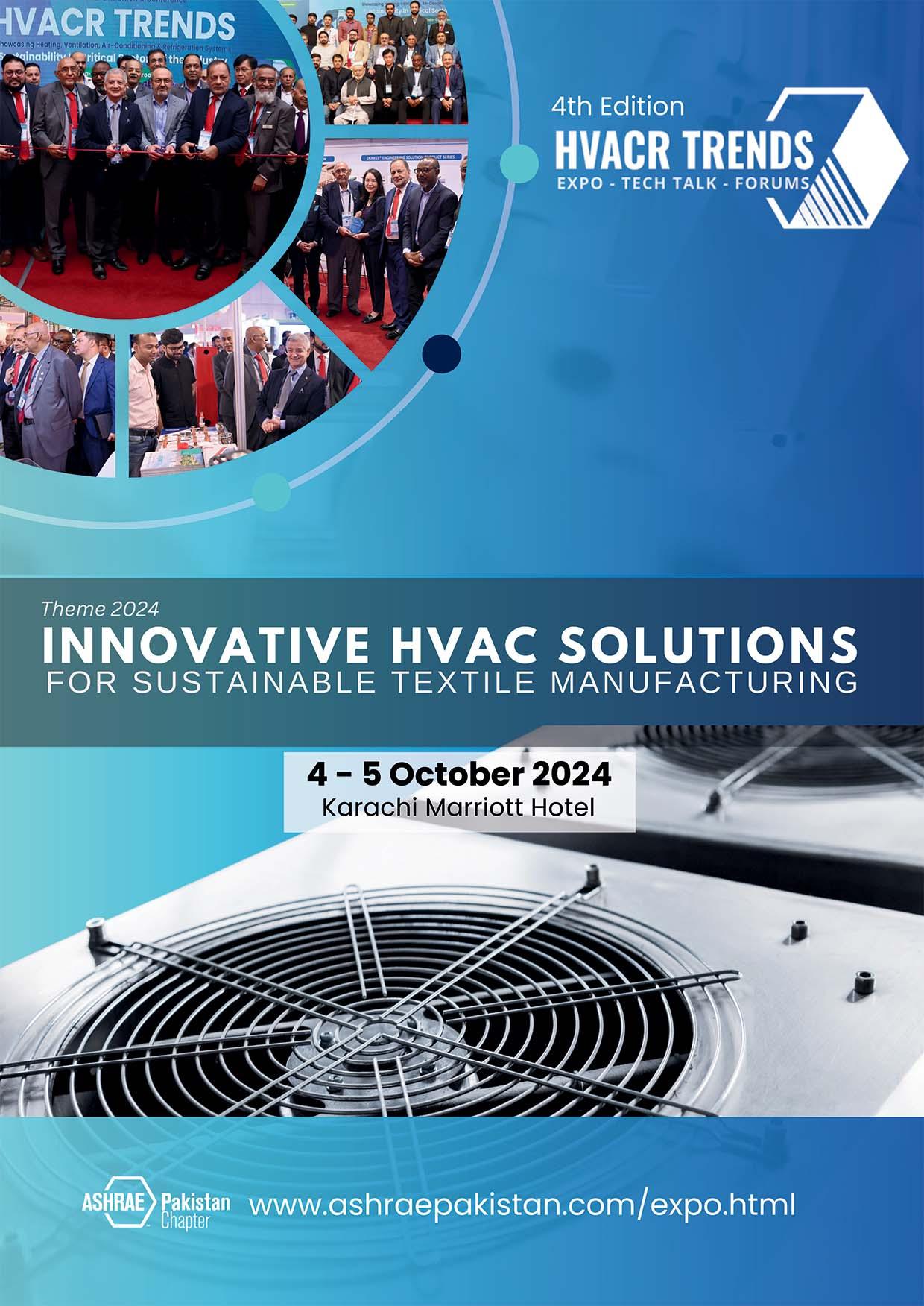

The German companies Brückner, Groz-Beckert, the Karl Mayer Group and Thies invite representatives of the Brazilian textile industry to a symposium with presentations and discussion panels in Blumenau, Brazil, on August 21, 2024. The event will be held at NS Armazém, Fortaleza, Blumenau and will focus on the current demand trend for warp knitted elastic fabrics.
The demand for warp knitted elastic fabrics has increased rapidly in the past two to three years. On the one hand, this offers the Brazilian textile industry new growth opportunities and the chance to establish itself in a leading position in the growing market. On the other hand, the turnaround also holds challenges as the production steps involved in manufacture of warp knitted elastic fabrics are strik-
ingly different from the conventional methods.
In order to provide the Brazilian warp knitting industry with optimum support in this change, Brückner, Groz-Beckert, Karl Mayer and Thies are inviting participants to a specialist symposium on the subject of "Production of Warp Knitted Elastic Fabric". Industry experts, stakeholders and textile visionaries are invited to share their insights and experiences with the guests.
The aim of the symposium is to provide a platform where knowledge can be exchanged and cooperation intensified. The symposium offers a wide variety of technical presentations as well as best practice examples and showcases cuttingedge technologies and innovations in warp knitting technology. Interactive sessions and discussion rounds promote exchange among participants and provide
networking opportunities. The event language is Portuguese.
This is how the German companies Brückner, Groz-Beckert, Karl Mayer and Thies would like to provide their Brazilian customers with optimum support in adapting to rapidly changing trends and benefiting from the current trend in warp knitted elastic fabrics.
Those interested in attending the symposium may contact the sales representatives: Frank Bernhard or Fabricio Rampani (Brückner, Thies & Karl Mayer), or Diomar Gomes Vieira (Groz-Beckert) to register: frank.bernhard@mbrtextil.com.br, fabricio.rampani@mbrtextil.com.br, malharia.sudeste@ns.com.br.
Venue: NS Armazém, Fortaleza, Blumenau BR 470, 7109 CEP 89058-020Fortaleza Blumenau, SC- Brasil
Date: August 21, 2024
10.00 a.m.–11.40 a.m.
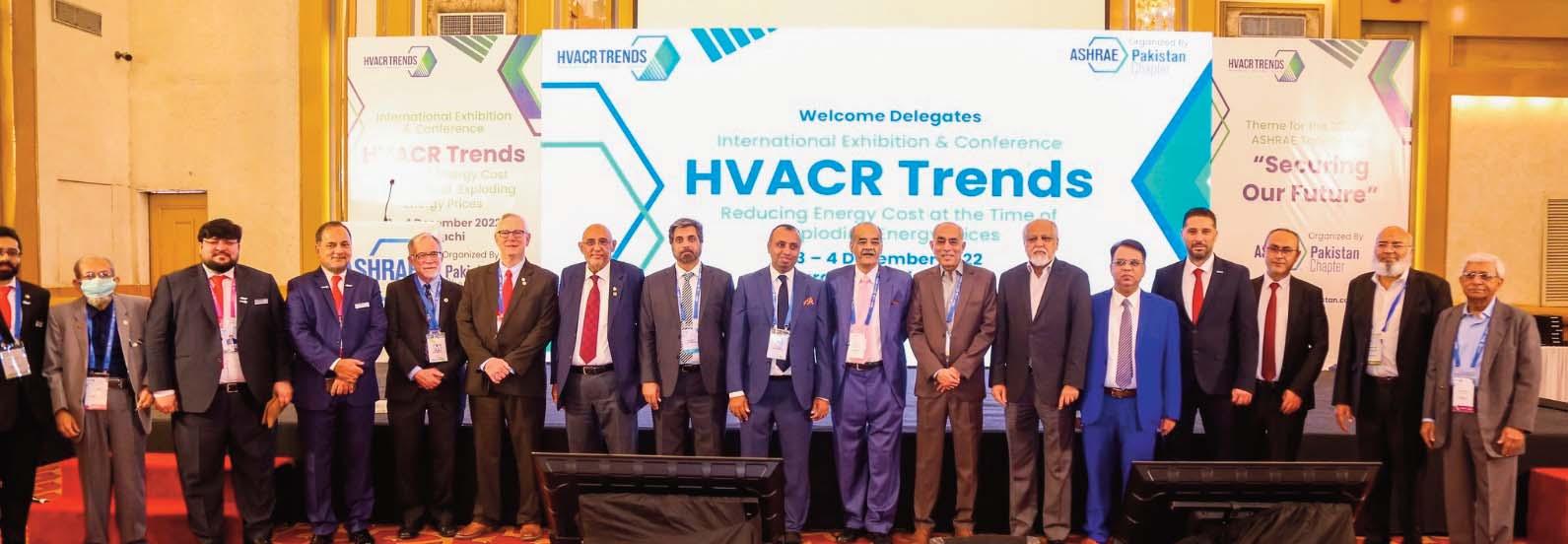
The ASHRAE Pakistan Chapter is proud to announce that Karachi will host two major international events: the ASHRAE Region-At-Large (RAL) Chapter Regional Conference (CRC) 2024 and the 4th HVACR Trends Expo and Conference. These events will take place from October 4-7, 2024, marking a significant milestone for Pakistan’s HVACR industry.
ASHRAE RAL CRC 2024 will be held at the Movenpick Hotel, Karachi from October 4-7, 2024. This prestigious conference will attract over 300 delegates from 21 member chapters of ASHRAE RAL, including participants from the Middle East, Africa, Pakistan, and Turkey. The four-day event will feature business sessions, training programs, and networking opportunities aimed at advancing the HVACR field. Highlights include a cultural dinner at the prestigious Governor's House, a sports night dinner, and a Presidential Lunch with the ASHRAE President.
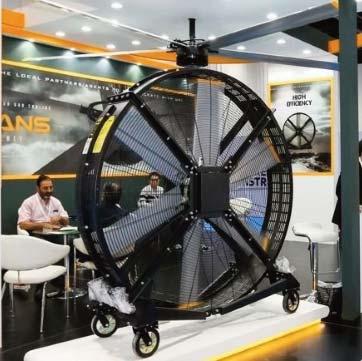
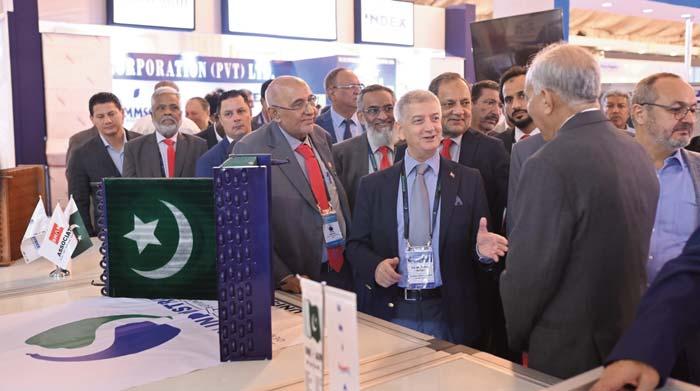
Muhammad Abbas Sajid, General Chair of ASHRAE RAL CRC, shared his excitement, stating, “This CRC is a unique opportunity to bring together the best minds from across the region. We look forward to fruitful discussions, knowledge sharing, and building stronger connections within the ASHRAE community.”
Simultaneously, the 4th HVACR Trends Expo and Conference will take place at the Marriott Hotel, Karachi on October 4-5, 2024. This year’s expo focuses on the theme ‘Sustainable HVAC Design and Systems for Textile and Garments Industry.’ The event aims to spotlight innovative HVACR solutions that address energy efficiency and sustainability challenges in Pakistan’s textile sector, a vital part of the nation’s economy.
Mahmood Ahmed, President of ASHRAE Pakistan Chapter, emphasized
the importance of this expo, saying, “The 4th HVACR Trends Expo is a critical platform for showcasing cutting-edge technologies and sustainable practices. With a focus on the textile and garments industry, this event will help shape the future of HVACR systems in Pakistan, driving efficiency and environmental responsibility.”
Both events are expected to draw significant participation from local and international delegates, providing a unique platform for knowledge exchange, professional development, and business networking.
For more information, please contact: Communications Chair, ASHRAE Pakistan Chapter, Email: communication@ashraepakistan.com
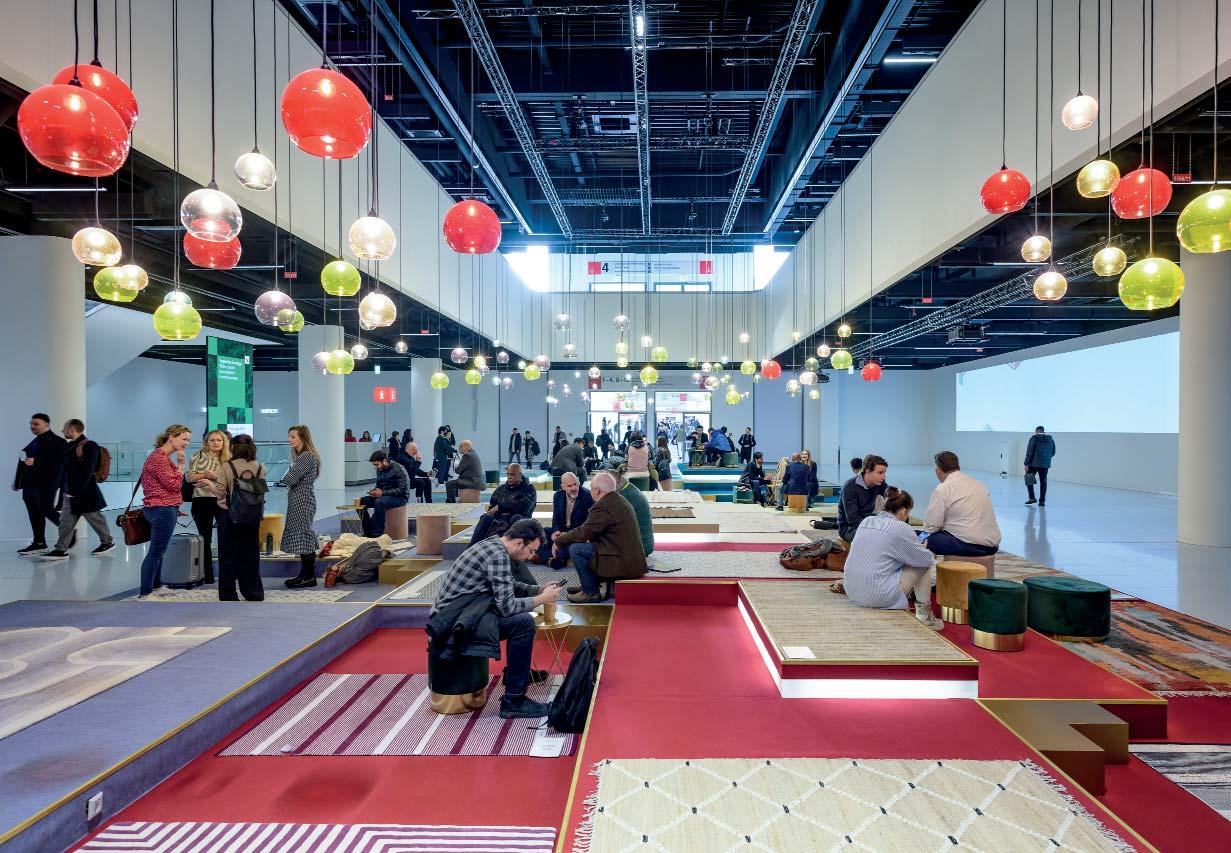
Even bigger, even more international, even higher quality: this is how the successfully established product group Carpets & Rugs presents itself at Heimtextil 2025. The segment will be even stronger at the upcoming event: Carpets & Rugs already has twice as many exhibitors, an additional hall level and new highlights. Strong brands, exciting new products and content formats await the international carpet industry at Heimtextil 2025 in Frankfurt.
Carpets & Rugs on course for growth: At Heimtextil 2025, the successfully established product segment grows in quality and quantity – and is already
recording an enormous increase in exhibitors six months before the upcoming event: more than twice as many companies have already registered compared to the previous year. “We are very pleased about this signal from the market. It clearly reflects the industry's need for a strong, international and central carpet platform. This is exactly what we offer with Heimtextil in Frankfurt: a comprehensive market overview and a bundled product range combined with the highest quality. We have listened to the market and taken on board the feedback. Now it's a matter of expanding the range, organising it in a structured way and presenting it to
visitors in a structured manner”, explains Bettina Bär, Director Heimtextil. In 2025, the segment grows by an entire hall level: the expanded range of high-quality hand-woven carpets and the international country pavilions are located in the additional Hall 5.0. Once again, Hall 5.1 is home to the growing segment of machine-woven carpets and also brings together the enlarged preproduction offer with fibres and yarns as well as technologies specifically for the carpet industry. Hand-knotted carpets and unique pieces, doormats and cleanoff systems as well as textile solutions for outdoor areas and contract business round off the unique range. Another
highlight: a new carpet area is being planned together with the exhibitor Ragolle Rugs and the Belgian association Fedustria. The association will be exhibiting together with well-known exhibitors from Belgium in a high-quality joint presentation. Strong resonance from the industry: these exhibitors are taking part
Numerous renowned companies have already confirmed their participation at Heimtextil 2025. Among them are big international names such as Bhadohi Carpets (India), Balta Home (Belgium) und Kaleen Lifestyle (India), who will exhibit for the first time at the upcoming Heimtextil. Renowned brands like Lalee OHG (Germany) and strong returnees like Heritage Overseas (India), Mittal International (India), Oriental Weavers Group (Oriental Weavers Carpets, EFCO, MAC Carpet, Egypt), Ragolle Rugs (Belgium), Rugs in Style (India), The Rug Republic (India), Tufko International (India), Universal XXI (Spain) and Vini Décor (India) have also signed up. Within the Decoteam, the carpet supplier InfloorGirloon (Germany) and the manufactory Paulig (Germany) with unique handwoven products will present themselves. In addition, the member companies of the Belgian association Fedustria and, for the first time, the Tunisian association Office National de L’Artisanat will show their high-quality carpets at Heimtextil.
The exhibitors confirm the successful establishment of the new product area and the role of Heimtextil as a global
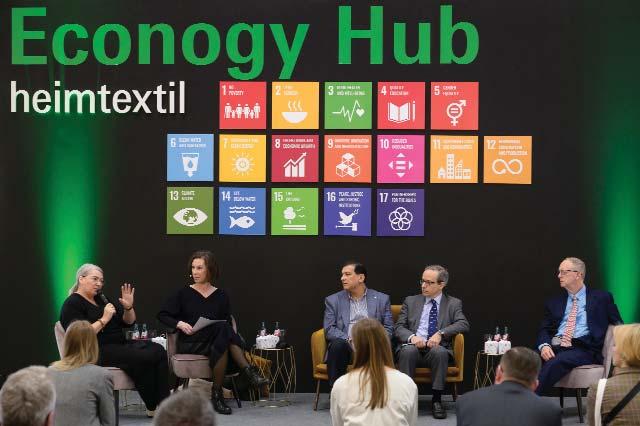
industry meeting point and showcase for new trends, collections and products: “Our first participation in this year's Heimtextil was a success; Heimtextil represents a destination for textile innovations in the home textiles industry, trends, sustainable impulses, and a variety of unique opportunities for our business. We benefited from excellent introductions and numerous new international contacts. We look forward to participating again in 2025”, says Yasmine Khamis, Chairwoman Oriental Weavers Group.
Mittal International emphasises the joint industry presence in the Carpets & Rugs product segment as well as the Frankfurt location as a new anchor point for the carpet industry: “We really appreciate the initiative taken by Messe

Frankfurt in launching the Carpets & Rugs segment at Heimtextil. The concept was convincing across the board and met the needs of the industry. We had a successful start, a good influx of customers and also received orders from the USA and Mexico. Carpets & Rugs as a new platform for the carpet industry is a great advantage for us, as we can focus on all segments at Heimtextil. We are even expanding our stand space in Frankfurt for 2025. We are looking forward to participating again in order to continue shaping the new product area for the future,” says Manmohan Sharma, Founding Partner Mittal International.
The additional hall level not only offers an expanded range of exhibitor presentations and product innovations –an extensive content programme also awaits visitors on the two Heimtextil stages: With business-promoting specialist presentations on current industry topics, stimulating panel discussions and exciting guided tours, Heimtextil 2025 positions itself even stronger as a valuable knowledge platform for the carpet industry. The popular Carpet Lounge in the foyer of Halls 5.1/6.1, equipped with high-quality exhibitor products, will once again bring unusual designs and new carpet trends to life in 2025 – and invites visitors to linger and network.
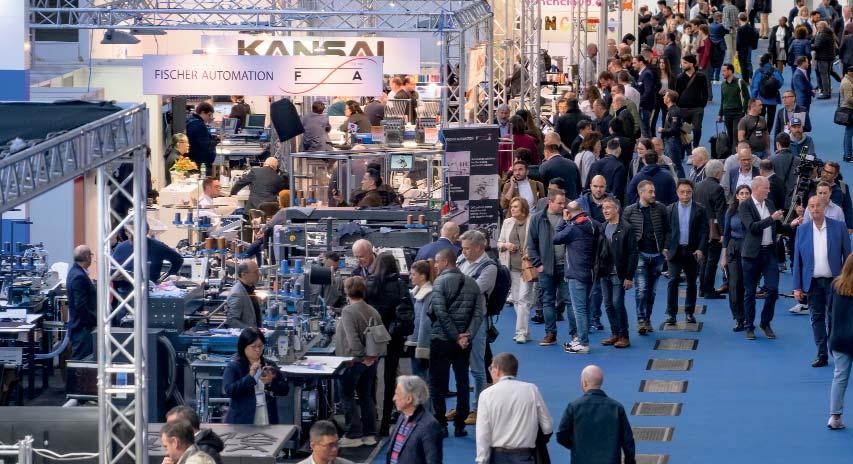
Natural yet high-performing fibres are game changers for many branches. Nature and performance come together in new, innovative solutions – a real milestone towards sustainability. At Techtextil 2024, international exhibitors showed future-proof developments for numerous industries in the ‘Nature Performance’ area. For Techtextil 2026, functional natural materials will become even more of a focus.
Functional and natural at the same time – innovative natural fibres manage the link between performance and sustainability and are developing into real all-rounders. They are in high demand for application in numerous industries worldwide. The market for natural fibres alone is expected to grow to around USD 103 million in 20311. As demand for natural materials increases, innovations are also being developed to improve their performance. New materials, finishing and processing methods increase the performance of sustainable textiles –
whether natural, bio-based, degradable or man-made. This was also evident at Techtextil in April, which dedicated a separate ‘Nature Performance’ area to the future topic.
"The industry is ready to provide a range of functional textiles on a natural basis. Whether in the automotive or construction industry, the demand for natural materials is increasing rapidly. We
are pleased to see that forward-looking solutions are being presented and welcomed by the branches. In April, more than 15% of exhibitors were already showing natural fibres and materials. Due to the high demand and ongoing developments, we expect an even larger range of natural performance materials at the next Techtextil," says Sabine Scharrer, Director Brand Management Technical

Textiles & Textile Processing at Messe Frankfurt.
The exhibitors presented a whole range of fibre and material exhibits with functional properties to the trade visitors, ranging from natural insulating materials to circular polyester fibres.
Among them was the Canadian startup Vegeto, which presented degradable thermal insulation based on milkweed, biopolymer fibres made from corn starch and kapok, a natural fibre from the silk tree. A jacket with a non-woven inner lining based on the new milkweed insulation apparently attracted a lot of attention at the Vegeto stand in the Nature Performance area. “People came to our stand and were really amazed that a plant-based insulating material of this quality even exists,” reports Vegeto General Manager Ghyslain Bouchard.
Anatolian Colors from Turkey showcased innovative natural dyes that can compete with chemical dyes in terms of quality and durability. “The Nature Performance Area was an excellent platform for us, which fits perfectly with our vision of environmentally friendly and sustainable textile production,” says Sophia Merve Ince, founder of Anatolian Colors. Participation in Techtextil has noticeably increased awareness of the new plant dyes and helped to reach a larger international audience. Talks were held on site with representatives from various industries – from fashion to automotive. “It was particularly pleasing that a leading fashion brand showed

interest in a pilot project with our products for its own collection,” reports the CEO. Due to its great success, the company is already planning to take part in Techtextil 2026.
The Swiss start-up OceanSafe presented a polyester material that, according to the company, is just as durable, functional and scalable as conventional polyester. The highlight: it is also said to be completely biodegradable. The circular polyester was very well received by trade visitors: “The feedback was amazing,” says CMO Matthias Fuchs, summarising the company's first Techtextil appearance. “We had significantly more visitors than expected.” According to Fuchs, the variety of
contacts ranged from automotive, medical and clothing to workwear, construction and public procurement. Overall, the quality of the visitors was “excellent”.
The increasing usage of natural fibres in the textile industry was also the central theme of the ‘Discover Natural Fibres Initiative’ (DNFI) at Techtextil. The international alliance of over 40 associations, organisations, natural fibre manufacturers and research institutes aims to raise awareness of the importance of natural fibres and promote their application. Looking back, Sandra Bohne, Managing Director of DNFI member ‘Fibral Material Alliance’, is very satisfied with the DNFI participation in the Nature Performance area. “Many companies that have not yet used natural fibres before visited our booth to find out about alternatives to man-made fibres,” says Bohne. Overall, it was a very successful event at which the DNFI representatives received many questions about potential applications for natural fibres from a wide range of industries, including fashion, home textiles, construction, automotive and composites.
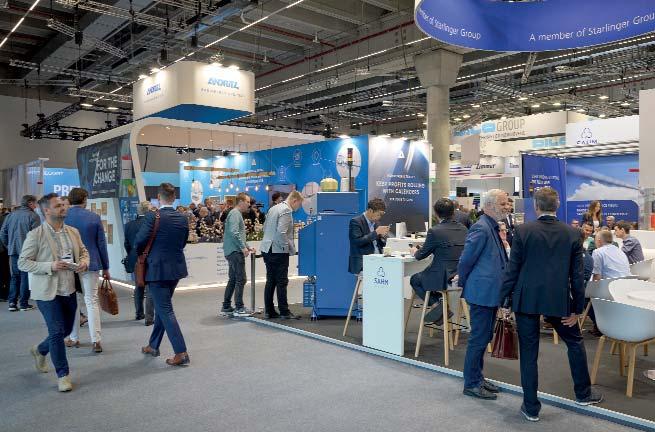
The innovative companies demonstrate this: nature and performance are a sustainable match. At Techtextil 2026, the focus will be even more on natural fibres, yarns and materials.
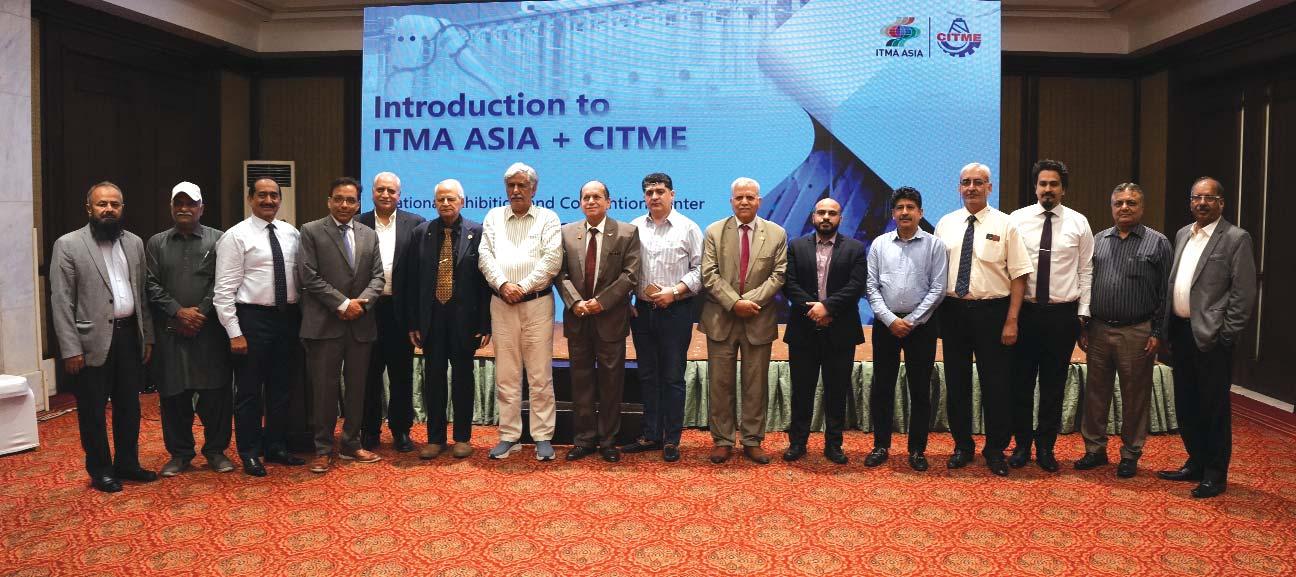
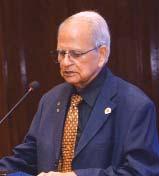
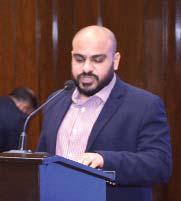
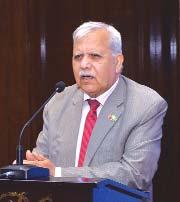
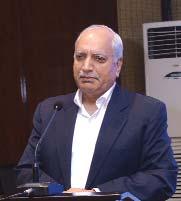

Road shows were concluded successfully in Pakistan’s economic and cultural hubs: Lahore and Karachi, respectively on, 23th–26th July 2024.
The Pakistan Textile Journal, in collaboration with ITMA ASIA + CITME, proudly hosted two highly successful Pre ITMA ASIA + CITME 2024 Road Shows in Lahore and Karachi. These events, held at the PC Hotel in Lahore on July 23, 2024, and at the Movenpick Hotel in Karachi on July 26, 2024, brought together over 280 professionals from Pakistan's textile industry. The strong turnout and engaging discussions at both seminars underscore the unity and shared commitment of the textile sector as it prepares for the upcoming ITMA ASIA + CITME Exhibition in Shanghai, China.
Lahore Seminar
The Lahore seminar set the stage for collaborative growth, with more than 130 industry leaders coming together to share insights and expectations for the ITMA ASIA + CITME Exhibition. The event began with a warm welcome from Mr. Nadeem Mazhar, who emphasized the importance of unity within the industry. Distinguished guests, including Mr. S.M. Qutab, Chairman of the Textile Institute, and Mr. Zameer Ahmad Awan, a China
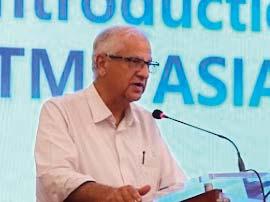
specialist, highlighted the opportunities for collaboration between Pakistan and China in the textile sector.
Keynote speeches by Mr. Khalid Mahmood, Director of Master Textiles, and Mr. Muhammad Atta, Regional Head at Gerry's Visa, reinforced the message of collective progress. A significant highlight was a video message from Mr. Zhen Shen, Deputy Secretary of CCPIT TEX and Vice President of BJITME, which under-
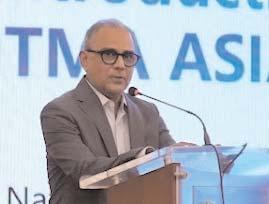
scored the exhibition’s potential and its significance for Pakistan's textile sector. Additionally, a virtual address by Mr. Alex Zucchi, President of CEMATEX, emphasized the exhibition’s critical importance for Asian markets, reinforcing why Pakistan can’t afford to miss it. The seminar concluded with a strong sense of unity, as attendees received awards in recognition of their contributions to the industry.
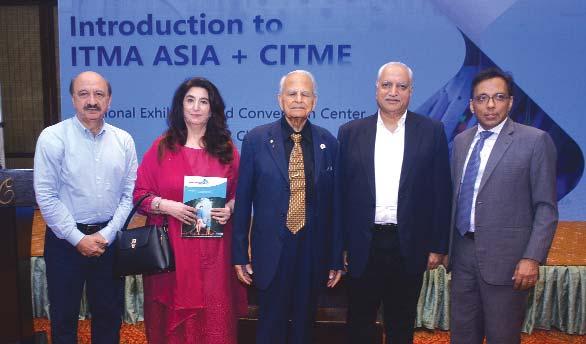

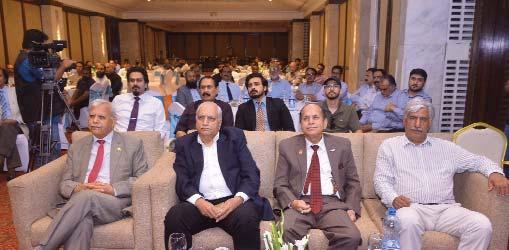

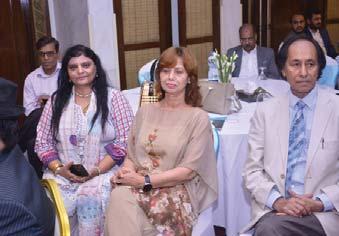
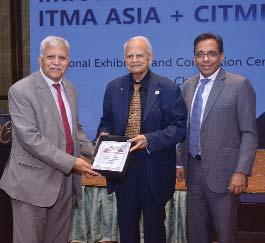
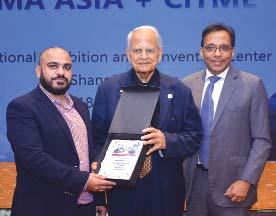
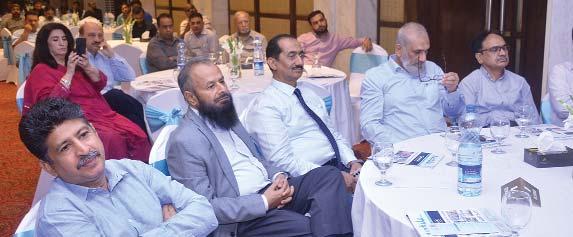


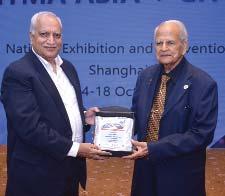
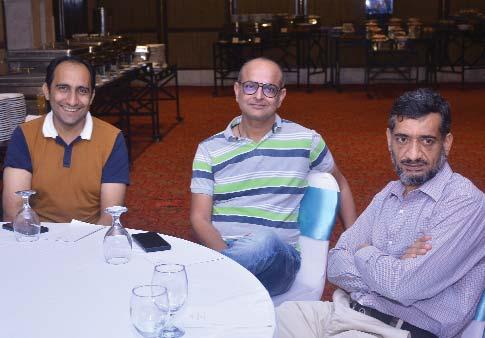

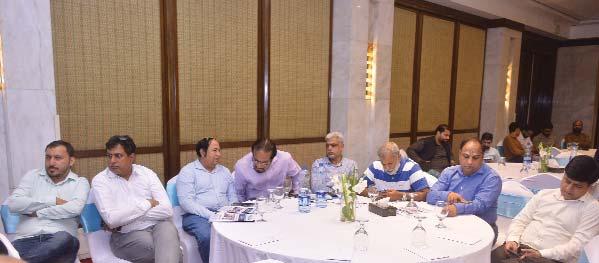
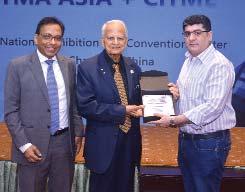
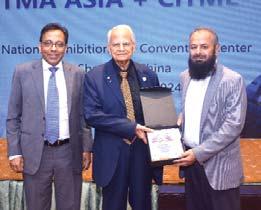
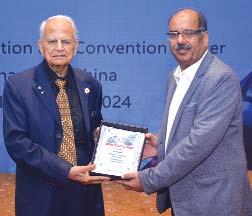

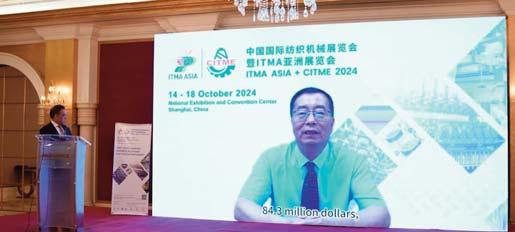
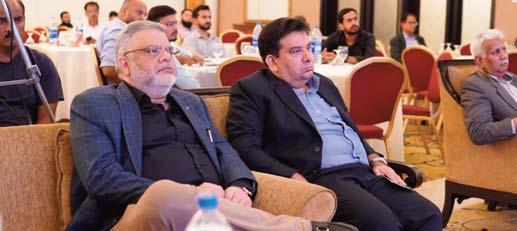
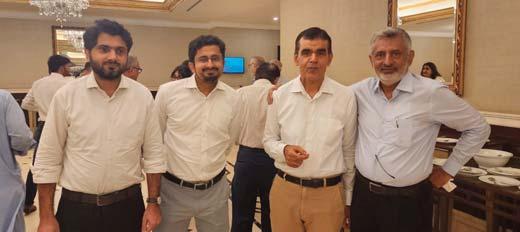
The Karachi seminar built on the momentum from Lahore, attracting 150 participants from various sectors of the textile industry. The event underscored the shared vision of growth and innovation within the industry, as key speakers emphasized the importance of attending the ITMA ASIA + CITME Exhibition.
Mr. Nadeem Mazhar opened the event with a welcome address, followed by a video message from Mr. Gu Ping, President of the China Textile Machinery Association and Chairman of Beijing Textile Machinery International Exhibition Co. Ltd. for the Promotion of International Trade (CCPIT TEX). Mr. Gu Ping emphasized the vital relationship between China and Pakistan in the textile
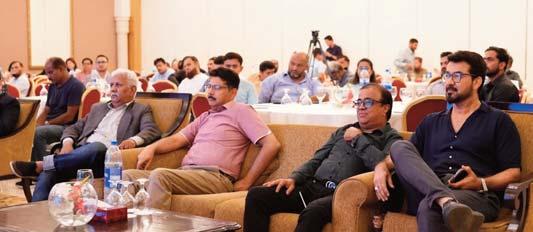
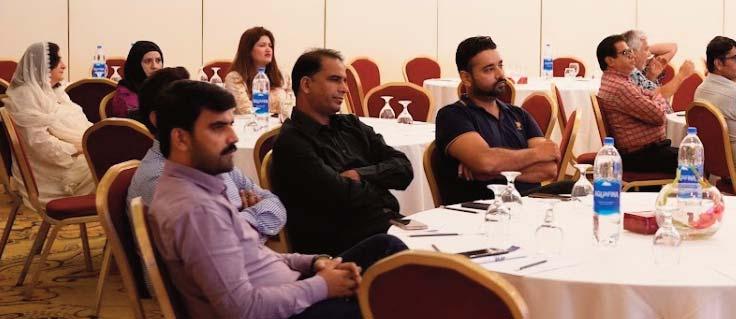
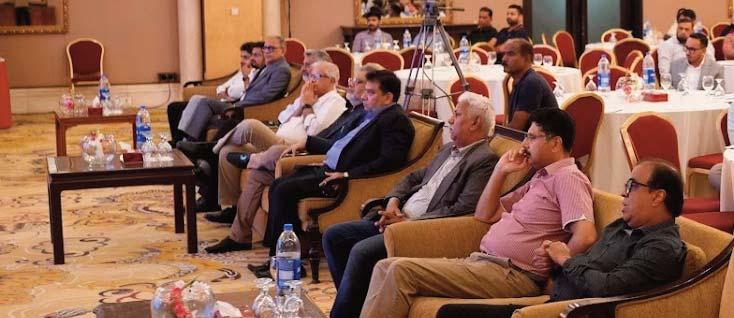
industry and invited industry professionals to participate in the event in Shanghai, highlighting mutual benefits and deeper cooperation. Additionally, a virtual address by Mr. Alex Zucchi, President of CEMATEX, emphasized the exhibition’s critical importance for Asian markets.
Ms. Sophia Al Khawar of Gerry’s Visa Services outlined a unified approach to facilitating visa processes, ensuring smooth participation for all attendees, including VIP lounge access and coordinated embassy support. Mr. K.M. Khalid, General Secretary of TEXMAP, and Mr. Arij Iqbal, President of the Italian Development Committee, provided valuable insights into global trends and the exhibition's pivotal role in advancing the textile sector.
The road shows in Lahore and Karachi were not just about preparing for an exhibition; they were a testament to the unity and shared purpose of Pakistan’s textile industry. As the country’s textile sector looks ahead to the ITMA ASIA + CITME 2024 Exhibition, the message is clear: by standing together and embracing collective growth, Pakistan’s textile industry is poised to achieve new heights on the global stage.
Looking ahead, the Pre ITMA-ASIA + CITME 2024 Road Shows have laid a solid foundation for a unified and collaborative approach as Pakistan’s textile industry gears up for the global stage in Shanghai. Together, the industry is ready to seize the opportunities that lie ahead, driven by a collective commitment to growth and innovation.
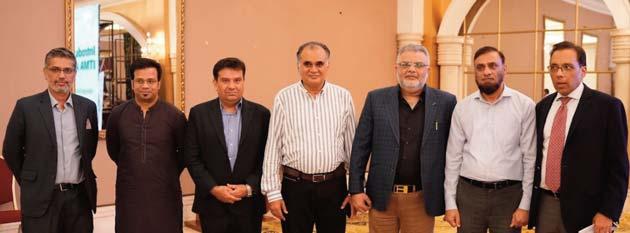
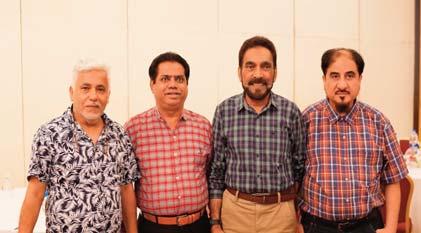
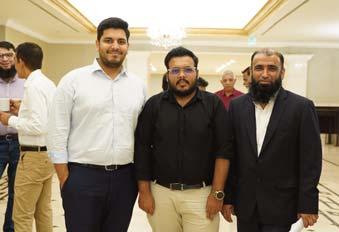

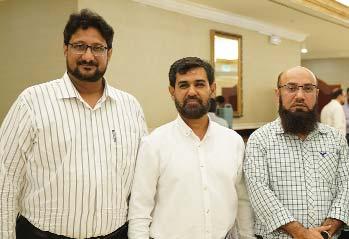

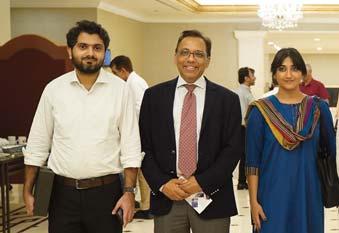
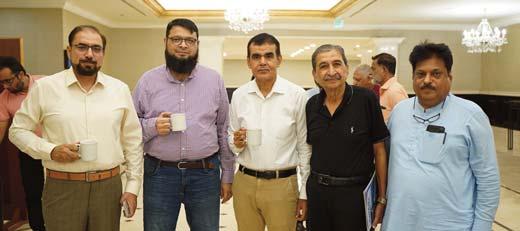
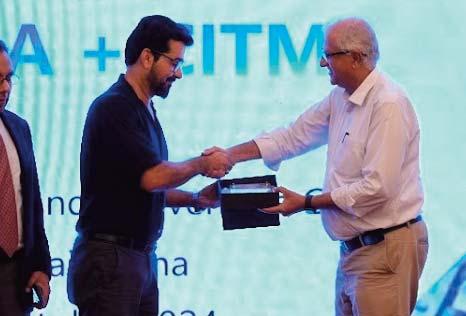
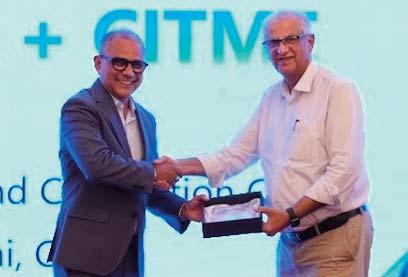
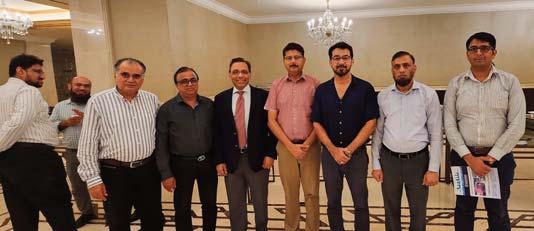
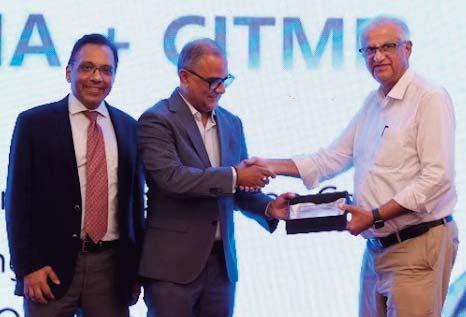
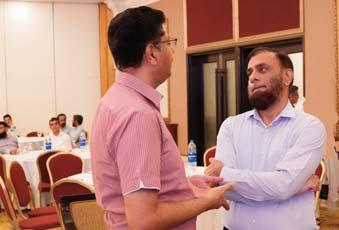
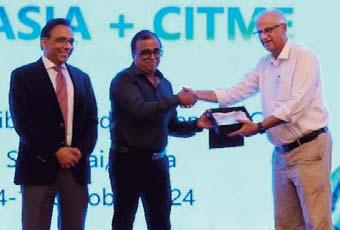
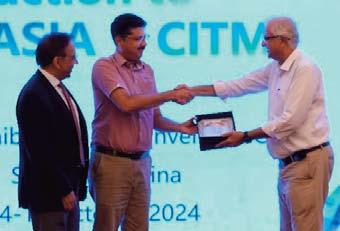
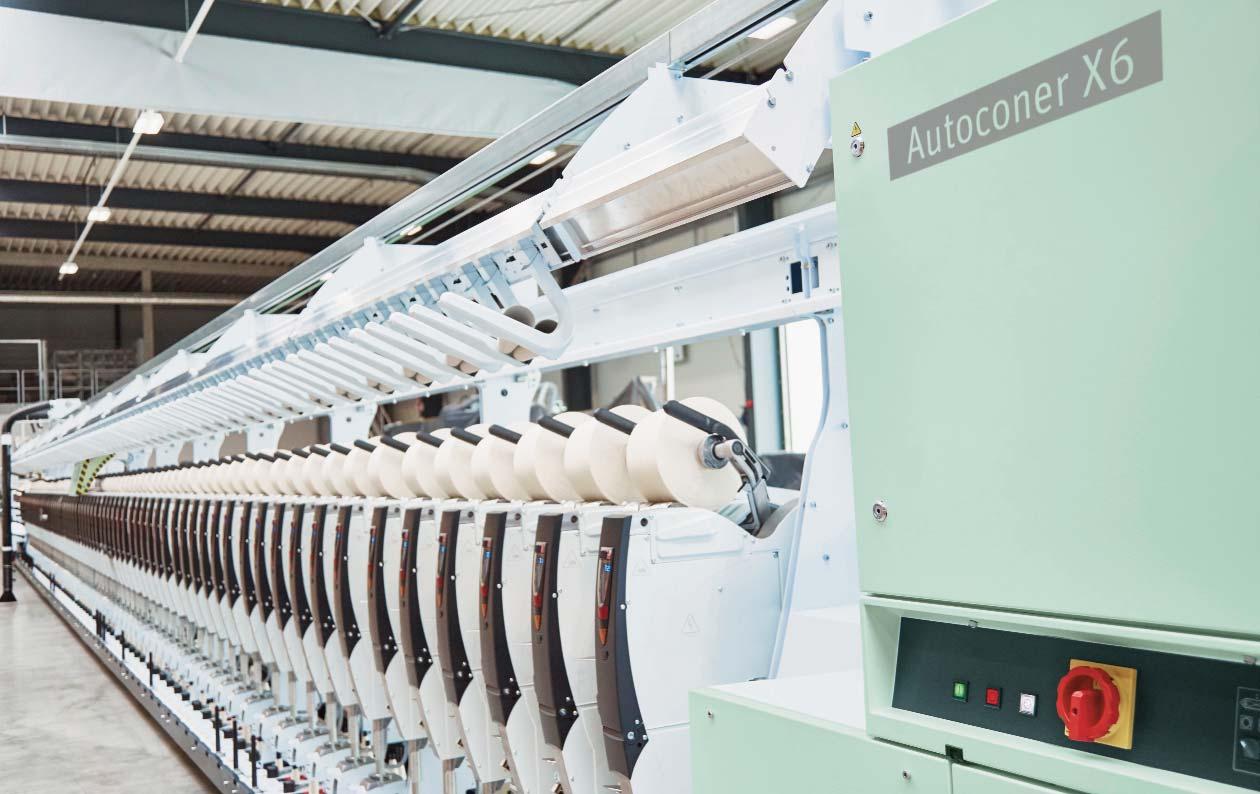
X6 is widely recognized for its outstanding productivity, intelligent process automation, excellent splicing and winding quality.

Rieter and Shanghai Digital Intelligence World Industrial Technology Group Co., Ltd. (DIW) have signed a purchase contract for more than 700 of the company’s winding machines Autoconer X6. This represents the largest order in the history of Rieter China. The agreement also strengthens the strategic partnership between the two companies that aims to develop state-of-the-art spinning operations and achieve unprecedented levels of quality, productivity and efficiency.
DIW has placed an order for more than 700 of Rieter’s winding machines Autoconer X6. The winding machine serves as the final quality assurance in the ring spinning and compact-spinning process and is key to the performance of subsequent process steps. With its outstanding productivity, intelligent process automation, excellent splicing and winding quality, the Autoconer X6 is widely recognized in the market.
The order will help DIW strengthen the vertical integration of its operations and accelerate its growth strategy in the cotton spinning industry, further underpinning its leading position in global markets. This order follows the initial batch placed in March 2024, when Rieter and DIW signed their first strategic
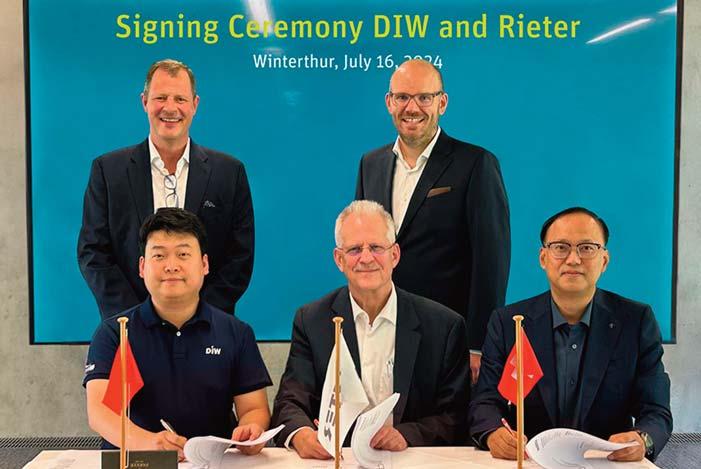
partnership to develop intelligent yarn manufacturing technology that utilizes digitization and automation to minimize conversion costs and maximize value for customers.
Liu Yifang, Vice Chairman, Shanghai Digital Intelligence World Industrial Technology Group Co., Ltd., says: “This partnership is a win-win for both companies. With our vertically integrated manufacturing operations, we are building some of the world’s most advanced spinning operations which will ideally position us for growth in this industry. Together we will further
enhance the overall operational efficiency of DIW, creating a major player in cotton spinning.”
Michael Hubensteiner, Country Managing Director Rieter China, says: “With its high performance winding machines, Rieter will help DIW meet its steadily growing demand and requirements for higher operational efficiency. The renewed cooperation will further amplify our shared strengths, position us to capture growth opportunities together and enable longterm and stable cooperation between Rieter and DIW.”
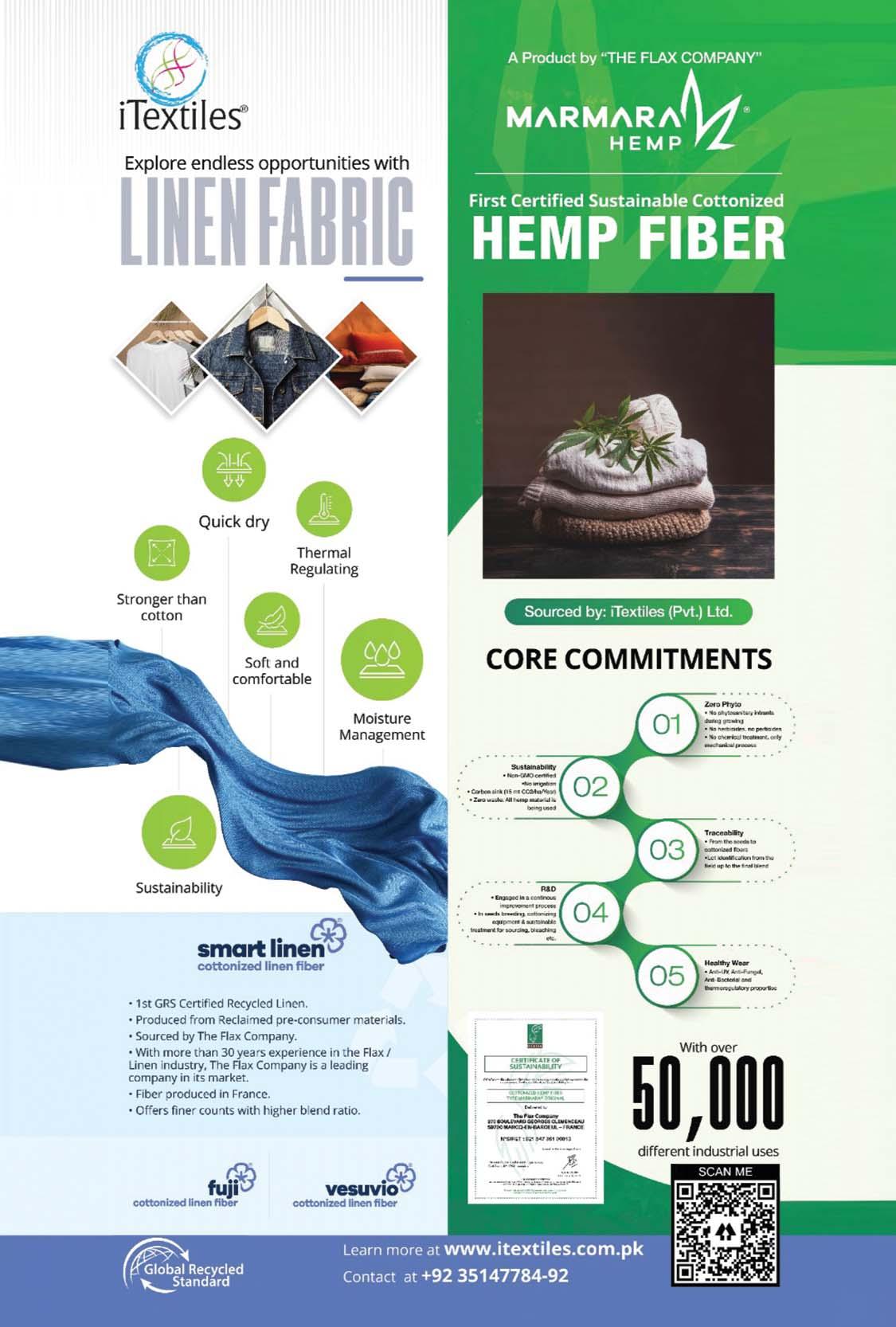

The U.S. Cotton Trust Protocol has today announced that Carhartt Inc. is the latest brand to join its sustainable cotton program. Carhartt, known for producing durable gear designed to serve and protect all hardworking people for more than 135 years, has chosen to join the Trust Protocol as part of its strategy to source more responsibly grown cotton.
“We pride ourselves on a history of manufacturing gear that is built to last from day one with the best and most durable materials available,” said Gretchen R. Valade, Director of Sustainability at Carhartt. “Becoming a member of the Trust Protocol enables us to continue our exploration into more responsibly sourced materials, which is the next step in our mission to leave a better world for the next generation of hardworking people.”
Carhartt’s Membership in the Trust Protocol will also provide transparency as the company works to gain greater insight into their supply chain by allowing
full traceability of the U.S. cotton in their gear.

Gretchen R. Valade, Director of Sustainability at Carhartt.
“Continuous improvement is a key part of our philosophy, which is why we’re eager to help our members work towards greater sustainability by providing measurable and verifiable farmlevel data, as well as traceability of the U.S. cotton they are sourcing,” said Daren Abney, Executive Director of the Trust Protocol. “We’re thrilled that we can support Carhartt on their own continuous improvement journey towards sourcing more sustainable cotton.”
The Trust Protocol is recognized by Textile Exchange and Forum for the Future, and part of the Cascale, Textile Exchange’s 2025 Sustainable Cotton

Abney, Executive Director of the Trust Protocol.
Challenge, Cotton 2040, and Cotton Up initiatives. It has also been published in the International Trade Centre Standards Map, recognized as a standard for sustainable cotton by the Partnership for Sustainable Textiles, approved as a standard for sustainable cotton by German Federal Government, and confirmed as an ISEAL Community Member.
To learn more about The Trust Protocol, visit TrustUSCotton.org.
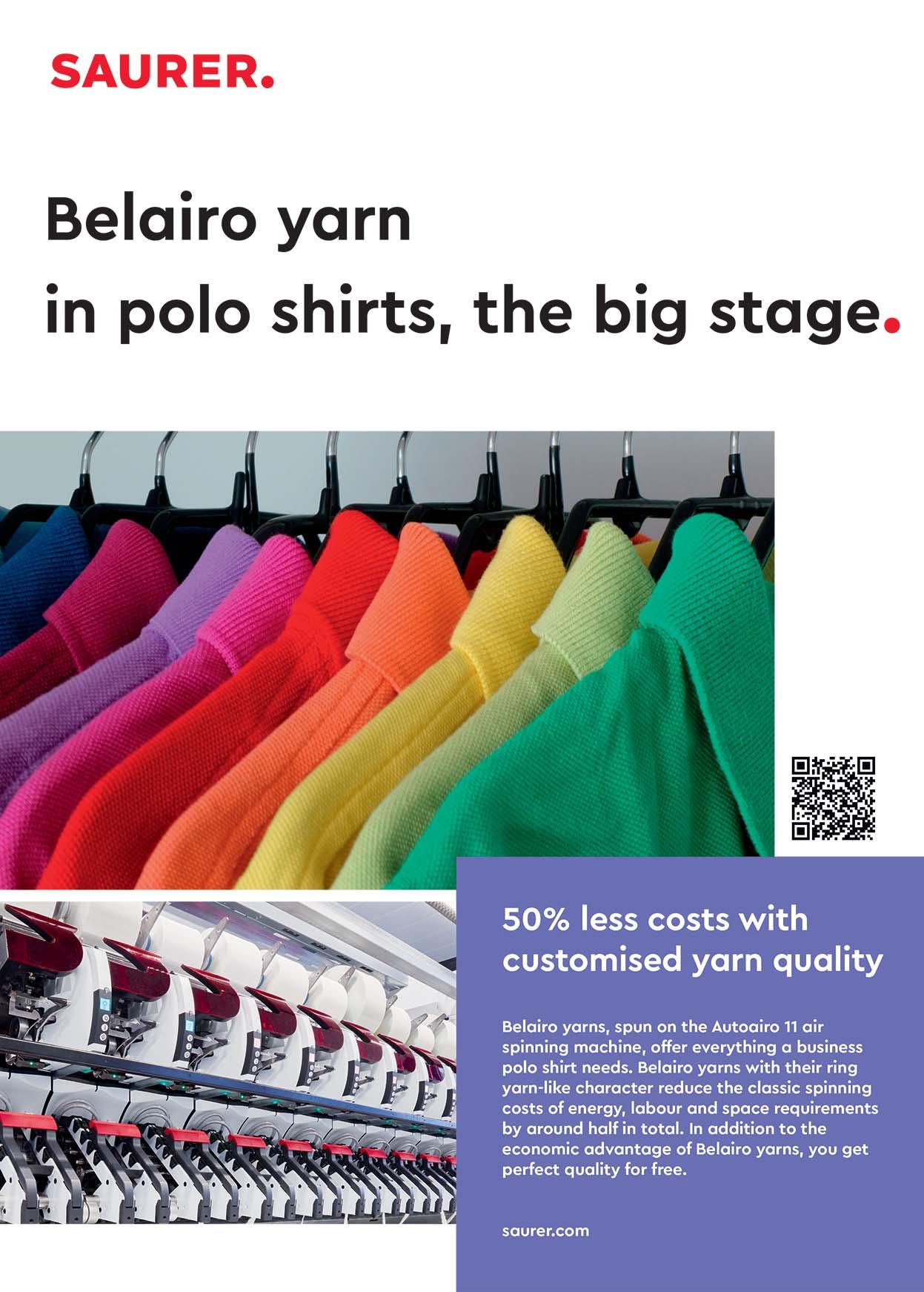


Customers will find Saurer at stand 91 at the Febratex exhibition in Blumenau, Brazil, from 20 to 23 August 2024. The latest spinning and twisting solutions with energy-saving features, digitalisation and automation will be presented by Saurer experts. In addition, Saurer also offers retrofit and upgrade solutions to further reduce energy consumption. See the Autoairo 11 air-spinning machine at 500 m/min on the booth.
During Febratex, Saurer looks forward to showcasing the Saurer machine portfolio which is perfectly suited to the needs of the South American textile market. Whether customers are looking for spinning preparation, roving frames, or flexible solutions in ring, compact, rotor and air spinning, the Saurer portfolio covers it all. Saurer offers a variety of options for the use of recycled fibres in all process steps of the spinning mill.
Saurer spinning and twisting machines guarantee maximum productivity with minimum manpower. This is the result of the automation features that are already built into the machines. In addition, Saurer offers a complete range of automation solutions that can be tailored to our customers' specific spinning and twisting requirements.
Saurer's Autoairo 11 air spinning machine sets new standards in productivity, automation and efficiency for economic air spinning and is now
processing cotton and cotton blends. The Belairo yarns produced on Autoairo 11 are an ideal choice for terry towels and polo shirts, but also for commodity yarns.
The new Zinser 51 is available as a ring- and compactspinning machine. Zinser 51 is designed to deliver excellent yarn quality, while being equipped with energy saving solutions and Texparts quality components.
With its focus on automation, digitalisation, and ergonomics, the Autocard SC7 enables mills to achieve more production and higher sliver quality with less manpower.
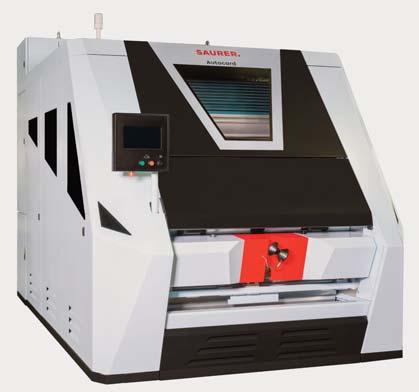
consumption, resulting in lower costs per kilogram of twist produced.”
The fully automated rotor spinning machine Autocoro 11 can process even the shortest fibres in the Recycling Xtreme version. The Autocoro 11 also offers additional 10% energy savings compared to Autocoro 10 and more powerful automation. The BD 8 semiautomatic rotor spinning machine is an ideal partner in the field of recycling spinning. Now BD 8 is supplied with up to 4 automatic doffer units (DU) and Twinsuction.
The latest developments in twisting will be explained by Saurer experts. The CompactTwister offers new standards in twisted yarn quality, is very flexible and robust, requires less space and is easy to maintain. With its twisting machines, Saurer focusses on reducing energy
Discover the latest Texparts product innovations for the textile industry: For ring-, compact- and rotor-spinning Texparts offers a lot of components: such as high-quality drafting arms, long-lasting rings and travellers and energy-saving Eshape spindles, which can save up to 6% energy.
Saurer offers retrofit and upgrade solutions to reduce the energy consumption of existing spinning machines, because every Watt that spinning mills can save matters to our planet. Upgrade and retrofit kits are also available for processing recycled fibres. The Saurer service experts will advise customers on retrofit solutions to extend the life of existing Saurer machines and implement new features at the same time.
Trützschler’s next-generation carding machine entered the market in Januar y 2024 – and it’s now convincing yarn manufacturers across the textile industry worldwide. The machines have achieved excellent results during tests with customers in Türkiye and in other countries. It achieved up to 40% higher productivity while reducing energy consumption by up to -18%.
Mayfil Tekstil is a leading company in the Turkish textile industry for the production of textured yarn. It is headquartered in Nilüfer/Bursa. Founded in 2005, it has grown rapidly by prioritizing customer satisfaction. In 2022, Mayfil invested in a modern vortex airjet spinning facility that can produce up to 35 tons per day. And the company was keen to take a close look at the TC 30Si for man-made fibers to explore its potential to drive progress toward Mayfil’s ambitious growth plans. In February 2024, Mayfil Tekstil conducted tests with the TC 30Si. The nextgeneration carding machine produced
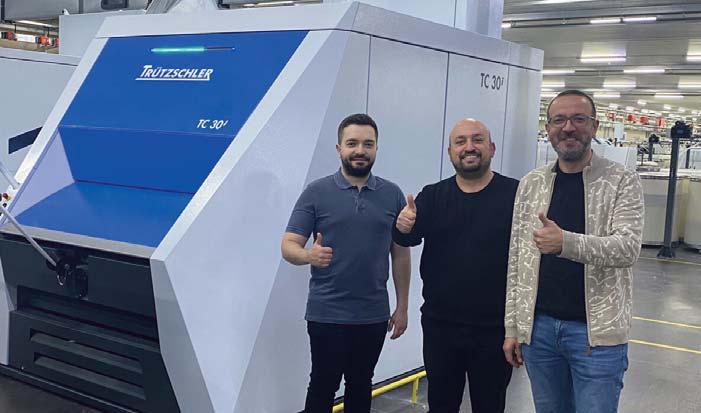
140 kg/h viscose, which is more than 40% higher than the 95 kg/h Mayfil produces with the current benchmark. The new carding machine also decreased electricity consumption by 18%. Based on these results, Mayfil is purchasing further TC 30i cards.
Results confirmed
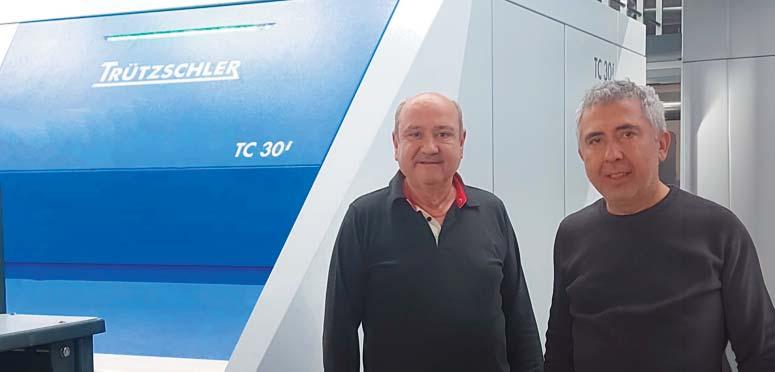
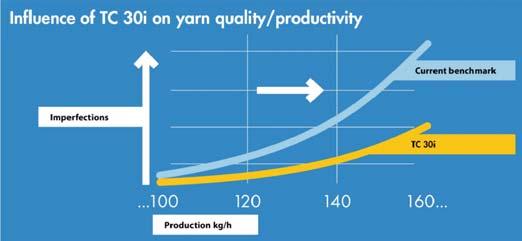
Göl Iplik Şeremet Tekstil Sanayi ve Ticaret A.S., located in Inegöl Bursa, operates three factories that deliver a variety of highquality products, with a specialization in blended yarns. Investment in modern equipment and pioneering new products that expand its portfolio are at the heart of Göl Iplik’s success across almost four decades. Göl Iplik also tested the TC 30Si for man-made fibers in early 2024. This Trützschler customer took a close look at the TC 30Si during rigorous viscose trials. The TC 30Si achieved a
40% higher productivity rate with the same level of quality, while consuming 15% less power. Göl Iplik now intends to include the TC 30i in its future investment strategy.
feedback
The TC 30i is still a newcomer in the textile industry – but its reputation is growing rapidly as spinning companies around the globe experience its range of smart features and functions. Its contributions to productivity, quality and resource efficiency are convincing. More and more companies around the world are now ordering our TC 30i. We are happy to convince more customers worldwide.
1) Best quality from any raw material: High levels of productivity and yarn quality thanks to 35% more active flats, the longest carding length in market and the T-GO automatic carding gap optimizer.
2) Operator-independent performance: Consistent results without relying on manual operators thanks to automatic, real-time optimization of the carding gap with T-GO.
3) Value-adding waste handling: Innovative waste suction system collects and separates different types of waste. More than 50% of card waste can be reused or sold to third parties for an attractive price.

by Prof. Engr. Zamir Ahmed Awan, Founding Chair GSRRA, Sinologist, Diplomat, Editor, Analyst, Consultant, Advisor, and Non-Resident Fellow of CCG.
China and Pakistan share a long-standing friendship rooted in mutual respect, close diplomatic ties, and strong political cooperation. Over the years, this relationship has evolved into a comprehensive partnership, particularly with the development of the China-Pakistan Economic Corridor (CPEC). CPEC has been a game-changer, transforming the traditional friendship between the two nations into a robust economic alliance. Among the many sectors poised to benefit from this enhanced cooperation, the textile industry stands out as a significant area of potential collaboration.
The Textile Sector: A Pillar of Economic Growth
Pakistan's textile industry is a cornerstone of its economy, contributing a substantial share to the country's GDP, employment, and exports. With a rich tradition in cotton production, a skilled labor force, and an optimal climate for growing cotton, Pakistan is wellpositioned to be a global leader in
textiles. However, to fully realize its potential, Pakistan needs to modernize its textile sector, adopt advanced technologies, and expand its market reach.
China, as the world's largest textile producer and exporter, offers Pakistan the perfect partner for this endeavor. China's expertise in textile manufacturing, coupled with its technological advancements, can provide the necessary support for Pakistan to upgrade its textile industry. The synergy between China's technological prowess and Pakistan's raw material resources creates a unique opportunity for both countries to collaborate for mutual benefit.
The Potential for Collaboration and Cooperation
1. Technological Advancement: One of the most significant areas of potential cooperation lies in technology transfer. China can help Pakistan modernize its textile mills by providing advanced machinery and training programs. This
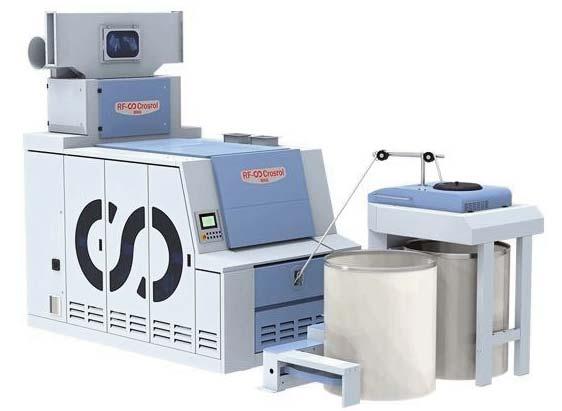
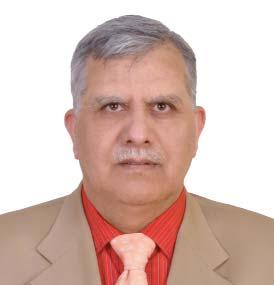
collaboration can lead to improved production efficiency, higher-quality products, and a more competitive position in global markets.
2. Investment in Infrastructure: Under CPEC, there is immense potential for developing special economic zones (SEZs) focused on textiles. These zones could attract Chinese investment in textile manufacturing, creating jobs, boosting exports, and contributing to Pakistan's overall economic growth.
3. Enhancing Trade Relations: The existing trade relations between China and Pakistan in the textile sector are strong, with Pakistan importing textile machinery and raw materials from China, while exporting cotton yarn and fabrics to the Chinese market. Strengthening these trade ties and reducing barriers could further enhance bilateral trade, opening up new opportunities for both nations.
4. Joint Ventures and R&D: Establishing joint ventures and conducting collaborative research and development (R&D) in the textile sector can lead to innovations that benefit both countries. This could include developing new fabrics, improving sustainability practices, and optimizing production processes.
5. Expanding Market Access: China, with its vast domestic market and global influence, can help Pakistan gain access to new markets for its textile products. By leveraging China's global trade networks, Pakistan can diversify its export destinations and reduce its reliance on traditional markets.
The potential for China-Pakistan cooperation in the textile sector is vast and promising. By building on their warm friendship, close diplomatic ties, and the transformative impact of CPEC, both

countries can create a win-win partnership that drives economic growth, fosters innovation, and enhances global competitiveness. The textile sector, in particular, stands to benefit immensely from this collaboration, with the potential to become a key driver of prosperity for both nations.
As China and Pakistan continue to strengthen their economic ties, the textile sector will undoubtedly play a central role in this partnership, contributing to the shared vision of development, progress, and mutual benefit.
Pakistan's textile industry is a vital component of its economic landscape, contributing approximately 8.5% to the national GDP and accounting for more than 60% of the country’s total exports. The industry employs over 15 million people, making it the largest employer in the country after agriculture. Pakistan is among the top five cotton producers in the world, and its textile products are known for their quality, particularly in markets such as the United States, Europe, and China.
Despite facing challenges such as energy shortages, fluctuating cotton prices, and competition from regional players, Pakistan’s textile industry has shown resilience. The government’s supportive policies, including incentives for exports, subsidized energy tariffs, and tax exemptions, have helped the industry to sustain and grow.
1. Abundant Cotton Production: Pakistan is blessed with an optimal climate for cotton cultivation, making it one of the leading cotton producers globally. The availability of raw materials locally gives the textile industry a competitive edge, reducing reliance on imports and ensuring a steady supply chain.
2. Skilled Labor: Pakistan boasts a large pool of skilled labor with generations of experience in textile production. The expertise in spinning, weaving, dyeing, and garment manufacturing has been passed down through generations, ensuring highquality production.
Source: State Bank of Pakistan - Annual Reports.
3. Export Tradition: Pakistan has a long-standing tradition of exporting textiles. From yarn to finished garments, Pakistani textiles are well-regarded in international markets for their quality and competitive pricing.
4. Strategic Location: Located at the crossroads of South Asia, Pakistan has easy access to key international markets, including Europe, the Middle East, and East Asia. This geographical advantage facilitates trade and export operations.
5. Government Support: The Pakistani government has implemented policies to support the textile sector, including subsidies, tax relief, and favorable trade agreements. These measures have helped the industry to remain competitive on the global stage.
A significant boost to Pakistan’s textile sector has been the Generalized System of Preferences (GSP) status granted by the European Union. This status allows Pakistan to export its goods, including textiles, to European markets at reduced or zero tariffs. The GSP status has provided Pakistani textiles with a competitive advantage in one of the world’s largest markets, increasing export volumes and revenues.
The GSP status has not only opened doors to new opportunities but has also encouraged the industry to focus on improving quality and compliance with international standards. This, in turn, has made Pakistani textiles more attractive to global buyers. The increased demand from Europe has led to higher production levels, more job creation, and a positive impact on the overall economy.
ITMA ASIA and CITME are two of the most prominent organizations in the global textile machinery industry. ITMA (International Textile Machinery Association) was established in Europe, known for hosting major textile machinery exhibitions. CITME (China International Textile Machinery Exhibition) was launched to promote textile machinery innovations in China. These two exhibitions merged in 2008 to create ITMA ASIA + CITME, a unified platform that showcases the latest advancements in textile machinery and promotes collaboration within the global textile industry.
The upcoming ITMA ASIA + CITME 2024 will be held from 14-18 October in Shanghai, China. It is expected to attract thousands of participants, including manufacturers, entrepreneurs, suppliers, and buyers from all over the world. This mega event will feature over 1,600 exhibitors and attract more than 100,000 visitors from over 120 countries. Covering an exhibition area of 180,000 square meters, the event ranks among the largest and most influential in the global textile machinery industry.
The event will showcase the latest technological innovations, including advanced machinery, automation, smart manufacturing solutions, and sustainable technologies, creating a platform for global collaboration and business expansion.
Pakistani entrepreneurs in the textile sector are urged to attend ITMA ASIA + CITME 2024 to explore new business opportunities, collaborate with international partners, and enhance their

global market share. Participation in this event offers an excellent opportunity for Pakistani companies to stay updated on the latest trends, discover innovative machinery, and forge valuable connections that can boost their business and contribute to the growth of Pakistan's textile industry.
The future of Pakistan’s textile industry is promising, with opportunities for growth and expansion in both domestic and international markets.
1. Technological Upgradation: With investments in modern machinery and technology, the industry is moving towards greater efficiency and productivity. This will enable Pakistani textile manufacturers to compete more effectively on the global stage.
2. Diversification of Products: There is a growing trend towards diversification within the textile sector. Expanding into technical textiles, high-value-added products, and sustainable fabrics will open new avenues for growth and export.
3. Sustainable Practices: With increasing global demand for sustainable and eco-friendly products, Pakistan's textile industry is focusing on adopting green practices. Investments in organic cotton production, energy-efficient machinery, and waste management systems will enhance the industry's reputation and market share.
4. Market Expansion: With the recent establishment of new trade agreements
and better access to international markets, Pakistan's textile exports are expected to grow. The China-Pakistan Economic Corridor (CPEC) offers additional opportunities for the textile sector by improving infrastructure and logistics, further enhancing export potential.
5. Human Capital Development:
Continued investment in skill development programs will ensure that the workforce remains competitive and capable of producing high-quality textiles that meet international standards.
The textile industry’s contribution to Pakistan’s economy cannot be overstated. It is a major source of foreign exchange earnings, a key driver of industrialization, and a significant provider of employment. The sector's growth directly impacts poverty alleviation, rural development, and women's empowerment, as a large portion of the workforce is comprised of women.
The continued success and expansion of the textile industry will play a vital role in Pakistan’s overall economic growth, reducing unemployment, increasing export revenues, and improving the living standards of millions of Pakistanis.
Global Share and Contribution
Pakistan’s textile industry has established a strong presence in the global market, particularly in cotton yarn and fabric. The country ranks among the top textile exporters in the world, supplying quality products to renowned
brands and retailers. As the industry continues to modernize and adapt to global trends, its contribution to the global textile market is expected to grow.
The textile industry is the backbone of Pakistan's economy, contributing significantly to its GDP and providing employment to millions. On the other hand, China, as the world's largest textile producer and exporter, has established itself as a global leader in this field. The synergy between these two textile giants has already begun to bear fruit.
China has been a significant source of raw materials, machinery, and technology for Pakistan's textile industry. Chinese textile machinery, known for its efficiency and innovation, is widely used in Pakistani factories, helping to improve production quality and reduce costs. Additionally, Chinese investments in Pakistan's textile sector have facilitated the modernization of mills and the adoption of new technologies, further enhancing Pakistan's textile capabilities.
Imports from China: Pakistan imports a wide range of textile-related goods from China, including synthetic fibers, yarn, and fabrics. These imports are crucial for Pakistan's textile industry, as they help fill the gaps in local production and ensure a steady supply of highquality materials. The availability of these raw materials at competitive prices has allowed Pakistani textile manufacturers to produce diverse and high-quality
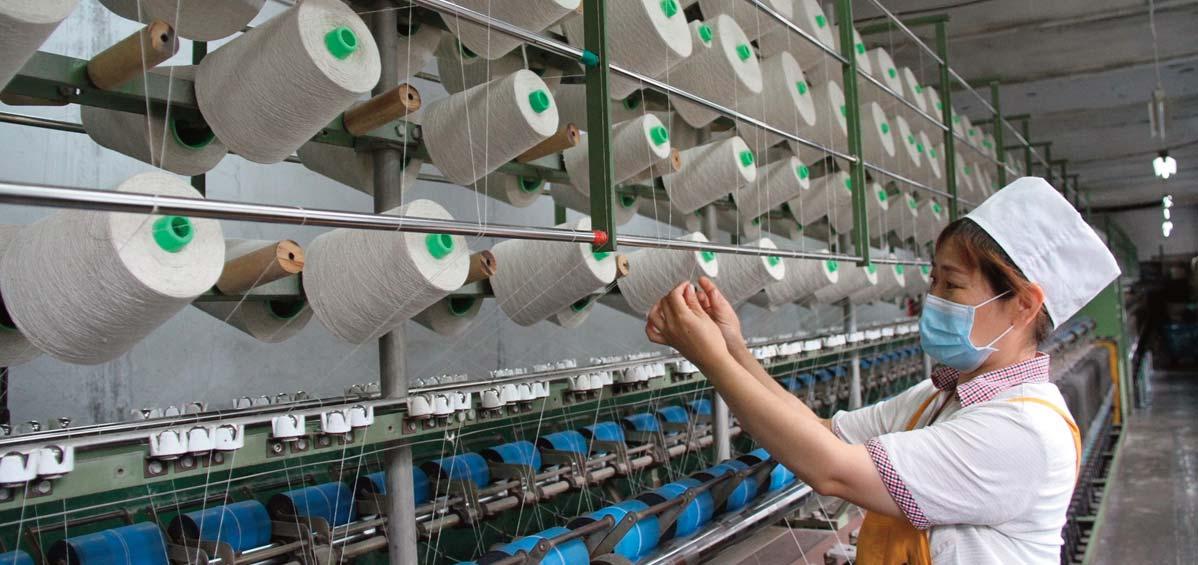


products that meet international standards. Moreover, the import of advanced Chinese textile machinery has significantly improved the efficiency and productivity of Pakistan's textile mills, enabling them to compete more effectively in the global market.
Exports to China: On the other side of the trade relationship, Pakistan exports a substantial amount of its textile products to China, including cotton yarn, woven fabrics, and garments. China's large and growing consumer market presents a significant opportunity for Pakistani textile exports. The demand for Pakistani cotton yarn and fabrics in China has been consistently high, reflecting the strong complementarity between the two countries' textile sectors. By capitalizing on China's vast market, Pakistan can further boost its textile exports, contributing to the overall growth of its economy.
Moreover, under the framework of the China-Pakistan Economic Corridor (CPEC), several textile-related projects have been initiated. These projects include the establishment of special economic zones (SEZs) that provide an attractive environment for Chinese textile companies to set up manufacturing units in Pakistan. This cooperation not only strengthens Pakistan's textile industry but also helps China diversify its production base and reduce labor costs.
To fully realize the potential of ChinaPakistan cooperation in the textile sector, a strategic and comprehensive approach is necessary. Here are some concrete recommendations for both countries:
1. Establish a China-Pakistan Textile Cooperation Task Force: This task force should consist of government officials, industry experts, and business leaders from both countries. Its primary objective would be to identify key areas for collaboration, monitor progress, and address any challenges that arise. Regular meetings and consultations can ensure that both sides are aligned in their goals and strategies.
2. Launch Joint Ventures and Training Programs: Chinese and Pakistani textile companies should be encouraged to form joint ventures that combine Chinese
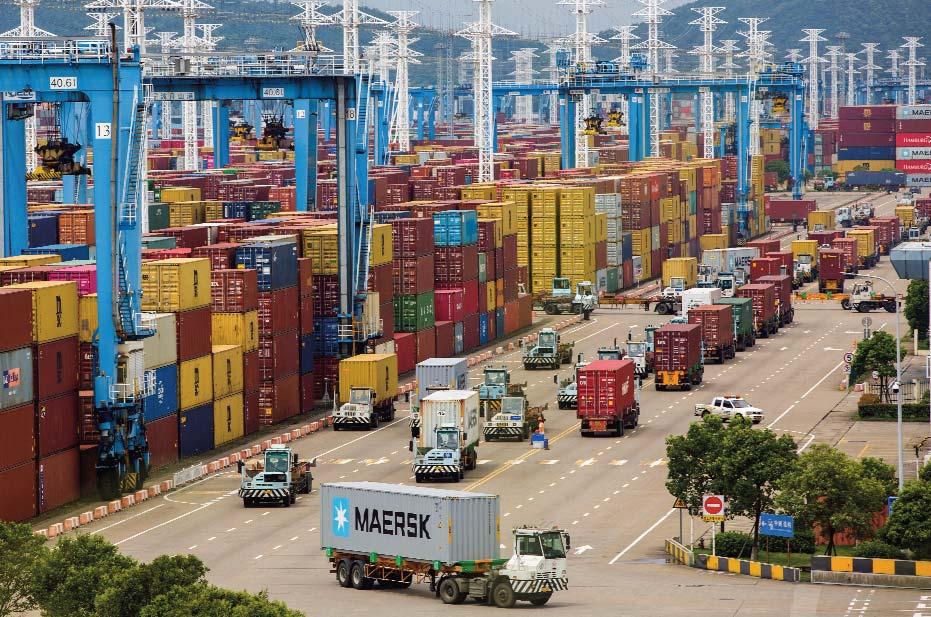
technology with Pakistani expertise. Additionally, training programs and workshops should be organized to upskill Pakistani workers and entrepreneurs, enabling them to effectively use advanced machinery and adopt modern textile practices.
3. Develop Special Economic Zones (SEZs) for Textiles: Under CPEC, more SEZs dedicated to textiles should be developed in Pakistan. These zones can provide a conducive environment for Chinese textile companies to set up manufacturing units, benefiting from Pakistan's lower labor costs and access to raw materials. In return, these SEZs would create jobs, boost exports, and contribute to Pakistan's economic growth.
4. Promote Bilateral Trade and Market Access: Both governments should work together to facilitate bilateral trade in textiles. This can be achieved through trade agreements that reduce tariffs, simplify customs procedures, and eliminate non-tariff barriers. Additionally, joint marketing efforts can be undertaken to promote Chinese and Pakistani textiles in new markets, particularly in regions where Chinese influence is strong.
5. Focus on Sustainability and Innovation: China and Pakistan should prioritize sustainable practices in the textile sector. This includes investing in green technologies, promoting organic cotton farming, and reducing the environmental impact of textile production. Collaborative R&D initiatives can lead to innovations that make textile manufacturing more efficient, sustainable, and globally competitive.
China-Pakistan cooperation in the textile sector holds immense promise for both countries. By leveraging their respective strengths—China's technological prowess and Pakistan's rich cotton resources—both nations can create a win-win partnership that drives economic growth, creates jobs, and strengthens their global competitiveness.
The significant imports of raw materials and machinery from China, along with the steady export of highquality textile products to China, highlight the robust trade relationship between the two nations. As this partnership deepens, both countries stand to benefit from increased market access, enhanced production capabilities, and shared innovations.
As the textile industry continues to evolve, the collaboration between China and Pakistan will be crucial in addressing the challenges and seizing the opportunities that lie ahead. By deepening their cooperation, investing in innovation, and promoting sustainable practices, China and Pakistan can ensure that their textile industries remain at the forefront of global trade, contributing to mutual prosperity and development.
The way forward is clear: with strategic planning, joint efforts, and a shared vision for the future, China and Pakistan can elevate their textile partnership to new heights, benefiting not only their own economies but also contributing to the global textile industry.

Founded by Mr. Fong Sou Lam in 1963, CHTC Fong's International Co., Ltd. has principally focused on the business of designing, developing, manufacturing and selling of textile dyeing and finishing machinery. Starting from 1969, the business has been carried on under the name of Fong’s National Engineering Co.,Ltd., and is one of the first Hong Kong companies to explore the giant textile dyeing and finishing market in China. It is a key turning point for the group’s future development.
In 1990, CHTC Fong’s International Co., Ltd. was the first company of its kind in the industry publicly listed on the Stock Exchange of Hong Kong. To accommodate the need of major raw materials for its manufacturing business, the group also set up the stainless steel trading and stainless steel castings manufacturing businesses. Now the group has 14 subsidiaries with approximately 3,517 employees serving over 6,000 customers worldwide. Each year, CHTC FONG’S INT produces more than 2,000 dyeing and finishing equipment of excellent quality and performance for the customers worldwide. Up till now, the group has accumulatively supplied around 35,000 sets of dyeing and finishing equipment for the global market. It serves to promote the continuous development and upgrading of the textile dyeing and finishing industry in China, or even in a larger global economic scope. It can be put that CHTC FONG’S INT's growth illustrates the history of China’s textile dyeing and finishing industry in the past half century.
CHTC Fong's Group's merger with China Hi-Tech Group Corporation (CHTC) took place in June 2011. Since then, CHTC Fong's INT Group has become the core business in CHTC’s dyeing and finishing machinery segment, greatly contributing to CHTC’s comprehensive competitiveness in dyeing
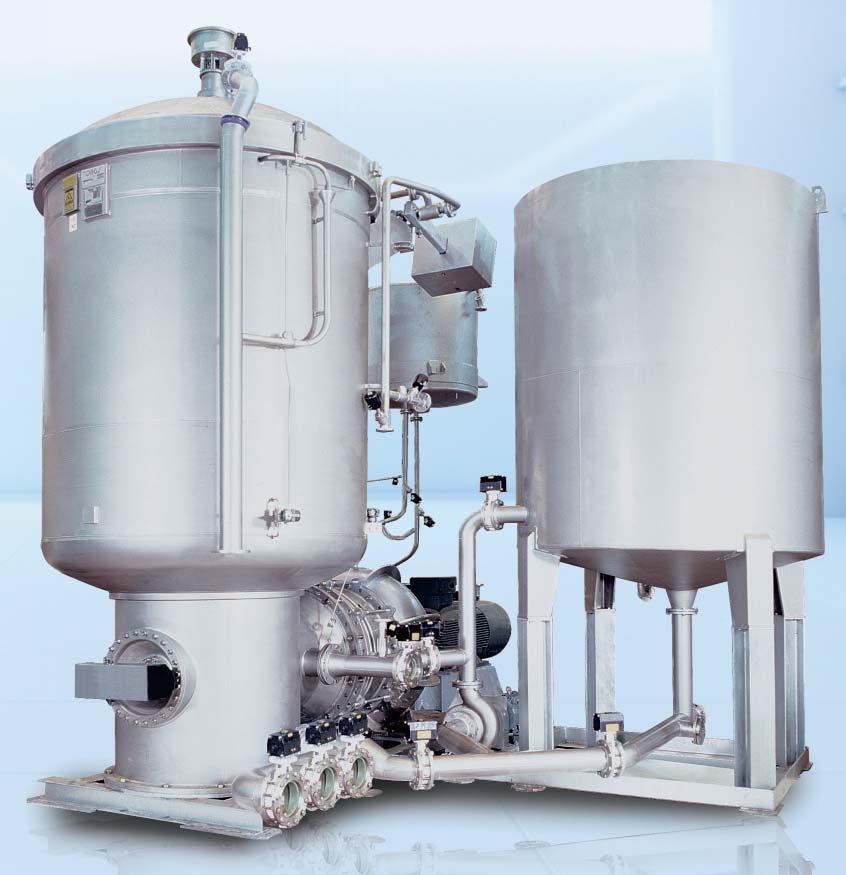
and finishing machinery industry. On the other hand, CHTC, as the largest textile machinery supplier in the world, will strive to further enhance CHTC FONG’S INT market position and brand influence by offering powerful support for the Group’s future development, achieving economy of scale in operation and further strengthening its own competitiveness in the dyeing and finishing machinery industry.
FNECL, Monforts Fong’s, Xorella, THEN, Goller, FWT and Monforts are the leading brands under CHTC FONG'S INT, and also the renowned labels in the global textile industry. By organically integrating those brands, the Group is proud to provide the “one-stop” complete solution and equipment in the
range of “pre-treatment, dyeing, posttreatment and waste water recycling”.
Allwin Plus high temperature package dyeing machine
The essential dyeing machine for modern dyehouse in 21st century. In concern with the environment and energy saving, Fong’s gives you the Allwin Plus, with extra single-flow controls from traditional Allwin Dual-Flow Dyeing. The revolutionary wave dyeing technique and intelligent control reduce the liquor ratio ever low to 1:4. primary built with 316ti/1.4571 stainless steel of european standards, Allwin Plus empowers your production to the leading edge of efficiency and Eco-Friendliness.

The Liquor flow scenario for Dualflow: Outside-In flow process is inevitable during a Dual-flow operation, thus dye liquor has to diffuse into the packages through its outside surface, passing through the spindles, reversal device, heat exchanger and finally to the pump. It is necessary for all the packages and fasteners to be immersed under water level to prevent air suction through the exposed packages outside surface, otherwise it will cause pressure difference and unsteady flow which affect the dyeing result.
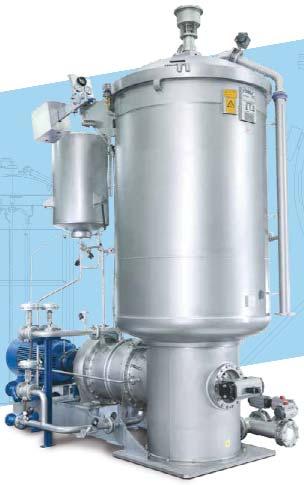
The Liquor flow scenario for Single Inside-out Flow: On the other hand, during an Single Insideout Flow process, dye liquor discharged from the pump enters the heat exchanger and reversal device, passing through carrier and spindles, then reaches the packages and diffuses towards surface outside. It is required only a sufficient water level at the kier bottom to maintain steady pump operation and not necessary to have all packages immersed with liquor.
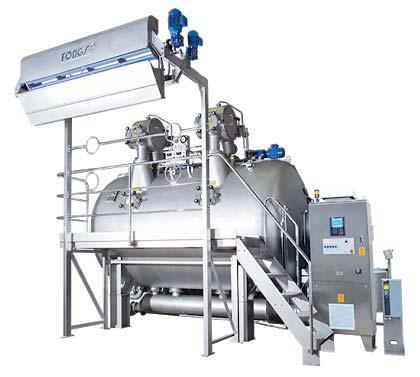
Owing to the reversal function on traditional yarn dyeing machines, the packages could be expanded and contracted by pressure changes during switch of flow, hence increasing the effectiveness and evenness in dyeing. Since the single flow concept has no switchable feature, the pump should vary its speed to generate pressure difference according to specific principles.
By executing a specific period of change in pump frequency, smashing the packages like waves such that it could move under differentiating pressure would lead to perfect utilization the advantage of dual flow concept, in a much lower demand of water and electricity.
Our latest generation program controller - FC30EX is equipped with a 6.5-inch, 640x480-pixel, TFT color LCD display. Together with novel control functions, it is the most cost-effective control. FC30EX can also integrate with our Viewtex and THEN-TDS central computer system, providing a comprehensive control management.
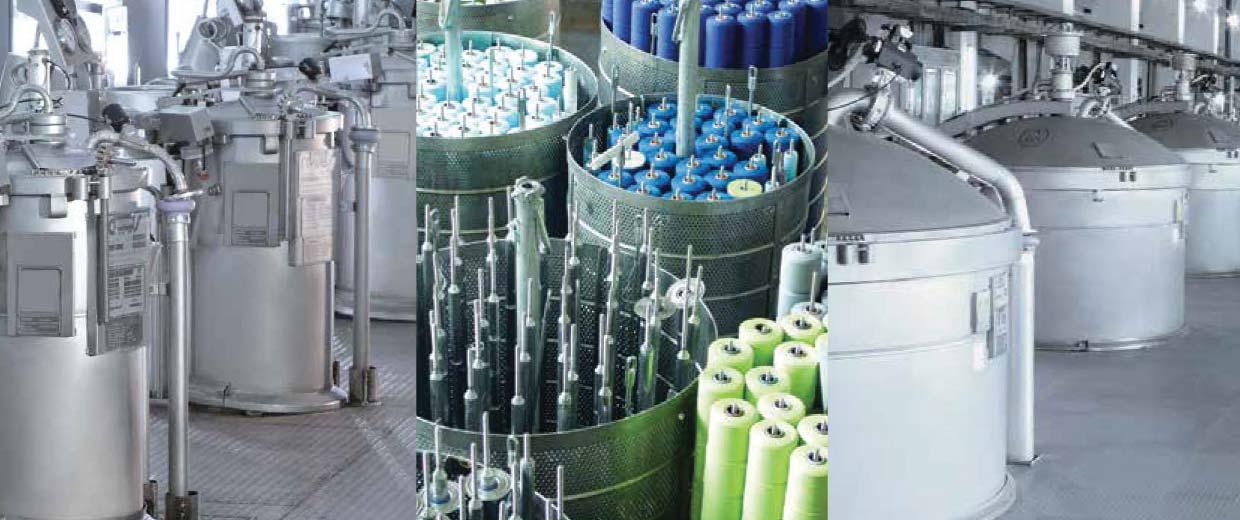



Zhejiang Rifa Textile Machinery Co., Ltd. is founded in August, 2002 with a registered capital of 69.487 million yuan. The company is one of the national key hightech enterprises of the China’s textile industry, a key enterprise of China’s machinery industry, demonstration enterprise of both China National 863 Planning CIMS Engineering and National CAD Application Engineering, a hightech enterprise of China National Torch Plan, vice president unit of China Textile Machinery Association. RIFA Company now has three subsidiaries under it, namely Shandong Rifa Textile Machinery Co., Ltd., Anhui Rifa Textile Machinery Co., Ltd. and Zhejiang Rifa Textile Machinery Tech Co., Ltd.
With the vision of “becoming an agile and international company” and the mission of “Providing users with intelligent textile equipment system solutions, and helping users gradually realize the dream of a digital factory”, Zhejiang Rifa Textile Machinery Co., Ltd. is devoted to the area of “digital technology” in mechanical and electrical industry, and has become a well-known textile equipment manufacturer with excellent reputation at home and abroad. For over twenty years, the company has successfully developed five solutions such as spinning, Fibre Preparation, weaving,
non-woven and printing and dyeing , including blow-room machine, draw frame, rotor spinning machine, air jet vortex spinning machine, two-for-one twister machine, twister machine for tire cord, false-twise texturing machine precise winding machine( precise rewinding machine), automatic warp drawing machine, air jet loom, water jet loom, rapier loom, terry towel loom, specific loom, circular knitting machine,seamless knitting machine, hosiery machine, waterless decorating machine and non-woven equipment etc hundreds of machines... The products have been distributed to all areas around China and sold to more than 30 foreign countries and regions with a leading market share in each respective industry.
RIFA is devoting itself to create a whole new theory of digital technology, establishing an interactive platform of “people flow, material flow and information flow”, realizing harmony and unity of science and technology, environment and manufacturing, and aiming to become a manufacturing base of “informatization, agility and internationalization”.
Incorporated in 2009, Zhejiang Rifa Textile Machinery Tech Co., Ltd. is a wholly-owned subsidiary of RIFA. The company's main products include circular
knitting machine, hosiery machine, seamless underwear machine, two-forone twister machine, twister machine for tire cord, false-twise texturing machine, precise doubling machine(precise rewinding machine) and waterless decorating machine. The company has inherited professional experience of over 20 years in RIFA, and is committed to becoming the world R&D and manufacturing base of intelligent highend textile machinery and equipment.
Direct Twisting Machine for Tire Cord is a one-time merging using a single processing, which reduces the number of steps compared with the traditional twisting method. So the yarn capacity is also more compared to the two-for-one twister machine. This increases production efficiency, reduces labor, and reduces energy consumption. At the same time, due to the reduction of the processing, the wear (strong loss) is correspondingly reduced, which is more suitable for the high strength requirement of Tire Cord. lt has become the most suitable professional machine for producing high quality yarns such as tire cord, industrial yarns and carpet threads. This direct twisting machine is designed and developed by our company for the relevant process requirements.


China Texmatech Co., Ltd (CTMTC), established in 1984, is the largest enterprise in China specialized in the import and export of textile machinery and technology. CTMTC was originally affiliated to China Textile Industry Ministry, in 1998, it became the key enterprise of China Hi-Tech Group Corportation (CHTC). By introducing the China's biggest textile machinery manufacturer JINGWEI as shareholder in 2004, CTMTC started a full-scale strategic cooperation with JINGWEI and began to provide more comprehensive and reliable services.
CTMTC focuses its business on many fields such as the import and export of textile machinery and the whole set equipment, textile technology, textile products, garments, and textile raw materials; engineering contracted, investment etc. Since its foundation, the company has made outstanding achievements with its good service, personnel training and strengthened management in order to enhance the main business of textile machinery. For years, CTMTC has ranked among China's top 500 enterprises which have the largest total volume of imports and exports. Up to now, it has contributed a total value of more than US$3 billion of imports and exports to China's textile industry. thus enjoying a high reputation on market at home and abroad.
CTMTC has always aimed to provide service in the way of "Being honest,
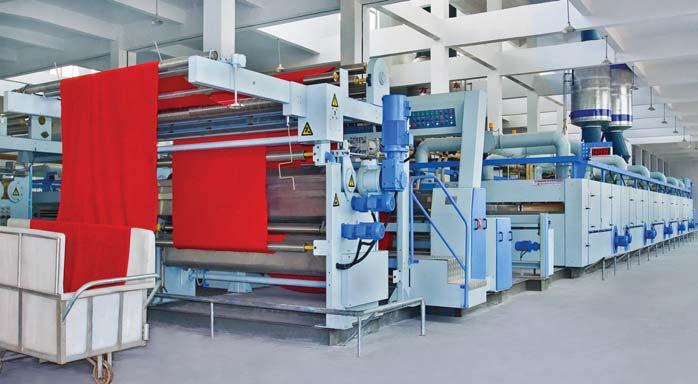
customer the highest", and strictly executes the ISO 9001 guiding principles for quality. Extensive trade partnership and cooperation have been established with more than 50 countries and regions in the world on the basis of equality and mutual benefit.
The business scope of import and export of textile machinery and technology covers cotton spinning, wool spinning, flax spinning, silk, chemical fiber, knitting, printing, dyeing and many other fields. In the 21st century with economic globalization and full of opportunities and challenges, based on broad marketing network and continuous improvement on service, CTMTC commits itself to offering systematic scientific and effective solutions for the textile market.
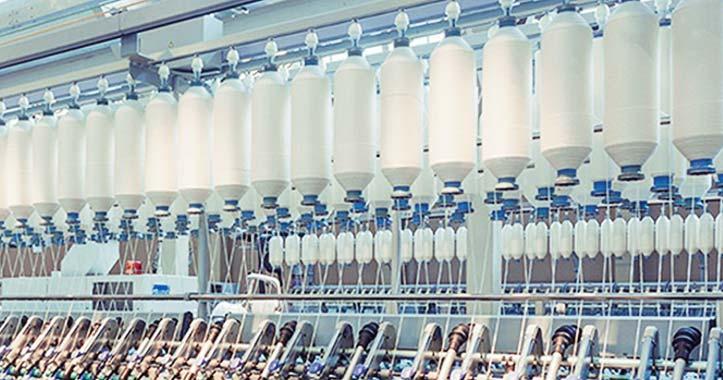
CTMTC provides complete equipment of cotton spinning, weaving, knitting, twisting, nonwovens, chemical fiber, dyeing & finishing and textile components. With overseas sales and service network, we render clients with superior, convenient and speedy services.
CTMTC is mainly engaged in importing textile raw materials, selling industrial textiels and textile products & garments, the import volume of cotton yarn & fabric & linter is ranked top in China for a long time. CTMTC is also the agent of textile fibers of the Lenzing Group in North China.
CTMTC contracts with overseas engineering projects, provides surveying, designing, consulting, equipment offering, transporting, installing, test run and commissioning services in textile engineering projects and environmental engineering projects.
CTMTC carries out overseas investment and foreign economic & technical cooperation, undertakes foreign aid projects, expands business on resource products worldwide, and develops international market for the products of CHTC Group such as vehicle, generator set, agricultural machinery, etc.

Mayer & Cie. presented an overview of its current portfolio in the circular knitting sector at the ITM in Istanbul. Two machine types – the SF4 3.2 III and the Relanit 3.2 HS II – and various smart solutions that make circular knitting more efficient were on display.
“In line with the current market situation, we went to ITM with subdued expectations,” says Benjamin Mayer, Managing Partner of Mayer & Cie. “As expected, visitor numbers fell short of those of 2022. Nevertheless, we have received positive feedback on our new developments. Our smart solutions are of particular interest to large knitting mills and fully integrated companies.”
Making the tried and tested even better: Relanit 3.2 HS II
The Relanit 3.2 HS mechanical single jersey machine offers high productivity, especially in the context of elastic plating. It processes a wide range of yarns and qualities extremely reliably. It is therefore particularly suitable for processing recycled yarns. Their energy consumption is up to a third lower than that of a circular knitting machine with conventional technology.
In Istanbul, Mayer & Cie. presented an updated version of its flagship, the Relanit 3.2 HS II. The new open width take-down is the single component that attracted the most interest. It ensures a uniform pull-off tension of the knitted fabric over its entire circumference. The knitted hose is only opened below the take-down rollers. Furthermore, the takedown is equipped with two drives: one for tensioning, one for rewinding. Both can be controlled separately.
Another innovation of the Relanit 3.2 HS is aimed at reducing downtimes: The needle with predetermined breaking point, which was developed together with Groz-Beckert, prevents it from breaking uncontrollably and, in the worst case, from breaking needle feet. The new spring sinker is also a joint development with Groz-Beckert. This makes the Relanit 3.2 HS II work more smoothly, with lower noise and less wear and tear.
“Overall, the demand for single jersey knitted fabrics is currently low, which was also evident again in Istanbul,” says

Benjamin Mayer. “However, this is no reason for us not to further develop popular machines. After all, experience shows how quickly trends can change.”
With its SF4-3.2 III, Mayer & Cie. is addressing a trend in the clothing industry that is reflected beyond Turkey: lightweight, elastic three-thread fleece fabrics in both pure cotton and blends. The machine impressed at the ITM with its excellent plating ability, which saves time and costs when finishing the fabrics.
Both ITM exhibits were on display with the new Control 5.0 machine control system. Control 5.0 is a prerequisite for using knitlink, the hub for Mayer & Cie’s digital applications. In this function, the machine control system attracted interest from various large customers.
In the standard SmartControl version, as shown in Istanbul, a so-called Smart Knob is attached to each machine foot. From there, all the functions that the machine operator needs for his work are available. More in-depth settings, such as those made by the knitting manager, are only possible from a mobile device. Any number of Mayer & Cie. machines can be operated from this at the same time.
All machines built from 2001 onwards can be retrofitted, and selected new machines will be equipped with the new generation of machine control systems from 2024.
knithawk: Recognizing knitting mistakes at an early stage
knithawk, a tool for optical defect detection, inspects the knitted fabric as it is created. It sits in the single jersey machine directly at the knitting point. If knithawk detects a serious or recurring error, the machine is stopped. The tool also creates an error log.
“knithawk helps us save resources such as water, natural fibers and polyester,” says Axel Brünner, Senior Product Manager at Mayer & Cie. “Realtime defect detection prevents many meters of defective fabric from forming in the first place.”
With its upgrade kits, Mayer & Cie. brings technological innovations to existing machines. These range from machine-specific upgrades, such as the Performance Kit for existing Relanit 3.2 models to the Senso Blue RS lubrication system.
In addition to the upgrade kits, Mayer & Cie. offers conversion kits for popular machine types. Two are currently available: for the MV4 3.2 II/MBF 3.2 and the S4-3.2 II/ SF4-3.2 III.
“Thanks to our long-standing representative Mayer Mümessillik, our Turkish customers can rely on competent and fast support – whether it is support for the conversion of a machine, digital solutions or the installation of new machines,” concludes Benjamin Mayer.

Picanol, a globally known weaving machinery producer and developer, came together with Turkish and worldwide textile professionals at ITM 2024. The latest weaving technologies attracted the great attention of visitors, especially the all-new Ultimax rapier weaving machine at the company’s booth. Kurt Lamkowski, Worldwide Sales Manager at Picanol Group commented on ITM 2024; “We look back at a successful participation at ITM 2024. It is always a pleasure for us to meet and connect with our customers in person. Although we experienced fewer visitors compared with the previous edition, the visitors we met had a real interest and concrete projects to discuss.”
Lamkowski stated that their customers and visitors from the domestic Turkish market were the significant majority at the exhibition, but they have enjoyed a lot of interest from Iranian customers as well. “Other countries like Uzbekistan, Pakistan and Egypt were also present. Regarding the segments, we experienced a similar attention from home textile and apparel weavers. Although the denim segment is currently calm, potential customers were really interested in what we can offer to weave denim in a more sustainable way. Also, the fully digital insertion on Ultimax caught a lot of attention. The home textile weavers we welcomed at our booth were mainly attracted by the great flexibility offered by our machines,” he continued.
Picanol Ultimax; lower energy consumption, wider fabric range
Kurt Lamkowski reported that there has been a great interest in the new Ultimax rapier weaving machine, which is presented in Türkiye for the first time at this exhibition, from the visitors at their booth. “The higher industrial speeds of the Ultimax rapier weaving machine offer a valuable alternative for many airjet
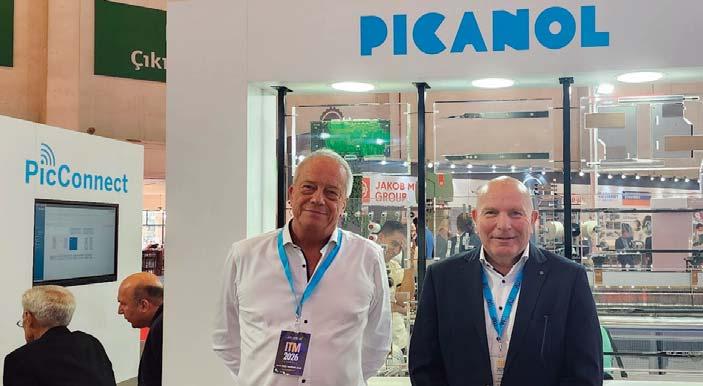

weavers, who will not only benefit from the lower energy consumption of a rapier machine but also from the versatility to weave a wider fabric range – which in turn increases their chances of diversification,” he said. In addition, pointing out that the importance of sustainable weaving and further digitalization is gaining growing importance in Türkiye, he noted: “Not to mention the fact that the Ultimax really is the answer to all their weaving needs. We are also seeing a growing interest from our customers in terms of supporting tools to further optimize their weaving sheds. The use of digital tools will help them to become more sustainable and more efficient and our PicConnect digital platform responds seamlessly to these demands!”
He disclosed that they also presented an OmniPlus-i Connect airjet weaving machine with SmartShed, weaving double-face and that the visitors could experience the speed increase that Picanol recently launched on their airjet platform. “Furthermore, we highlighted all the benefits and latest features of PicConnect to leverage the full extent of the possibilities offered by Picanol weaving machines. Integrated machine manuals and tutorial videos, a central weaving styles management system, and enhanced machine stop insights are just a few of the new PicConnect features that
we recently released,”
He underlined that all innovations they displayed are driven by their four design principles: Smart Performance, Sustainability Inside, Driven by Data, and Intuitive Control and said these design principles enable the customers to follow their weaving instincts and get the best possible results on all Picanol platforms.
Kurt Lamkowski commented on the market outlook, saying that they still feel some hesitation and uncertainty in the market. He stated that the period of inflation is still present and the high interest rates are also limiting the appetite for investments and disclosed: “But we learned that many weaving mills are facing problems finding skilled workers. Also, under the current circumstances, it becomes more important to work in the most efficient way. This opens a lot of opportunities for companies investing in more sustainable machinery, helping them to reduce waste, energy and increase productivity. To conclude, tools to support our customers to manage their weaving mills better have become more important. We really feel a change in the mindset of many customers when making investment decisions. And we are looking forward to helping our customers to grow further in the future.”
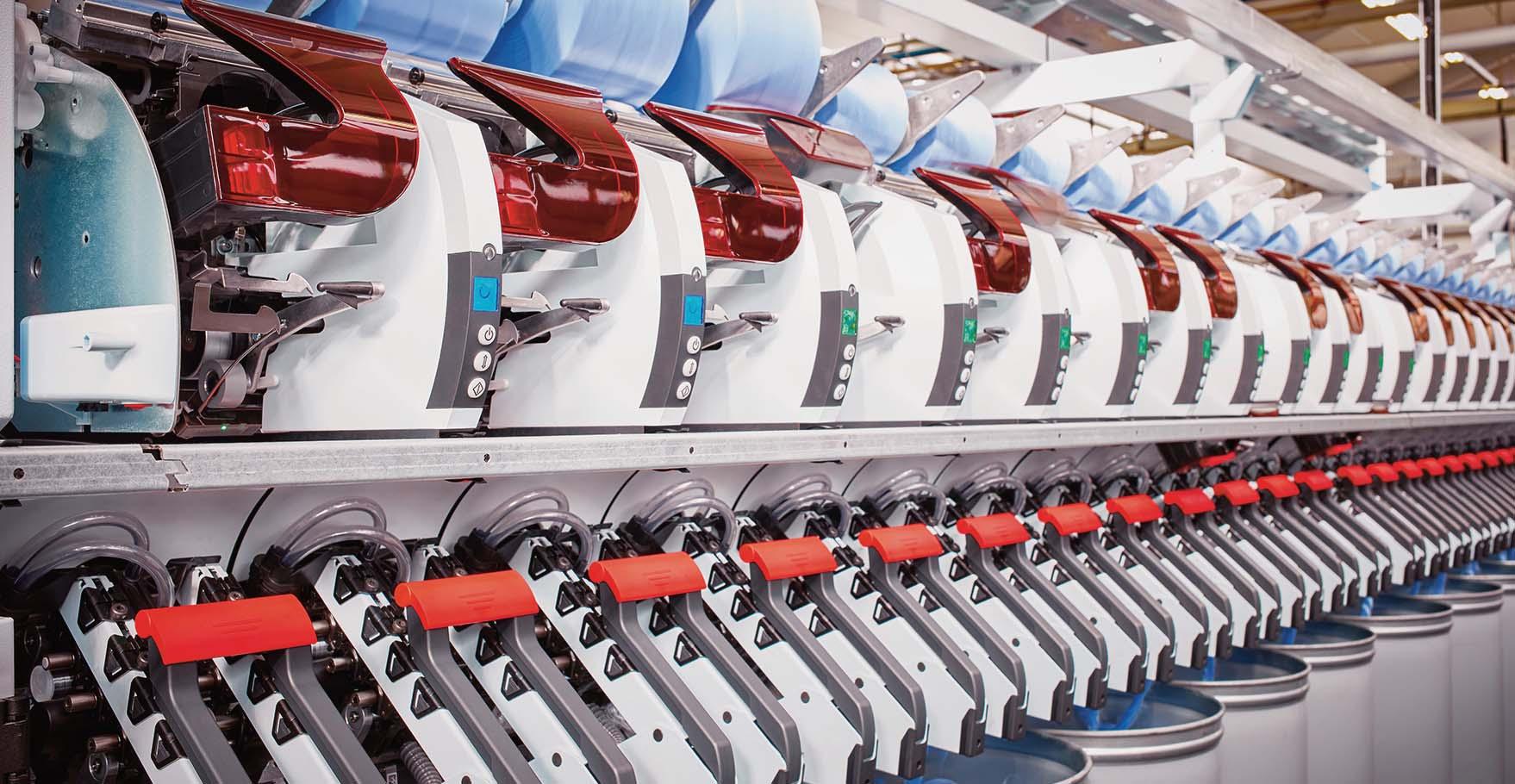

Modern technology offers increasing possibilities for spinning and twisting yarns. Today's fashion starts with the yarn: fancy, core, duo-core, or compact yarns define the fabric's characteristics. When recycled or dope-dyed fibres are processed, the colour is predefined. Saurer's spinning and twisting machines' flexibility and versatility enable competitiveness in the changing textile world and allow the production of any yarn required by the fashion or interior industry.
Saurer showcased energy-saving and flexible solutions for pre-spinning, spinning, and twisting. Saurer is the sole supplier with all five end spinning applications, offering air, rotor, ring, compact, and worsted ring spinning. Saurer twisting machines can twist almost any yarn, from fine wool to carpet and technical to glass fibre yarns.
Saurer introduced the new Autoairo 11 to produce commodity yarns at competitive costs, running at 500 m/min at the booth. A big focus was on the recycling with the energy-saving BD 8 on the booth and the Autocoro 11 with recycling Xtreme Edition. The new star in ring-spinning is the Zinser 51, which was showcased in operation on the booth. It was a great opportunity to find out how Saurer's Autocard use digitalised settings to improve sliver quality and be inspired by the capabilities of the CarpetCabler / CarpetTwister 1.12 that was exhibited at the booth.
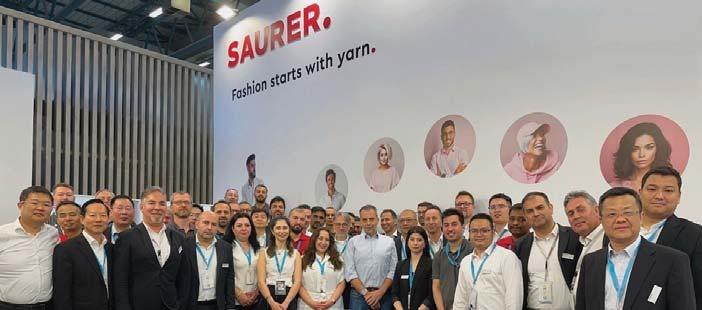
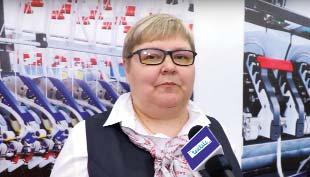
Many fashion trends were inspired by the yarns available on the market. Saurer was proud to shape fashion and interior trends with its yarn innovations. Besides energy saving, Saurer’s engineers also focus on technology - constantly inventing new ways to spin yarns and enhance yarn quality.
Here are some of the market trends and what Saurer has to offer:
Yarns for fabrics with high washing stability, low pilling, and durability: Belairo yarns from the new Autoairo 11 air spinning machine are ideal for polo shirts, towel piles, or fine knit fabrics.
Yarns from recycled raw material and waste: The fully automatic Autocoro 11 rotor spinning machine in the Recycling Xtreme edition and the Synchropiecing 60 help process extremely short fibers with high productivity. The semi-automatic BD 8 rotor spinning machine ensures costeffective production of recycled yarns, especially for waste spinning. OE yarns with a free blending ratio of two slivers: This new yarn innovation appeals to customers seeking to create unique color or material blends.
Fancy yarns for pattern effects in fabric: The Fancynation software enables fabric simulation and digital transfer of yarn effects to the machine. Fancynation is available for Saurer’s complete ring- and rotorspinning portfolio.
Elastic core or duo-core yarns: These core yarns spun on Saurer machines ensure the perfect fit for skin-tight clothes, jeans, or sofa covers.
High-quality compact yarns with lower hairiness and higher strength: Spin compact yarns for the finest

shirting fabrics with the self-cleaning compact device Impact FX pro. Sophisticated high-quality carpet yarns: Twisted on CarpetCablers and CarpetTwisters for decades, these yarns are used in high-end carpets and other textiles. The versatile machines master even the most unusual market requirements reliably and confidently.
Saurer’s Autoairo 11 air-spinning machine offers the flexibility to process different fibres, even simultaneously, thanks to Multilot: cotton, polyester, viscose as well as new chemically regenerated fibres. The Autoairo sets new benchmarks for producing high-quality air spun yarns named Belairo. These yarns have high pilling resistance and are very durable. The spinning process itself also sets new standards. Compared to combed ring spun yarn, the production of Belairo yarns uses less energy, less manpower, fewer machines, and less production space, which means lower building and air conditioning costs.
Zinser 51 – Saurer’s new ring-spinning machine generation
Saurer presented the Zinser 51 ring spinning machine series for the first time in Türkiye. The Zinser 51 series set new standards for economical spinning. The new suction system, combined with proven energy-saving features, reduces energy consumption. The new NSD-i drafting system monitors all drives to ensure consistent yarn quality values over the entire machine length and speeds up lot changes. The robust intermediate drive Flexidriver NFD ensures consistent yarn quality on extra-long machines. High-end components such as the Texparts Eshape spindle and Spinnfinity, ideal for high-speed spinning, enable top speeds of up to 30,000 rpm. To produce high-quality compact yarns, the new Zinser 51 can be equipped with the reliable compact units Impact FX and Impact FX pro.
Saurer machines and energy saving, the new Autocoro 11 and BD 8 rotor spinning machines save up to 10% energy compared to the previous model and the ring and compact spinning
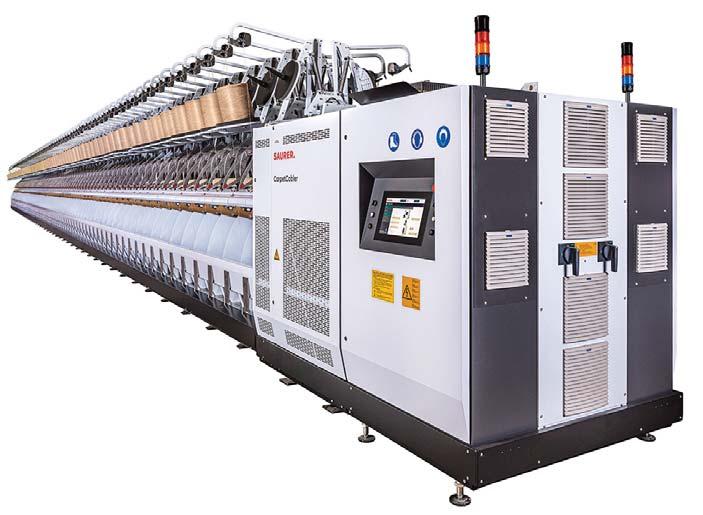
machines are equipped with many energy saving features. In twisting energy saving spindles, optimised bearings, and drive motors contribute to high energy savings.
Saurer is one of the pioneers of automation
Automation is leading to enhanced process control, improved quality, and increased productivity. Automation solutions are increasing the mill’s independence from a scarce resource: manpower. There is no such thing as a one-size-fits-all automation solution, but rather one that is customised to existing mill structures and customer needs. This is why Saurer has a complete engineering department to adapt the automation solutions to the specific needs of spinning mills.
To reduce the energy consumption of existing spinning machines Saurer offers retrofit and upgrade solutions. For specific yarns, e.g. for processing recycled fibre, there are also retrofit kits available. To extend the life of existing Saurer machines and implement new features the Saurer service experts provide advises to customers on possible retrofit solutions.
The latest Texparts product innovations on booth 719 A in hall 7: For ring-, compact- and rotor-spinning Saurer
offers a lot of high-quality components: such as high-quality drafting arms, longlasting rings and travellers and energy-saving Eshape spindles, which can save up to 6% energy.
A look back at Saurer's history shows how important the Turkish market has always been. Dr. Tai Mac, Director Product Management Open-End, reflects: “In 2011, the very first Autocoro with individual drives was shown at a customer day in Kahramanmaras, Türkiye. Since then, the Autocoro has been on the road to success. Today, more than 280,000 Autocoro spinning units are producing rotor spun yarn in Turkey. Due to the many years of experience with this technology, it is no wonder that the very first Autocoro 11 installation with 768 spinning positions per machine at Biska Tekstil in Türkiye has performed well from the very first moment.”
Richard Klein, Regional Sales Director Twisting Solutions, notes: "A recent trend in Turkish carpet production is to use POY, DTY and FDY yarns instead of just BCF yarns. Our CarpetCabler/CarpetTwister 1.12 offers maximum flexibility and is able to process all these yarn types with increased productivity. This is made possible by the fully electronic headstock with inverter drives for the spindle, take-up and traverse motion. In addition, the 1.12 series offers an energy-saving spindle range and central computer-controlled balloon adjustment.”
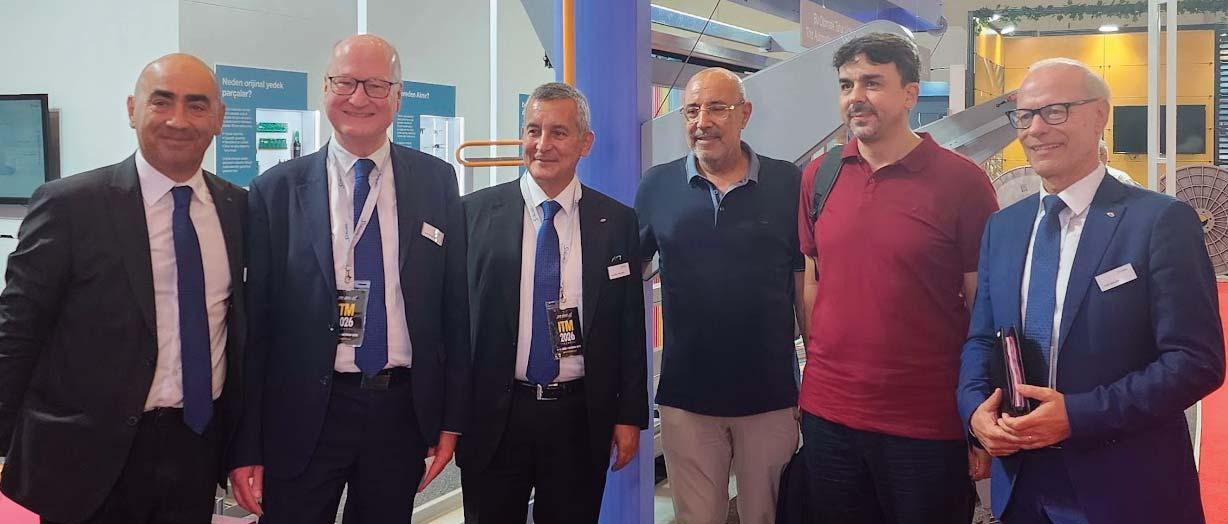

The well-known weaving technology developer Stäubli drew attention with its innovative weaving solutions at the ITM 2024. The company, leaving behind the exhibition with effective discussions and demonstrations, also announced, on the very first day, SAFIR PRO S67 has been sold to LUTUF MENSUCAT A.Ş, at its booth with the participation of the company’s representative.
Stäubli Textile Marketing Officer Fritz Legler said that they are very pleased with the interest from Turkish weavers and noted: “Our advanced automatic drawing-in machine SAFIR PRO S67 captivated the attention of Turkish weavers throughout the exhibition. LUTUF MENSUCAT, a leading customer in Türkiye invested in this machine that offers increased efficiency, flexibility, and productivity, allowing for more complex beams with features like colour and yarn control. It is a star in the Turkish market, offering user-friendliness and adaptability.”
LUTUF MENSUCAT explained that they will use SAFIR PRO S67 to improve their weaving process:
“Currently with our 248 weaving machines, our daily production output
averages 50,000 m. In order to meet the various market demands, we always invest the first-tier, high-performance, high-speed machinery. Our investment in the Stäubli SAFIR PRO S67 will pave the way for a smoother and more efficient weaving process, leading to high-quality fabric production and quick adaptation to market needs.”
The sector discovered the possibilities in weaving at the Stäubli booth
Stäubli also unveiled its new highperformance dobby, the S3280, designed to operate at industrial speeds exceeding 1000 bpm. “This will enable our customers to fully utilize the mechanical speed potential of weaving machines, thereby increasing productivity. The S3280 represents Stäubli’s commitment to pushing the boundaries of textile machinery performance,” Fritz Legler explained.
Addressing the industry’s growing focus on sustainability, Legler highlighted the SX-Pro and the Pro series of Stäubli’s jacquard machines. These innovations, along with the MX PRO modules, can reduce energy consumption by up to 30%. “This helps our customers reduce costs and optimize their production

environment, contributing to a greener, more sustainable industry,”
Legler, answering the questions about visitor turnout, noted a slight decline compared to three years ago, particularly from outside Türkiye. “We had many more visitors from Iran, Uzbekistan, Central Asia, Pakistan, and Bangladesh during the last exhibition. However, we are satisfied with the quality of visitors,” he explained and highlighted the presence of key Turkish customers and a reasonable number of visitors from Egypt.
“Our success lies in our longevity and proximity to our customers”
Despite the challenging global economic environment, Fritz Legler expressed optimism about the Turkish market. “Our Turkish customers are very flexible and creative. They will find solutions to cope with the current difficulties,” he remarked.
Acknowledging the impact of inflation, high interest rates, and logistical issues, he advised patience, predicting that it might take well into next year for the market to stabilize.
Responding to the question of what is the key to the success of Stäubli in the Turkish market, Legler attributed their success to longevity and customer proximity. “Our success lies in our longevity, spanning 130 years, and proximity to our customers. We have our own company here, not just in Istanbul, but also in key textile centres like Gaziantep, Bursa, and Denizli. We listen to our customers, understand their needs, and develop solutions accordingly,” he affirmed.

ITM 2024 resulted in successful discussions and orders for German textile machinery manufacturer Trützschler Group. Dr. Bettina Temath, Head of Global Marketing at the Trützschler Group, expressed her satisfaction with the exhibition by saying; “We believe ITM is a great platform to present the latest developments and to meet new and existing customers. We are very satisfied with the number of visitors and partners we welcomed to our booth this year.” Trützschler’s booth attracted a diverse array of visitors from multiple regions. “We enjoyed opportunities to connect with customers from many different countries this year. The main share of visitors came from Türkiye, but we also welcomed customers from abroad such as Uzbekistan, Bangladesh, Egypt, Indonesia, Iran and Pakistan.” Temath noted and added that they were delighted with the generous orders they received from Turkish customers during the exhibition.
ITM once again showed that recycling is a megatrend
Trützschler showcased several cutting-edge technologies at ITM 2024. Bettina Temath reported on the demonstrations at the Trützschler booth: “Trützschler Spinning highlighted its next-generation card TC 30i, which achieves top quality from any raw material thanks to its enlarged cylinder diameter and higher number of active flats. We also presented our 12-head high-performance comber, the TCO 21XL. It increases productivity by 50 % without sacrificing quality, while also using 25 % less space. Further, we introduced our new integrated draw frame IDF 3 and our latest recycling innovation, TRUECYCLED. We are now offering a complete solution for the processing of post-industrial and postconsumer textiles.” Temath disclosed that ITM once again showed that recycling is a megatrend, especially the manufacturing of products from
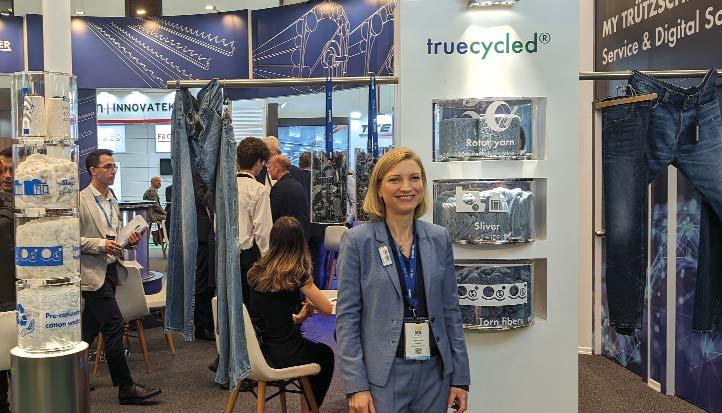
regenerated fibers and said there was a lot of interest in TRUECYCLED. She added that they also shared insights into My Trützschler, the digital hub for training and service.
Trützschler Card Clothing (TCC) presented a wide range of technologies from its clothing portfolio, which covers the complete spectrum of applications in the spinning and nonwoven markets. One of the highlighted solutions was SUPERTIP. Temath explained the points that differentiate this technology: “SUPERTIP wires are more resistant against wear. That gives them a 30 % longer service life than standard wires on the market. As a result, customers need fewer service interruptions for maintaining the card clothing. That means the machines can achieve better productivity, with lower costs and higher profitability. In fact, SUPERTIP requires 25 % less maintenance time and cuts costs by around 16 %.”
Trützschler Nonwovens spotlighted its latest innovation:
T-SUPREMA, a needle-punching line concept that is dedicated to achieving high product quality and system efficiency within the field of premium needle-punched nonwovens. “TSUPREMA serves as the fundamental component for applications like geotextiles, automotive textiles, filter media and various other industrial uses.

The team also provided insights into its high-quality and sustainable nonwoven solutions, with a particular focus on flushable wipes, as well as high-quality baby and body wipes from pulp-based carded/pulp and wet-laid/spunlace lines,”
We remain optimistic about the future, especially considering Türkiye’s significant role
Despite current market challenges, Trützschler remains optimistic about the future, especially in Türkiye. Bettina Temath shared her views on the market outlook: “The market is rather quiet at the moment and is in a wait-and-see mode. We noticed this when talking to representatives from the spinning sector and throughout the entire textile value chain. While the market is not very lively right now, we have seen how experts in the textile industry have successfully navigated and improved business situations in the past – particularly in Türkiye. We remain optimistic about the future, especially considering Türkiye’s significant role and its proximity to Europe. Turkish customers value high quality, raw material utilization, energy efficiency and increasing automation. These considerations have guided our approach to innovation and we are convinced that state-of-the-art textile machinery from Trützschler gives our customers a big competitive advantage.

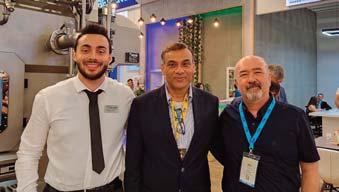
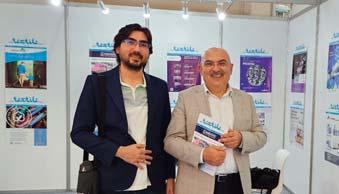
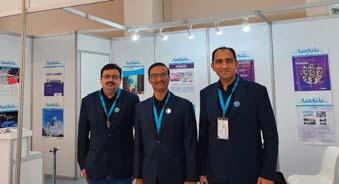
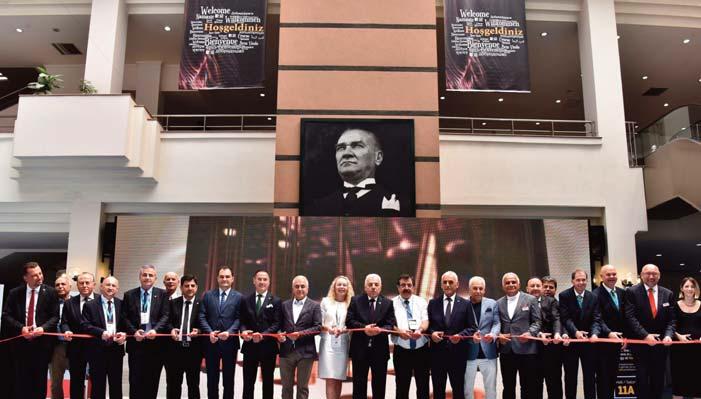
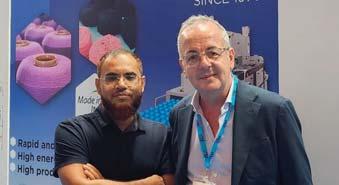


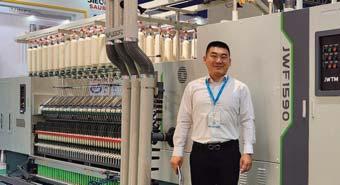
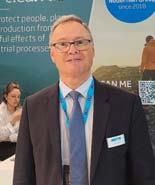

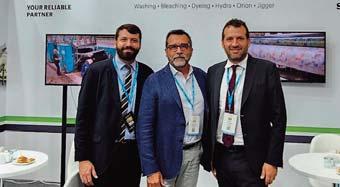
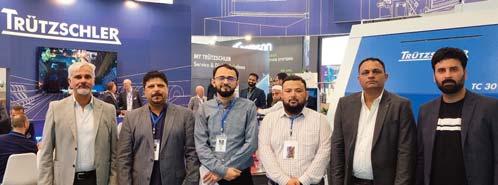


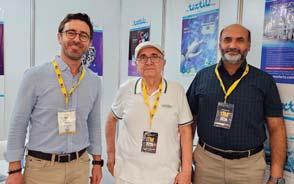

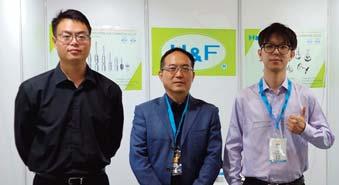
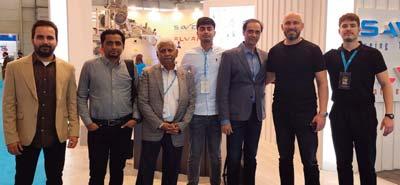
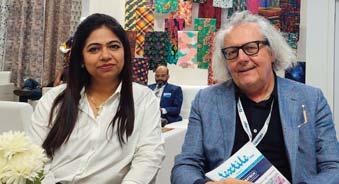
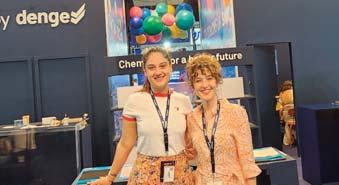
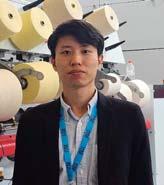

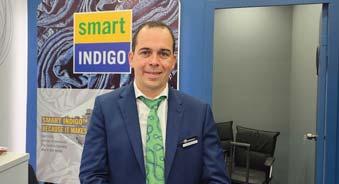
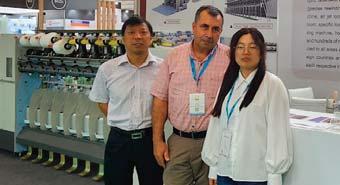


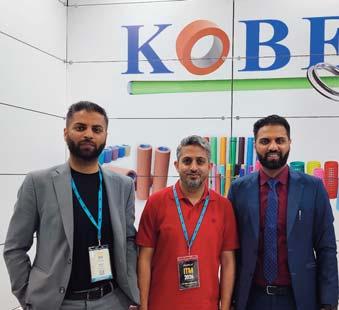
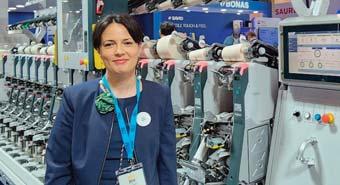
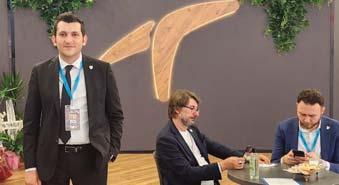
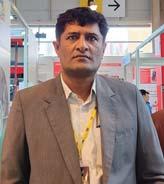
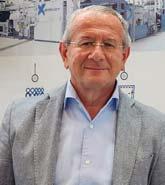
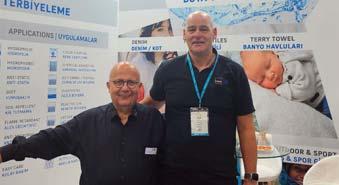
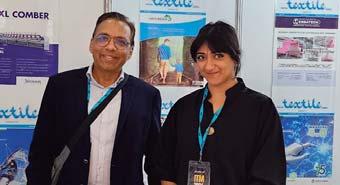



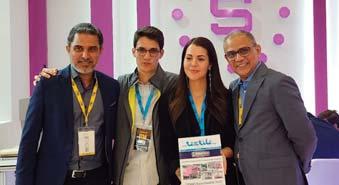
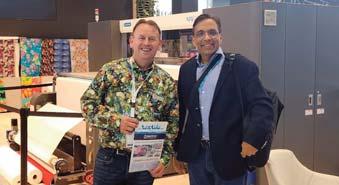
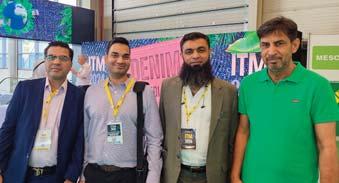
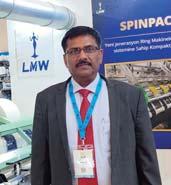

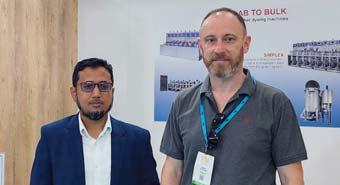
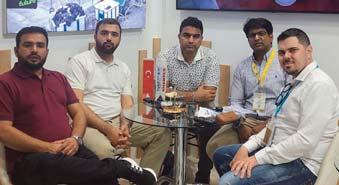
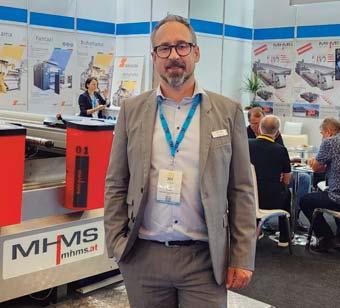

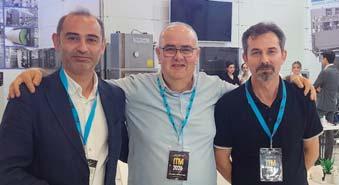
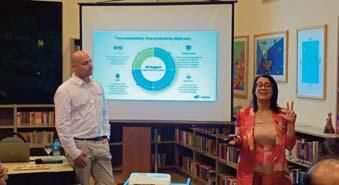
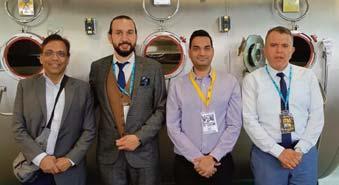
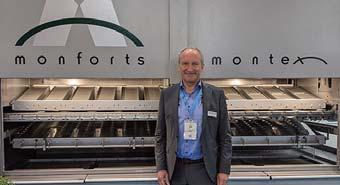
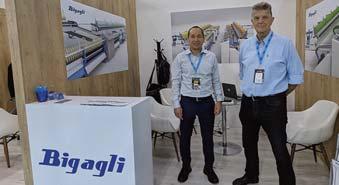
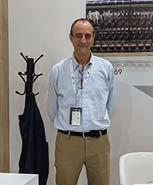
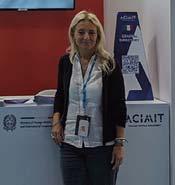
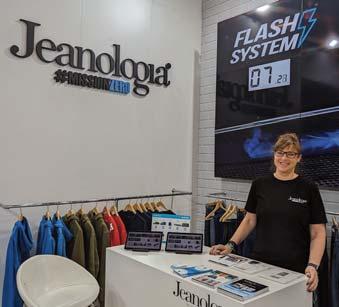
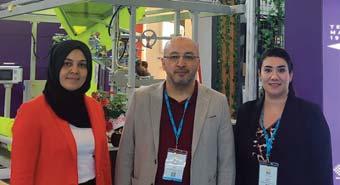
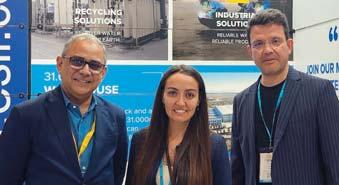
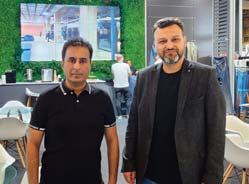
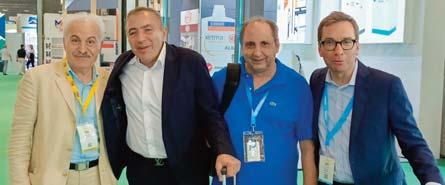
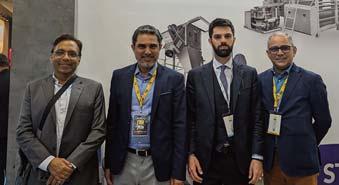
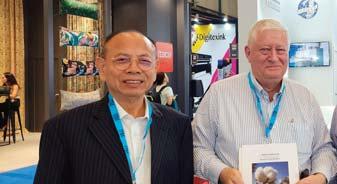
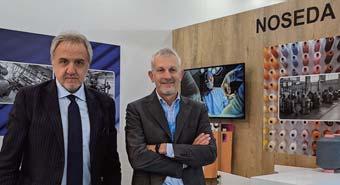
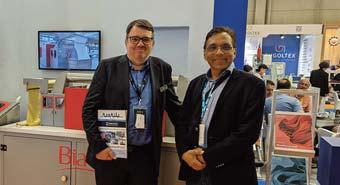
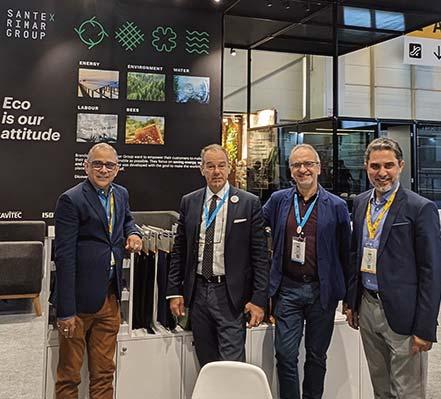
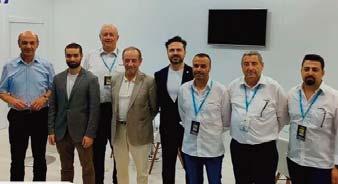
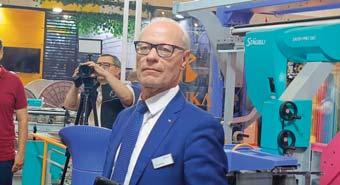

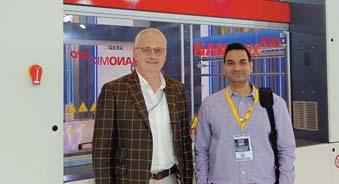
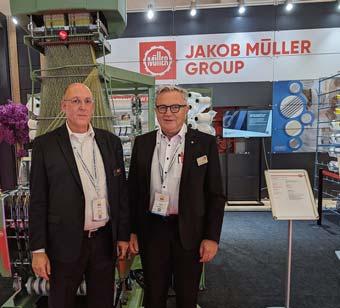

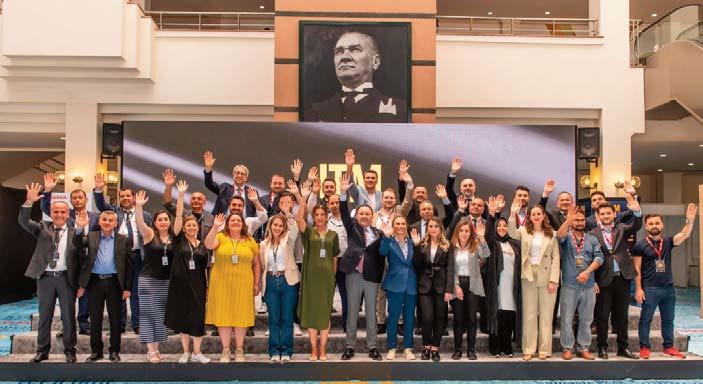

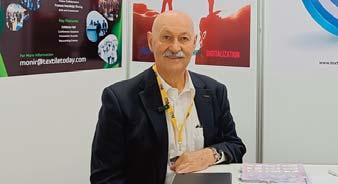


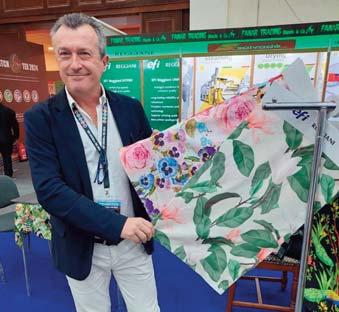

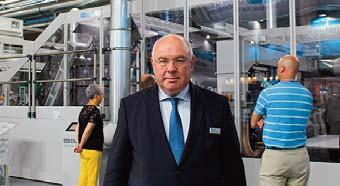
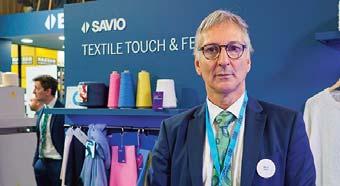
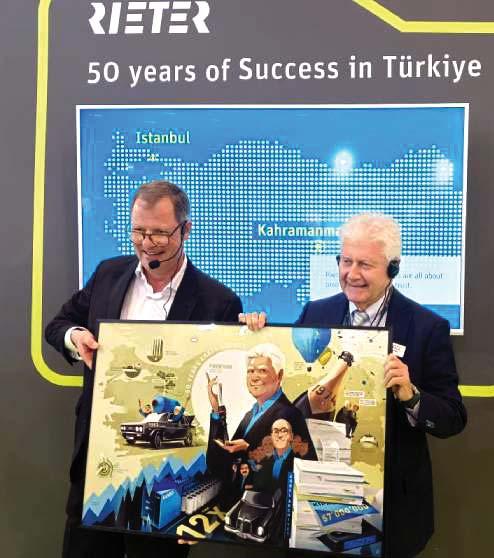

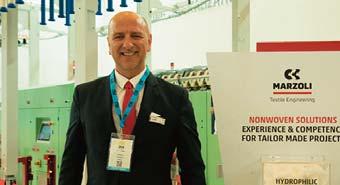

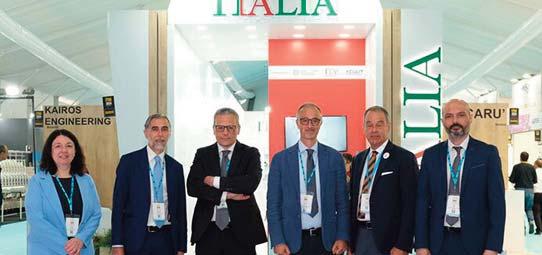
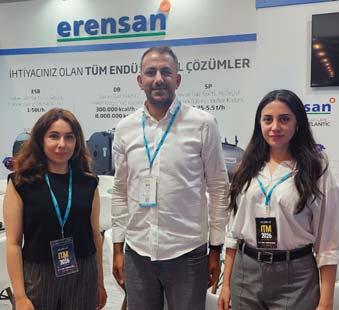
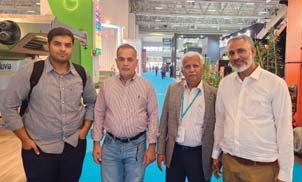

Archroma Pakistan Ltd...................................................IFC
Chhipasons.................................................................64
HVACR Trends 2024 ..................................................29
ITMA ASIA + CITME, Singapore 2025........................19
ITMA ASIA + CITME, 2024..........................................6
IGATEX Pakistan 2025...............................................IBC
Rastgar.................................................................25&64
Rieter ..........................................................................1
Saurer
Sedo
Swissmem..................................................................11
Truetzschler ...............................................................BC
Zhejiang Rifa...............................................................FC




